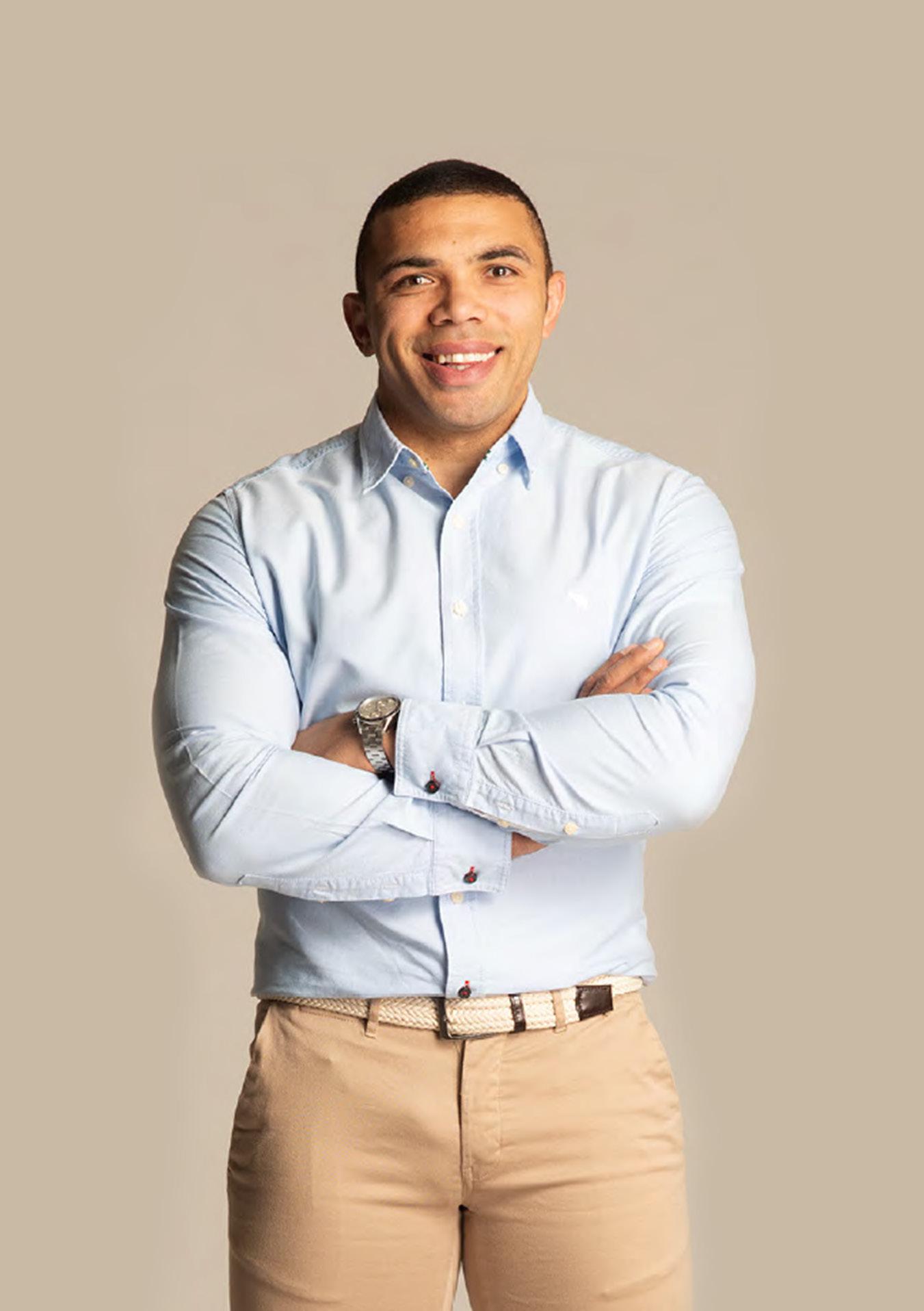

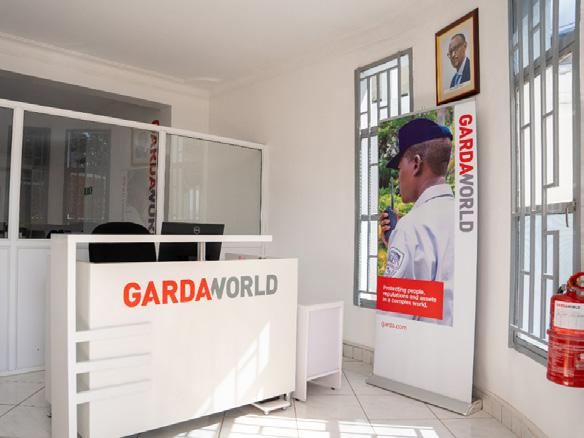

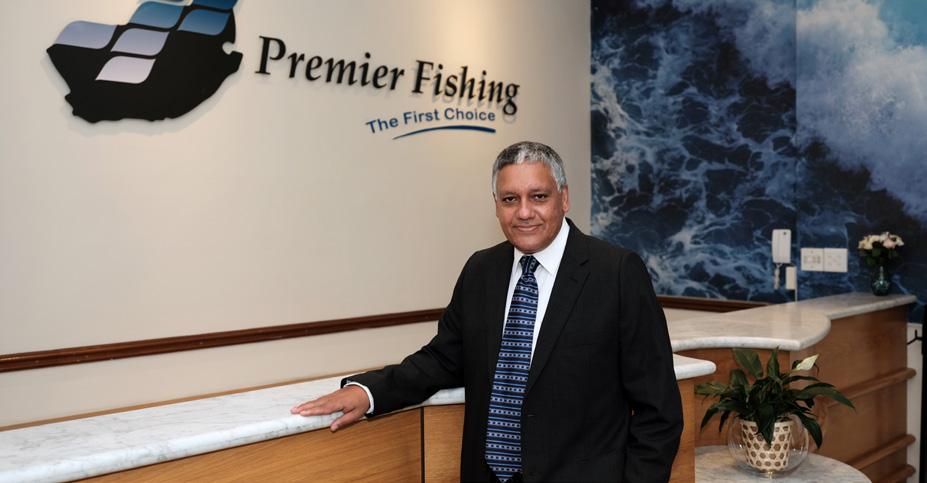

GardaWorld Africa / Titan Cargo / Premier Fishing / King Shaka Airport www.enterprise-africa.net June 2023 Exclusive interview with Paymenow Chief Client Officer, Bryan Habana Financial Peace of Mind for Everyone, Everywhere ALSO IN THIS ISSUE:
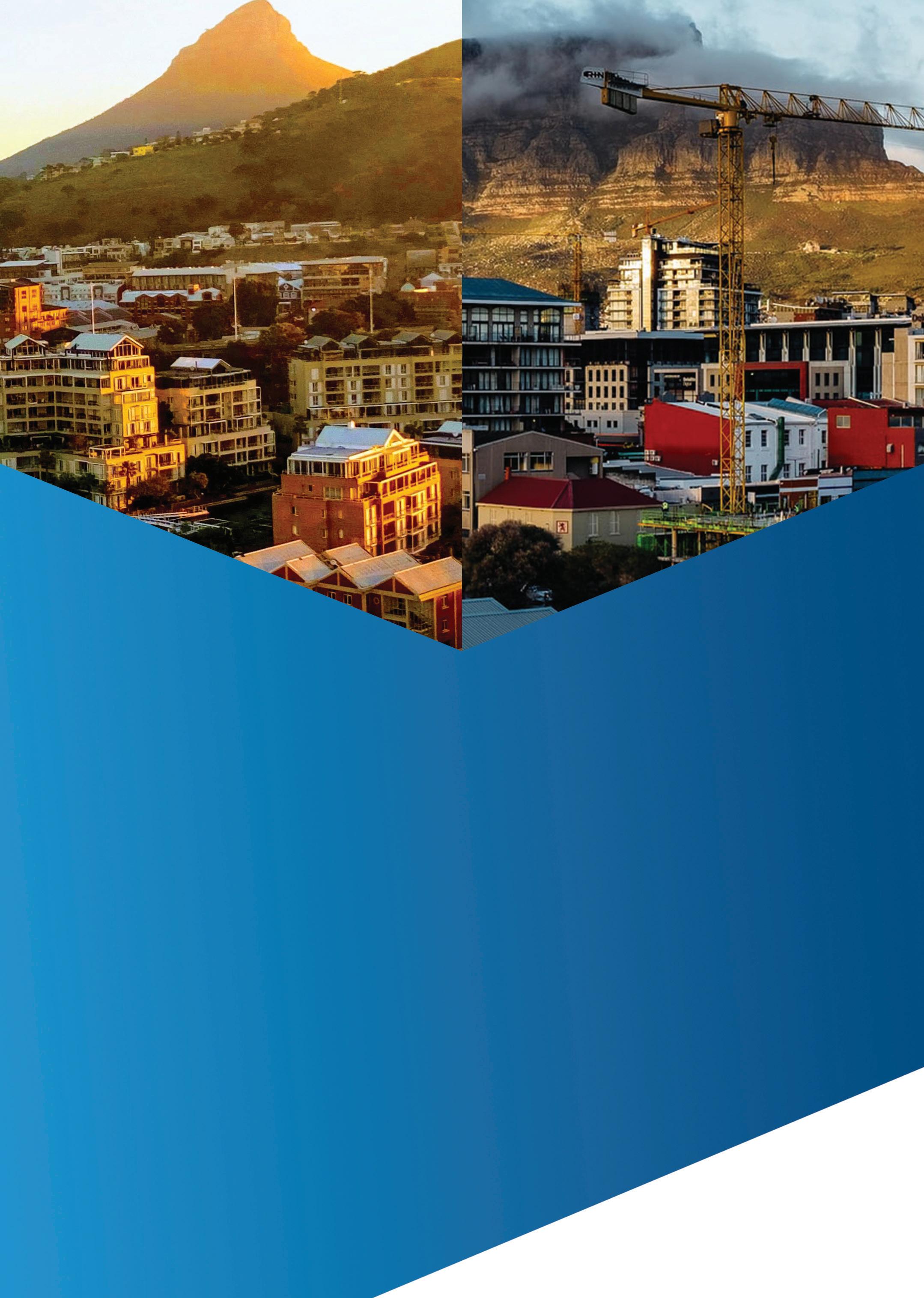
EDITOR Joe Forshaw
joe@enterprise-africa.net
SENIOR PROJECT MANAGER Sam Hendricks
sam@enterprise-africa.net
SENIOR PROJECT MANAGER James Davey

jamesd@enterprise-africa.net
PROJECT MANAGER Ekwa Bikaka
ekwa@enterprise-africa.net
PROJECT MANAGER Terry Hanley
terry@enterprise-africa.net
PROJECT MANAGER Eleanor Sarbutt-King
eleanor@enterprise-africa.net
PROJECT MANAGER Jamie Waters
jamie@enterprise-africa.net
PROJECT MANAGER Kim Berrystone
kim@enterprise-africa.net
LEAD DESIGNER Aaron Protheroe
aaron@enterprise-africa.net
FINANCE MANAGER Isabel Murphy
isabel@enterprise-africa.net
CONTRIBUTOR Manelesi Dumasi
CONTRIBUTOR Timothy Reeder
CONTRIBUTOR Benjamin Southwold
CONTRIBUTOR William Denstone
In one of our busiest months ever, we have heard a range of exciting stories from across diverse industry sectors. The ending in each is that strong businesses decimated by Covid-19 lockdowns have established new strategies to regain, rebuild, and repair.
With the economy in sub-Saharan Africa shrinking by 3.3% in 2020, the challenge has been too much for some. Thousands of companies closed their doors in South Africa alone, and those that survived have needed strict revival strategies.

So far, those strategies have yielded greens shoots and many are becoming more ambitious, finding opportunities in the crisis.
At Airports Company South Africa – a company hard hit by total market collapse – a turnaround strategy is taking off. Investing in connections between national and regional airports, and ensuring air travel drives economic prosperity, is high on the agenda for the SOC. Numbers are picking up and, in Durban, there are good things happening as international airlines are attracted to sunny KZN once again.
For Xenia Pharmaceutical, a leading manufacturer of pet and animal health products, the boom in pet ownership that occurred during lockdown has allowed for substantial growth with the company now eyeing continental expansion as a recognised, world-class facility.
Nomad Africa Tours & Safaris, another heavily blighted by the tourism slowdown, is starting to prepare for an uptick in business after its highly reputable and ethical brand name helped it to ride out the Covid storm and capture the early resurgence of the industry.
In Stellenbosch, at the Paymenow HQ, Bryan Habana – CCO at the young fintech business – explains that the Covid pandemic impacted people’s ability to access liquidity, and the dangerous payday loan industry thrived. Now, his company is giving people their dignity back with a streamlined, secure, reliable, and professional financial wellness offering.
Going forward, the Covid story will continue to shape business strategy, and there will be more casualties, but those who seek new opportunities will no doubt avoid negativity.
Published by
Chris Bolderstone – General Manager
E. chris@cmb-multimedia.co.uk
Fuel Studios, Kiln House, Pottergate, Norwich NR2 1DX +44 (0) 1603 855 161 www.cmb-media.co.uk
CMB Media Group does not accept responsibility for omissions or errors. The points of view expressed in articles by attributing writers and/or in advertisements included in this magazine do not necessarily represent those of the publisher. Whilst every effort is made to ensure the accuracy of the information contained within this magazine, no legal responsibility will be accepted by the publishers for loss arising from use of information published. All rights reserved. No part of this publication may be reproduced or stored in a retrievable system or transmitted in any form or by any means without the prior written consent of the publisher.
© CMB Media Group Ltd 2022
Get in touch and tell us what your company has been doing differently to make things work in the new environment. We’re on LinkedIn
EDITOR’S LETTER www.enterprise-africa.net / 3 Joe Forshaw EDITOR GET IN TOUCH +44 (0) 1603 855 161 joe@enterprise-africa.net www.enterprise-africa.net

4 / www.enterprise-africa.net 6 14 24 32 44 50 56 CONTENTS 14 PAYMENOW Financial Peace of Mind for Everyone, Everywhere GARDAWORLD AFRICA Resilience in the Face of Complexity GardaWorld in Africa TENGWA AFRICA Connected in Every Direction TITAN CARGO Faster, Better, Cost Effective Supply Chain Solutions PREMIER FISHING SOUTH AFRICA Consolidating Strength While Hunting for Growth
SHIPPING Perfect Partner in Port Louis KING SHAKA AIRPORT (ACSA) Connecting People, Places, Dreams & Opportunities
IBL
64 70 76 82 90
BIDTRAVEL Traveller Confidence and Demand Continue to Skyrocket
NOMAD AFRICA TOURS & SAFARIS
Nomad Team Keeps the Dream Alive for Real African Tourism
PRECIOUS METALS TSWANE
Shining PMT Celebrates Five Years of Success

MCWADE PRODUCTIONS Sparking a Local Manufacturing Revolution
XENIA PHARMACEUTICAL Trustworthy, Superior Quality, Affordable - Fuelling a Healthy Future in Africa
www.enterprise-africa.net / 5
32
Financial Peace of Mind for Everyone, Everywhere
Rugby World Cup-winning South African winger Bryan Habana put his reputation on the line when he co-founded financial wellness company Paymenow in 2019. A technology offering that allows for earned wage access for Southern African and African employees, Paymenow is quickly becoming recognised as an innovative fintech business solving real problems. Habana takes Enterprise Africa through the challenges and opportunities for this exciting, agile venture.
 PRODUCTION: Eleanor Sarbutt-King
PRODUCTION: Eleanor Sarbutt-King
6 / www.enterprise-africa.net
PAYMENOW

www.enterprise-africa.net / 7
//Speaking to Paymenow
Chief Client Officer, Bryan Habana about the successful fintech he has built with his team over the past three and a half years, there is a reminder that when you’re passionate about something, you don’t have to remember lines.

He knows about being publicly scrutinised, he has experienced media attention, he has been forced to speak publicly – not always about easy topics.
But when he talks on Paymenow, he doesn’t read a script, he doesn’t use distractive marketing jargon – he lights up with enthusiasm and gets quickly to the point.
“We are trying to make people’s lives better, and the way our technology does that is great.”
A former Springbok, Habana is a habitual winner who knows about great victories. But in just over three years at the Stellenbosch HQ of Paymenow, he has arguably achieved more than he did in 15 years as SA’s rugby poster boy.
Paymenow is a financial wellness provision, allowing employees of
onboarded organisations to gain access to a portion of their already-earned wages in advance of pay day for a small fee. In South Africa, a monthly salary cycle does simply not fit with so many employees who have to live daily. Emergencies happen, and difficulties can compound. Disrupting responsibly and digitally to help end reliance on payday loans and financial stress, the company provides surety, fairness, and dignity.
“We are grateful to have some phenomenal Paymenow colleagues and we have yet to see someone leave the business – that is exceptional. The way we have organically grown and the way we have built in a startup environment has been extremely positive,” says Habana, someone who knows about teamwork, demonstrated by the 2007 Rugby World Cup winners medal on his mantlepiece.
TRANSITION
In 2019, Habana’s former university roommate and good friend, Deon Nobrega (Paymenow CEO), approached him with a new concept for a financial
health product after realising a need from employees that was not often met by employers. Nobrega had worked in financial services and fintech and had a good network of minds ready to assist. Habana was in transition, finishing rugby and considering what would come next. Flushed with offers, it had to be positive and had to fit in line with his own personal values and ambitions.
“The transition period for professional athletes is a very difficult one. You die a small death because everything you have known for 15 years is no longer. Your salary stops. You have to ask for leave. You have people reporting to you,” he says.
“I was in a limbo environment, doing a lot of ambassadorial and punditry work. I was in Japan for the 2019 World Cup, I was working for, HSBC, MasterCard and Land Rover. I had co-founded a digital sports marketing agency called Retroactive which was still very much a part time thing. When Deon approached me, it was the first time in my transition period that I saw an opportunity to get a ‘real’ job. As a cofounder of an organisation, not only do you have to have a financial contribution, you also have to bring a physical, office-bound contribution.”
But it wasn’t an easy process. In fact, Habana was highly sceptical of the concept. Well known as a predatory, harmful industry, micro and payday lending comes with a very negative stigma. His reputation on the rugby field and his goals as an entrepreneur could not be dragged down by a poor choice. But, earned wage access, he was about to learn, is all but a poor choice and is not in the same category as microlending.
“As soon as potential clients hear of people getting access to money they’ve already earned, they immediately think it’s a rolling credit facility, and people are already overburdened,” he explains.
Nobrega was clear – this is a financial wellness offering. The goal was improving financial inclusivity and understanding – educating those who need it, and helping to build on
8 / www.enterprise-africa.net
INDUSTRY FOCUS: FINANCE
Bryan Habana, CCO
sound financial habits, without the risk. The idea developed between Nobrega, Habana, and co-founders Willem van Zyl and Gerbrand Potgieter was about creating a platform that was first and foremost responsible but also allowed for growth as a startup.
This, according to Habana, is what sets the company apart.
TRANSPARENT
After developing a basic strategy, Paymenow headed to the UK to learn. The team built an understanding of the mechanics behind the scenes, and created a budget for technology creation and market approach. A key takeaway was that most software was built for first-world markets and nothing existing would suit South Africa’s unique developing market environment.
“We started looking at how we could use it as a gamified, reward-type offering within a financial wellness environment - that gave us a massive differentiator in the market. We built a minimum viable product (MVP)which I quickly learned does not stand for Most Valuable Player - based on the Discovery Vitality model around physical health but looking at financial health and education. We incorporated all of that into a financial wellness platform that is earned wage access.”
The app-based system ties into HR and accounting at employer level and takes a large burden away from those departments. It speeds up the process for the employee who, typically, when asking for earned wage access is not in a position to wait. The Paymenow product also removes emotional subjectivity as well as cumbersome manual effort from the process and reinforces responsibility across the entire activity.
Proof of good work comes in the form of highly positive feedback from global impact measurement organisation 60 Decibels as well as being included in a global Financial Inclusion organisation’s (The Catalyst Fund) accelerator program in 2020 - the only earned wage access player globally to be associated with an NGO of this calibre.
60 Decibels found that almost all users had never had access to an offering like Paymenow before, and almost all could not find a better alternative. Encouragingly, almost all reported that the system improved quality of life.
“The feedback we get from employees is remarkable,” says Habana. “60 Decibels has taken us through two research cycles already, with a third to come in August. We achieved a Net Promoter score of 74, one of the highest they have ever received. Results highlight information around how this eases people’s ability to access liquidity, how they are getting their dignity back, and how it is improving their overall financial situation, and that is something which we are very proud of. It allows the employer to see the benefit of the wellness offering that they are bringing to the employee in its totality. We play an impactful role in that holistic approach.
“As a financial wellness offering, Paymenow cannot be seen as a standalone silver bullet. It has to be seen as part of a holistic financial wellness offering that is delivered by employers. It is a tool that gives people dignity back.”

‘THANK YOU’
Beyond research report scorecards and surveys, real interactions have confirmed that Habana’s choice to enter the market was the right one. He says that the journey has been fraught with challenges, but these pale into insignificance when clients detail their experience with Paymenow.
“We were on a client visit in Pretoria,” he describes. “We were at a local restaurant for a prospective client meeting and I went to the public bathroom. There was a guy cleaning the toilets and he was contracted by a company who had rolled out Paymenow. I saw his badge; I asked him about the company and if he had heard of Paymenow. His facial expression changed and the first words that he said were ‘thank you’. I was a little confused. He said: ‘thank you for giving me my dignity’. Without Paymenow, he had no option. It had positively changed his life. I thought about this incredible impact, and I thought about a lot of things I have achieved from a sporting perspective but being able to see how what we do pays dividends to the end user was absolutely incredible.”
This is just one human example of innovation disrupting an environment that has been crying out for an alternative. By making the app data free, charging zero fees on value-added in app voucher purchases for necessity items, increasing financial literacy, enabling users to save money, improve their credit scores and receive financial and mental counselling at no extra charge, the end user of Paymenow is always at the forefront of thinking.
“Everywhere you go, you see people with companies that engage with Paymenow and there is a resounding positive response, and that is fantastic,” Habana smiles.
“JP Morgan did a case study with
PAYMENOW www.enterprise-africa.net / 9
some of our anonymous data last year, taking a very agnostic, unbiased rating from a credit score perspective and used that as a comparison against people without access to earned wage access. We saw a remarkable improvement in people’s credit score against those without that access.”
He adds that clients have conducted interviews with potential employees who actively ask about the potential for earned wage access, alongside other financial wellness prospects. Here, Paymenow is helping clients to attract and retain dedicated personnel.

“It creates a positive environment where employees feel they are being empowered by employers, and that is incredible. One of the major considerations in the case studies we have done is that financial aspect – if employees are sitting at work but worrying about their financial struggles, that compounds and impacts their ability to do their work.”
Employers that genuinely care and want to make a difference in the lives of employees must understand the multi culture environments in which employees operate – not always easy.
“The biggest thing for us was the market education,” admits Habana. “When you talk to executives, they look through the lens with a different mindset. We always say that if you, as an employer, have never got on a train, taxi or bus, or if you don’t have
to worry about needing airtime thanks to your monthly cell phone contract –how can you understand employees who do? That changes a lot of minds.”
Because of the proven benefits of Paymenow, and the company’s sterling reputation, competitors are busy planning entry to South Africa’s earned wage access industry. For Paymenow, the focus is only on what can be controlled.
“We have 250,000 employees with access to the platform and we have signed up some big blue-chip organisations,” highlights Habana, adding that earned wage access is here to stay with big companies seeing it as a big benefit.
“We have been working with the Foschini Group for two years. They are an incredible organisation with employees at the centre of their decision-making processes. Boxer Group, Cotton On, WNS, and more have joined the platform, typically those that are very employee-centric and want to add value to the end user.”
MACROECONOMIC AWARE
Partnering with like-minded organisations has been tough for Paymenow. Even with Habana’s celebrity-pull, the business environment in South Africa remains difficult. The ongoing energy crisis combined with a plummeting Rand v Dollar, and general uncertainty about what will go wrong next makes for a tough
climate in which to predict growth.
Aware of the challenge, Paymenow has designed each step in the customer journey with problematic conditions in mind.
“You cannot go into any form of business without looking at the macro-economic environment. For us, a lot of the decisions have been based around the end user, whether from a poverty tax perspective or financial exclusion,” says Habana.
This, he says, is why financial wellness, supported by all the benefits and features offered by Paymenowsuch as being data free - is at the core of the entire offering. Currently, the country is expected to miss most growth targets and expand by just 1.1% in 2023, down from 1.7% in 2022. Unemployment stats remain unacceptably high (33%) and this contributes to cash-based financial instability that Paymenow hopes to address in the long-term.
“When we started, we looked at people in the blue-collar work environment and found that they typically buy R3.70 worth of airtime and data every three days. We didn’t want that to be a barrier to entry so we made the app data free – a cost that we carry. We included value-added services from various providers where we give people the ability to access airtime, data, electricity, food, pre-paid medical vouchers and more with zero fees. We don’t want those that get taxed the most to be burdened the most, and that gives a good story for the employer. We have added an employee assistance programme wellness (EAP) support line. We are not a financial wellness specialist and so being able to further offer that from a holistic wellness perspective around financial, mental, debt structuring through access to a dedicated WhatsApp line is very useful, and almost better than a private banker. Now, access to money comes with support and help through the click of a button,” details Habana.
As part of the Paymenow offering, Continues on page 12
10 / www.enterprise-africa.net
INDUSTRY FOCUS: FINANCE
Deposit and save money straight from the app into an interest-bearing Allan Gray money market fund.
Paymenow is not a loan, we offer safe and secure access to money you’ve already earned, with no interest or repayments required.
Financial Health Check feature helps users understand their financial situation and offer tips on how to improve it.
in-app financial education modules offer tips on how to manage you money better to boost your financial wellness.

Bank grade security means your money is safe, and will only be paid into the bank account as per payroll. VOU
You don’t need any data to access or use Paymenow.
You can buy grocery, airtime, clothing, electricity, and medical vouchers free of fees*, or send these to loved ones.
Learn more: www.paymenow.app

PAYMENOW DATA FREE
EARNED W AGE ACCESS
FREE TO EM PLOYER
IN -APP SAVINGS FEATURE OFFERS FINANCIAL PEACE OF M IND
There is no cost to the employer to partner with Paymenow.
INCREASE FINANCIAL LITERACY THROUGH IN -APP FINANCIAL EDUCATION M ODULES
FREE CREDIT SCORE TO IM PROVE FINANCIAL HEALTH
ENABLES RESPONSIBLE, SAFE AND SEC URE ACCESS
Our
Our
CHERS FREE OF FEES
*W hen you are on GOLD STATUS
INDUSTRY FOCUS: FINANCE
Continued from page 10
there is also access to an Allan Gray interest-bearing money market savings account which is not something most employees would benefit from without Paymenow. “We have made decisions based on macro-economic structure and micro-economic details where we can aptly ensure we deliver a platform that allows people to be financially educated and included,” Habana furthers.
Again, the results speak for themselves. Data shows that financial responsibility is quickly improved when working within the parameters of an earned wage access system that is centred around financial wellness.
“We can share lot of data,” explains Habana, of the initial pitch with nervous employers who may have moved these initiatives down the priority list during tough times. “We have completed four million transactions on the platform and we can explain that even when people are given access to 25% of the already earned wages, they are only using 12% because they know it is
their own money and that it is salary deductive – they quickly become responsible. Compared to a payday loan, there is no ducking and diving.”
SUSTAINABLE GROWTH
After starting out in business just before the pandemic and its ensuant disasters, Paymenow has always been focused on growth in tough times. The company launched with its first client just a week before lockdowns came into place. Now, with more than three years and a quickly growing number of transactions under its belt, the team behind Paymenow is looking forward with optimism.
“We started out as four guys in a small office,” remembers Habana. “We are now 30 people with 15 more as part of the network. We are processing more than 350,000 transactions per month compared to March 2020 where we processed 81. In October 2020, we celebrated wildly when we processed 100 transactions in a day.”
Since inception, the company has moved into new geographies including Namibia, Zambia, Lesotho,
and eSwatini. This expansion has come from three factors that others cannot replicate: amazing relationships with clients, scalable technology, and strong backing from shareholders.

“I was wet behind the ears” smiles Habana, “and our CEO put in a lot of the foundations to make sure we were legally compliant and technologically compliant. Building scalable tech was important, but building tech with the appropriate compliance was even more important as we readied for corporate South Africa.”
A trait he has had to learn has been the requirement for constant pivoting. With earned wage access available in some form in almost all countries around the world, the company has had to be nimble in its approach to ensure sustainability. “You must stay ahead of the curve and understand where growth is happening,” he states. “The scalability of our tech and the proven data in other jurisdictions has made us the leader of the pack and that is something we are incredibly proud of.”
Despite challenges in South Africa, industry-leading status has opened new doors for the company, and Habana and team are certain that there remains major prospects. He highlights the issue of lacking public transport as a major driver of growth. Without an efficient bus or train system in most metros, many still rely on taxis to commute. This requires cash up front. “We believe that the South African market will take our focus for some time, but given the fact that there are common currency zones, there are big opportunities.
12 / www.enterprise-africa.net
// WE ARE PROCESSING MORE THAN 350,000 TRANSACTIONS PER MONTH COMPARED TO MARCH 2020 WHERE WE PROCESSED 81 //
There are big and quickly growing economies in Africa where we have learnings, and others where we have some multinational clients with a base,” he says of sub-Saharan Africa which has better prospects than South Africa alone, expecting GDP growth of 4.2% after 2024 for the rest of the decade.
“We have to look at the size of the formally employed market – that dictates how big an opportunity is. We have to understand how we can fund it, and we have to make sure we can scale,” he says of growth in new nations.
APPETITE FOR WINNING
As the company scales and hits the radar of more employers, banks, and other financial institutions, there is a clear strategy and goal in place which will help Paymenow to be single-minded in its drive.
“We are only concerned about growth and continuing to improve our product offering while being sustainable,” affirms Habana.
“We have an audacious goal of one million people having access
to Paymenow in three to five years. However, you cannot put yourself at massive risk - you have to be strategic and you have to have the right network to enter the market.”
Alongside its shareholder, using its growing reputation, and with Habana passionately leading from the front, this financial wellness offering will continue on its mission of restoring people’s dignity and building sustainable financial inclusion in Africa.
“In corporate, there is a lot of opportunity for winning. We always want to be a leader of the pack and my affection for wanting to be at the top remains,” he says. “Our service delivery is one of our USPs, and the manner in which we engage with employers and employees is exceptionally key for us. We remain positive, but conservative. Having a feel-good story discussion while focusing on bottom line profitability is important.”
Personally, Habana is excited about all that has been achieved so far, but he is clearly enthused about what is still to come. “I am still far from where I want to
be in my life five years after retiring from rugby. A pro athlete knows how to work hard, sacrifice, dedicate themselves, and communicate. On a rugby field, I was with 14 other CEOs – they were the best of the best. In business, you have to communicate in a totally different way.”

Evidently, he has been successful. Paymenow was the winner of the 2022 World Summit Award for Business and Commerce and is already making progress with its long-term vision of changing a vicious debt cycle into a savings mindset while turning employees into financially resilient citizens.
“It has been tough – we have made mistakes, the tech stuffs up, we have vigorous inhouse debates, but we wanted to get to bottom line gross profit and that is what we have all aimed for. Now we want to grow and scale appropriately,” he concludes.
Content sponsored by Paymenow
PAYMENOW www.enterprise-africa.net / 13
WWW.PAYMENOW.APP
Paymenow Founders
GARDAWORLD AFRICA
Resilience in the Face of Complexity GardaWorld in Africa
PRODUCTION: Eleanor Sarbutt-King
As opportunities for business success in Africa boom, threats are never far behind. GardaWorld is a leading provider of security and risk solutions, growing aggressively on the continent, and President and Chief Operating Officer, GardaWorld Security-International, excited about leading the way with quality and integrity at the front of mind. He talks to Enterprise Africa about how and where the company will grow in challenging market conditions.
The private security industry in Africa is booming alongside swelling international investment in what is often seen as one of the last true major growth geographies. Corporates, governments, and NGOs are flocking to the continent to join with its growing economic prosperity, embracing a young and available workforce, and seeking out
opportunities to bring tried and tested business ideas to new markets.
According to the United Nations Conference on Trade and Development (UNCTAD), FDI reached a record $83 billion in 2021. But the continent still represents a small percentage of total FDI with Europe and Asia as the main sources. As this money progresses prospects, international

operations seek quality international support. Establishing operations in Africa is not easy. Security and risk protection is often, rightly, top of the strategic agenda.
the largest private security industries in the world. It’s hard to grow a security company of scale here, but other big sub-Saharan markets
14 / www.enterprise-africa.net
//
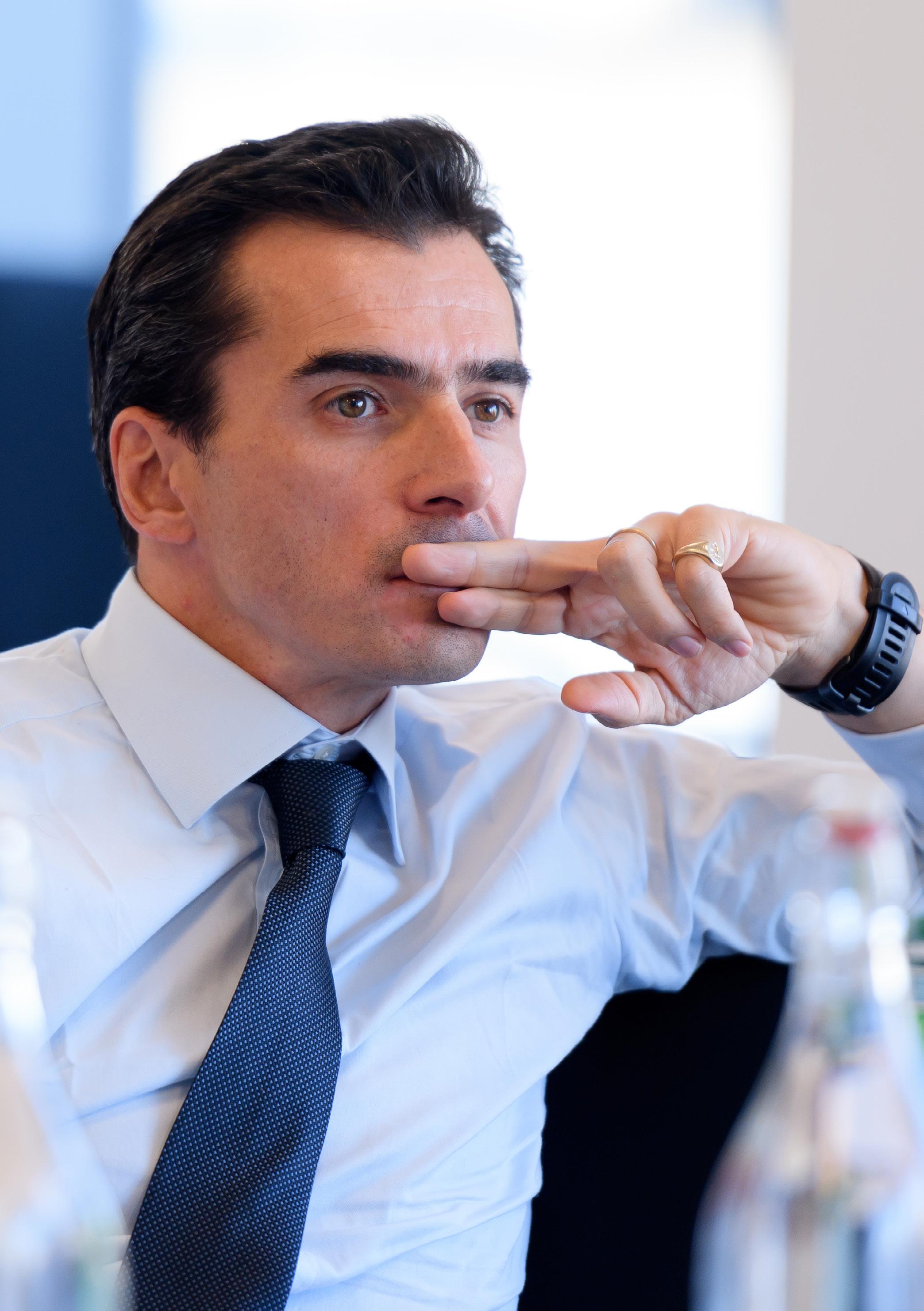 Oliver Westmacott , President and COO Security Services - Middle East and Africa
Oliver Westmacott , President and COO Security Services - Middle East and Africa
INDUSTRY FOCUS: SECURITY
He tells Enterprise Africa that transparency, accountability, and ethics are crucial in the security industry, and GardaWorld Africa is built on these principles. This has allowed the company to pick up major clients and establish an industry-leading position across a number of markets.
“Until we entered the African market, there was only one meaningful international player in security services provision. We made a strategic play to enter sub-Saharan Africa by acquiring KK Security in 2016. It was headquartered out of Nairobi and was operating in a number of countries in sub-Saharan Africa. With that, we took on around 40,000 people as the number one or two player in each of those markets, and that is what we have been building on,” he says.
“The big picture is about differentiating ourselves from the competition – we need to play to our strengths. Quality of service is definitely a part of that. Calibre of management, quality systems, accountability, culture in terms of operating a business to international standards is something very few businesses demonstrate in the African market. Being able to do that on an integrated, multi-geographic scale - while bringing ISO and wider best practice certification – requires a significant amount of commitment and work.”
remain attractive and competitive. For international players looking to support big-name clients and projects, there are chances for prosperity – if the fundamentals are in place.
In 2000, a collection of extractive companies created the Voluntary Principles on Security and Human Rights to assist companies in development of a clear and structure framework around ethical best practice. Since then, the KPI-based system has been reviewed, upgraded, updated, and refined and has become a global quality standard, with the encouragement of governments around
the world. Now recognised as the ISO 18788 certification, this framework can assist global security companies when growing business in new markets.
“It mandates a very high level of compliancy and provision of audited best practice standards,” says Oliver Westmacott, President and Chief Operating Officer, GardaWorld Security-International. “That is what we have been at the forefront of and, across all of our business, we certify to these standards. For me, bringing this necessary function to scale, at a global level – particularly in emerging markets – is essential.”
Globally, GardaWorld is headquartered from Montreal, and provides integrated security offerings to organisations all over the world, recognised for its delivery superiority.
MAKING A DIFFERENCE
On the ground, GardaWorld Africa has a formidable presence. A large manned guarding operation is complemented by K9 units, journey management, facilities management, command centres with dedicated response teams, and a comprehensive technology portfolio provide real risk mitigation.
Recently, GardaWorld staff in the diplomatic quarter of Dar es

16 / www.enterprise-africa.net
Salaam identified and neutralised a threat from a rogue gunman without major incident. Working alongside local police, the team apprehended the individual before damage was done. The area was nervous following a fatal shooting in 2021.
“There are many examples of our team diffusing high-pressure situations and deescalating tense environments where there has been a real likelihood of people attacking key infrastructure or putting clients at risk. We are also regularly intercepting robberies,” says Westmacott.
Clients include UN Agencies, more than 120 international embassies across Africa, substantial agriculture players, oil and gas and energy giants as well as their value chain partners, mining organisations, governments, and more.

East Africa is where GardaWorld has grown from. Whilst Kenya and Tanzania are exciting markets, Nigeria, Mozambique, and the DRC are all seeing significant growth, along with several other geographies where the company commands a strong position. For Westmacott - an industry veteran with more than two decades in security across a multitude of developing markets – the way the business can make a difference and realise its true potential is through genuine and
authentic value-adding activity.
“It’s about refining our offering,” he says. “We don’t want to have an ego around how many people we have – we shouldn’t care. We should be talking about our convictions and the quality of service we deliver, and the profitability of the business. Ultimately, we can be a better business by broadening our service provision and focusing on a more holistic risk management approach to clients. The race to the bottom, competing only
GARDAWORLD AFRICA www.enterprise-africa.net / 17
// THE RACE TO THE BOTTOM, AND COMPETING ONLY ON PRICE, IS A VERY DANGEROUS WAY TO BUILD A BUSINESS – YOU’RE NOT CREATING VALUE FOR CLIENTS BY DOING THAT //
on price, is a very dangerous way to build a business – you’re not creating long term value for either clients or shareholders by doing that.”

An industry trend when hunting for efficiency and profitability is increasing technology rollout and focusing on the labour component providing better operational value to clients.
“Technology is essential, but not so much just cameras on your gates –which is increasingly commoditised. We need to be driving integration
of technology in a sophisticated way and the crux of that is to have a deep engagement with clients to understand what their broader risk requirements are,” he explains. “Whether you are producing tea or pulling cobalt out of the ground, those operations have risks. Some of it is protection of a gate or warehouse, but it is also monitoring manpower, ghost workers, payroll, theft from production lines, systems being manipulated – that is internal organisation risk that, typically, operators have not put into the remit
of a traditional guarding company. It is often put into an internal security or risk department and that is a big opportunity for us. We are acutely conscious of bringing technology when it adds value to people’s lives rather than using technology for technology’s sake.” This is where rivals and local players fall short. A portfolio that is simply geared for physical guarding or reselling of imported electronics is a hardware or personnel partner and not an entrenched extension of client business. GardaWorld seeks to participate in the daily operations of clients, providing solutions that ultimately improve profitability and offset cost. To gain deep and true understanding, the company invests in talent and innovative process engineering while joining everything together with a culture of quality. With
18 / www.enterprise-africa.net
INDUSTRY FOCUS: SECURITY
// PRICE EROSION IS A HUGE CHALLENGE IN AFRICA AND YOU HAVE TO HAVE THE CONVICTION IN YOUR OFFERING TO SAY ‘THIS COSTS MORE AND HERE’S WHY’ //
operations across 45 countries around the world nurturing and maintaining a common business culture is key to delivering universal quality standards.
“We come in with a very operational mindset and utilise senior leaders in the business who have worked client-side and understand mines and manufacturing, and understand the risks and how that erodes profitability,” details Westmacott.
“We see ourselves as offering something quite different to the rest of the market. We certainly see our culture as a differentiator. Others often operate similarly to a franchise–very localised and decentralised. We are much more cohesive and structurally we have a tight leadership team that has direct oversight of all of the operations in Africa.”

MARKET DYNAMICS
Growth is on the agenda for GardaWorld Africa. But protecting profitability and creating a solutions-based business will not be overlooked as the company ventures into new geographies fraught with risk. With a number of growth strategies on the table, the company can expand in different ways but strong relationships and scalepotential are common fundamentals.
“We are very committed to Africa and anyone who goes into Africa and believes that there won’t be a steep and extended learning curve is naïve,” states Westmacott, adding that confidence in the service provision, belief in its adherence to international quality standards, and robust financial returns are vital.
“There is a lot of business in Africa
that is not as profitable as it should be, it is management-intensive – with 10,000 people in Kenya, ensuring they are equipped properly and engaging correctly with clients is a massive task. You need scale but it is also about supervision ratios and processes. That is why we believe consolidating and delivering for a smaller base of strategic clients that we can bring more services to in a creative way is sensible. Working with a quality provider like GardaWorld comes with a price. Price erosion is a huge challenge in Africa and you have to have the conviction in your offering to say ‘this may cost a little more and here’s why…’.”
As the security lead for a major pipeline construction project on the continent to export oil overseas, GardaWorld was engaged by an
www.enterprise-africa.net / 19
GARDAWORLD AFRICA
INDUSTRY FOCUS: SECURITY
international energy business who required a suite of services, all of which could be delivered locally while meeting global benchmarks.
“Clients speaking to us at the strategic level get access straight into Malawi, Kenya, Nigeria, and all of our other markets. From a multinational standpoint, a lot of clients want a single point of contact, with one team – a responsive organisation –that can help them to standardise delivery, best practice, and systems across different countries. That is where we see ourselves providing in a very deliberate way.
“At the same time, there are different market forces to contend with. There can be incredibly hostile dynamics in play across these different markets in terms of minimum wage increases on an almost annual basis, very high inflation and margin erosion, and much more. Keeping up with
that and continuing to be profitable, while growing, is a constant effort and we are aligned with the rest of the industry,” Westmacott admits.
Longer-term, the goal for GardaWorld Africa in terms of group contribution is for multi-million-dollar annual statements. M&A activity is slow, laborious, and challenging; organic growth takes years, and so the team must remain patient. Optimism comes from the predicted lengthy economic growth in the region, which the World Bank expects to grow from 3.1% in 2023 to above 4% in 2024 with continued increase through the rest of the decade.

APPEALING AFRICA
Current global economic conditions have naturally slowed growth in some sub-Saharan markets as investors wait for clarity on inflation and solutions around the conflict in Ukraine. But previous and expected performance
in these inherently growing markets remains attractive. Kenya, Cote d’Ivoire, and the DRC grew at 5.2%, 6.7%, and 8.6% in 2022. The IMF has also agreed funding arrangements for 21 SSA countries, with further requests being considered.
“Africa appeals to us as it has a number of fundamentally attractive characteristics. There is underlying economic growth, a huge workforce, ever-increasing levels of education, a number of developing economies – all of that lends itself to expanding market opportunity,” highlights Westmacott. “We are a very aggressive business that wants to grow around the world, but previously Africa was a blank spot, so it made sense for us to commit to building a sizeable business here.”
The immediate challenge being addressed across all markets where GardaWorld is active (Kenya, Tanzania, Uganda, Rwanda, Burundi, Malawi,
20 / www.enterprise-africa.net
Zambia, Mozambique, the DRC, Nigeria, and consultancy operations in other African countries) is bringing together a solutions mindset, reducing risk, and demonstrating a direct economic benefit by improving productivity and profitability. This requires innovation and brand enhancement.
“Across most of Africa, quality of life continues to improve in terms of electrification, running water, telecoms, and more. Nairobi is one of the most developed places in Africa and the challenge as a private sector employer is that there is a sense around multinationals having infinitely deep pockets and it is incredibly difficult to dispel that and try to change the culture to get people to feel a sense of ownership, correlating health of the business and their own longterm success,” says Westmacott.
Various CSR campaigns and a number of community-based
educational initiatives have helped build brand-Garda. Often in partnership with clients, these initiatives are not only a clear demonstration of the company’s commitment to the areas in which it operates, but also an example of deliberate action around upskilling and opportunity creation.
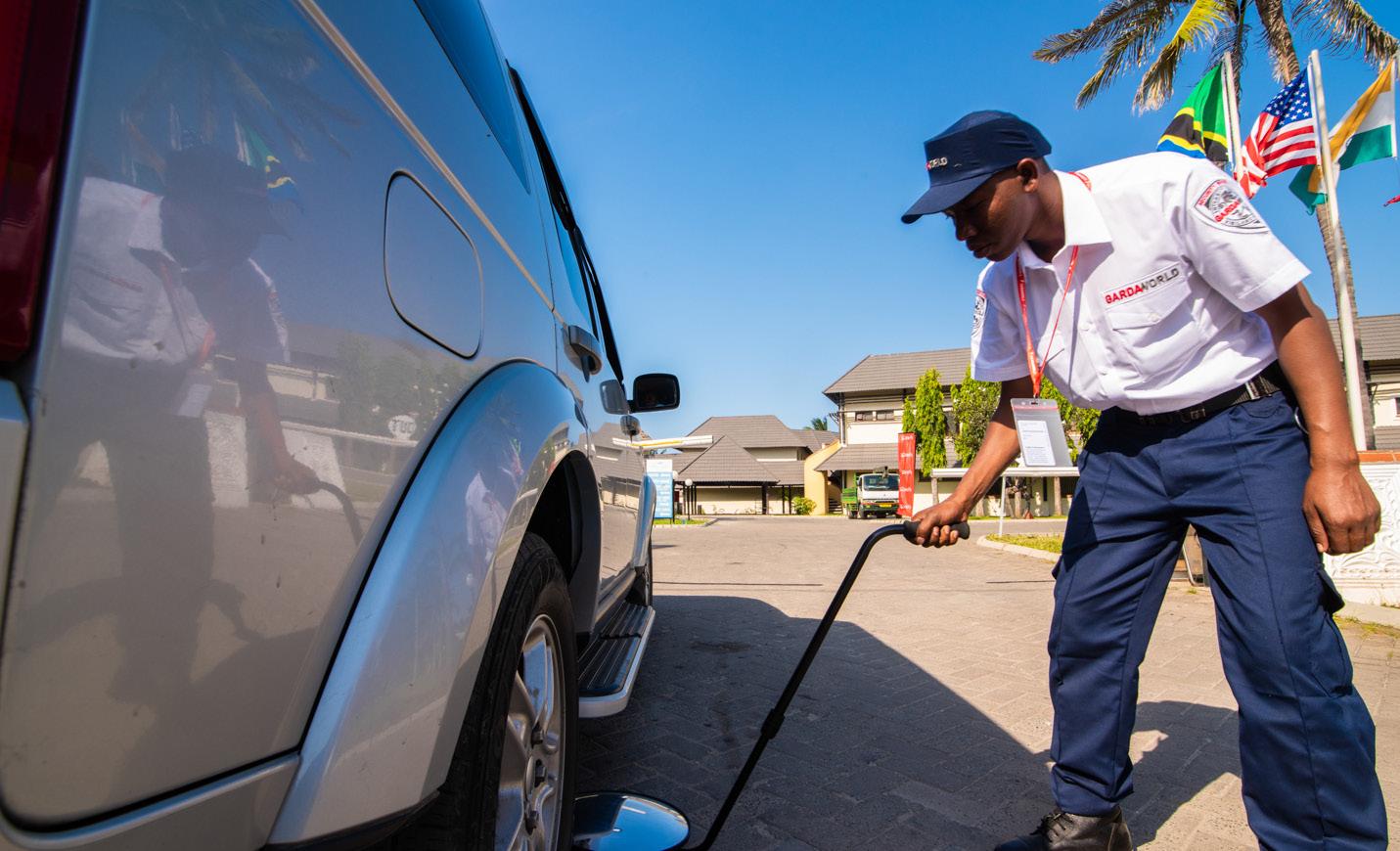
“We do a lot of stakeholder engagement and CSR. We are actively involved with our clients in Malawi, putting in boreholes and creating infrastructure. We want to make people feel that there is a lot of investment that goes both ways and ensure they know there is long-term commitment. In Uganda, we are busy putting a scholarship programme in secondary schools, trying to invest into communities and convey that long-term sense of commitment,” confirms Westmacott, adding that the company’s work is often a welcome source of employment in rural areas,
developing basic skills and giving people the experience of work in an international company. “We want to be a partner and I am committed to reputational development.”
As the company expands, this brand management will be key – clients must invest in trust, and that comes from expectations built by an impressive brand.
“I am very clear – our growth stems from building on our reputation,” Westmacott reiterates. “One of the biggest challenges in Africa is preserving the quality of service. You have hugely dispersed project delivery and big problems to solve.”
A MATTER OF TIME
A number of expansion strategies are being explored right now. GardaWorld is adamant it must build its presence in West Africa. Second, with major interest in the continent’s mining
GARDAWORLD AFRICA www.enterprise-africa.net / 21
INDUSTRY FOCUS: SECURITY

industry as the world shifts to battery technology and storage concepts, new and existing mines will require risk support, and GardaWorld is very active in this space. And actionable information is key – understanding operating environments pre-emptively, to be able to react in good time.
“West Africa is where we are
conspicuously absent and we should be more present in the main markets there,” admits Westmacott. “The challenge is that the individual markets are much smaller from a security standpoint. Côte d’Ivoire is probably the most attractive but it is still quite a small market and it is tough to build material scale. There is also the challenge of language and
culture, which is significant when getting people to work together.”
Nurturing the team culture –across 40,000 people in Africa and 132,000 people around the world – is an immensely challenging task, and growing organically in the area will take significant time. Westmacott is busy creating partnerships and foundations from which to grow.
“It is a matter of time,” he states. “You either go in and open an office, put a competent team in place, and wait until you have something that is worth talking about. Or, you can buy a company and take on the challenge of reformatting it. Or, you can go into certain projects with a consultancy capability and partner with a local company which makes you less about providing guards on a gate and more about value added service provision. We are doing quite a lot of that in West Africa, on mines and critical infrastructure.”

22 / www.enterprise-africa.net
According to Fitch subsidiary BMI, West Africa is set to become a mining powerhouse, with vast untapped mineral resources and a robust project pipeline. GardaWorld is proven in this space, deploying a multitude of solutions across various operations in SSA. “I’m a big believer in the mining sector and I think there is a big opportunity there. Critical infrastructure solutions – ports, pipelines, telecoms, data centres – there is significant opportunity for us in that area.”
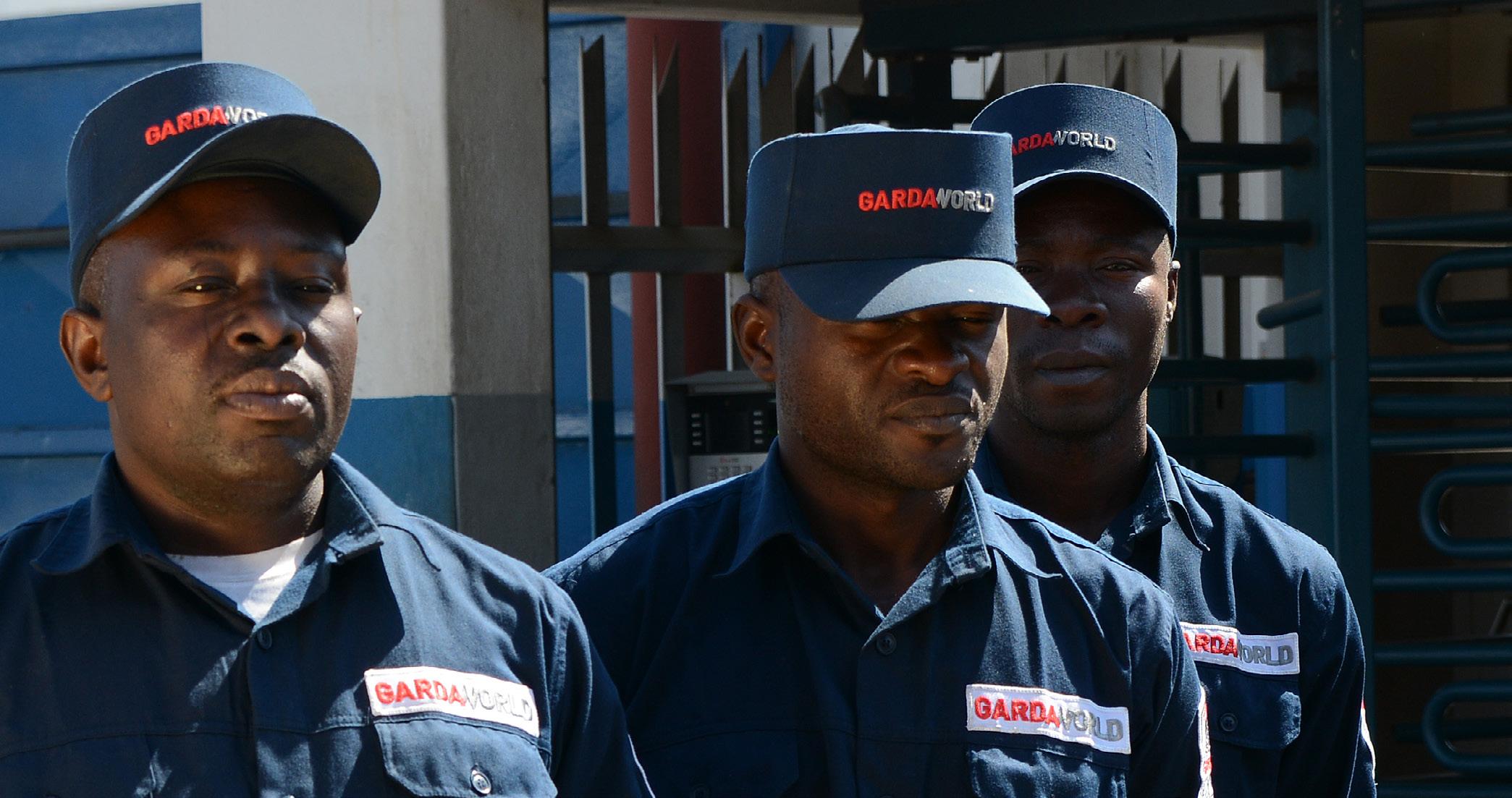
In the medium-term future, digital surveillance will become the gold standard for security firms genuine about industry leadership. SOCMINT can have a material impact on a company’s ability to deliver meaningful value, and this is where Westmacott sees big growth in a region characterised by fast technology adoption.
He says SOCMINT, especially when combined with growing AI capability, can provide real answers
to questions from clients around ‘what are you going to do about it’.
“Increasingly, a lot of this is open-source. Seeing what people are chatting about on social media platforms is so useful, it’s just a case of being able to find the relevant data, distil it, and make it useful. Marrying that with a response on the ground can make for a hugely impactful process.”
With these growth opportunities comes more progress and more success for GardaWorld, its people, its stakeholders, and the communities it calls home. For Westmacott, taking advantage of changing markets boils down to successfully building relationships - something he has been doing successfully for two decades.
“I am very optimistic. It is not easy – there are constant challenges. Fundamentally, I believe that there is a major outsourced opportunity in the markets we serve, and we have the conviction that quality will
prevail. Long-term, we are confident you must have a great team that can build relationships – security is about trust, and if you can do what you say then you are 90% there.”
Africa’s population will double by 2050. SSA population is growing by 2.7% annually, faster than south Asia and Latin America. Infrastructure, corporate expansion, global connectivity, business operations, and investment and funding will follow this growth, and that will result in a need for risk mitigation, protection, and advanced security services. Here, GardaWorld is leading thanks to comprehensive adoption of shared values - integrity, trust, vigilance, respect.
Content sponsored by GardaWorld Africa
GARDAWORLD AFRICA www.enterprise-africa.net / 23
AFRICA.GARDA.COM
Connected in Every Direction
Tengwa Africa moves millions of tonnes of cargo around the African continent. Reflecting on the past financial year, Tengwa Africa’s management is celebrating the positives against a challenging economic backdrop. New systems and processes, and a fresh strategy based on close collaboration, and increasing bidirectional flows, the company is helping deliver efficiency for clients. COO Rupert Schmidt and Commercial Manager Berndt Burger talk to Enterprise Africa about driving Tengwa forward.
 PRODUCTION: James Davey
PRODUCTION: James Davey
24 / www.enterprise-africa.net
TENGWA AFRICA

INDUSTRY FOCUS: LOGISTICS
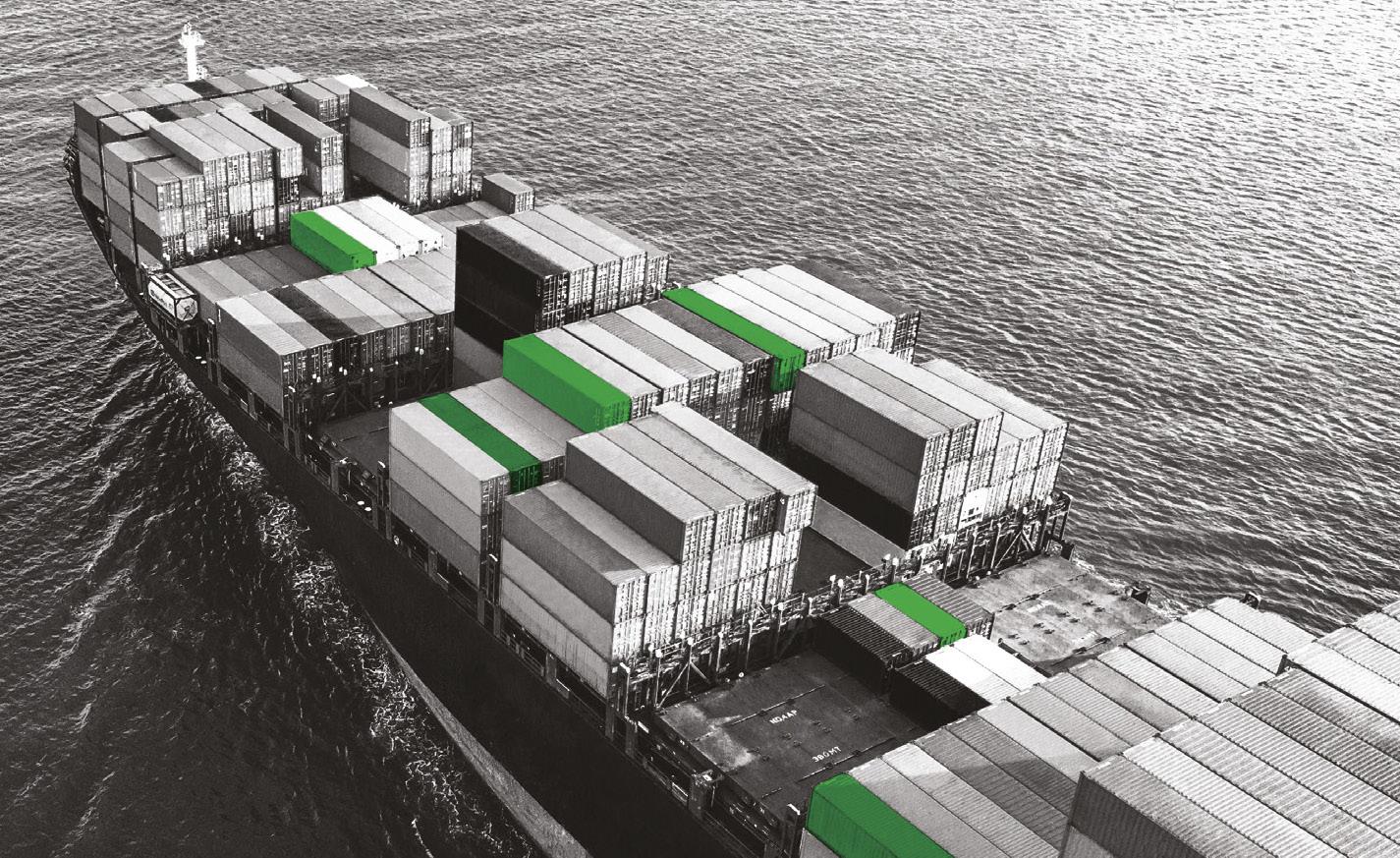
//Often, the difference between the good and great logistics businesses is finding the opportunities in the challenges. During tough times, the options are sit back and be overtaken, or choose optimism and accelerate.
Times have been tough on South Africa’s roads. Fuel price volatility, global supply chain collapse, port congestion, infrastructure deterioration, environmental issues, and the Covid hangover continue to blight logistics firms. Add a weak Rand and slack investor confidence and you have a recipe for disaster, but for many there are things happening that are helping to build long-term stability.
Tengwa Africa is a leading provider of transport and logistics services with a strong road transportation business, a rail loading operation; and access to warehousing, freight forwarding, and general logistics
management capabilities within the Group. From mineral resources to consumer goods, to industrial products, Tengwa – through a network of partner businesses – has the market covered.
Wholly owned by Export Trading Group (ETG) – a diverse global conglomerate – Tengwa Africa is looking forward to growing its influence as trade in commodities increases. Despite weak economic conditions across many of the spaces in which Tengwa plays, this relatively young business has managed to achieve significant results that are positioning it as a leading player in essential corridors.
“Tengwa Africa is primarily a road transport business,” explains COO Rupert Schmidt. “The bulk of our business involves road transportation of a range of commodities including fertiliser, coal, magnetite, chrome, and soft commodities including beans and soya. In Africa, we moved a lot of
copper and other project cargo to and from the DRC to the Port of Durban. As ETG, we have in country operations in Zimbabwe, Zambia, Mozambique and Tanzania, giving us access to facilities and people on the ground.”
Commercial Manager, Berndt Burger furthers: “We ride on the back of the commodities that move in Africachrome, nickel, lithium and other ores used in batteries. We run everywhere in southern Africa, south of the DRC. We are regularly moving products into Namibia, Botswana, Zimbabwe, Zambia, Mozambique, eSwatini, and Malawi.”
EXCITING TIMES
Tengwa’s offering is all about efficiency. Too often in southern Africa loads are delayed or lost, at the cost of local and international clients alike. Seeing this as unacceptable, Tengwa’s management team has worked relentlessly on redesigned
26 / www.enterprise-africa.net
processes and systems, and right-sized operations to ensure true value-add for clients, solving problems through a reliable and consistent approach.
Recently, the company sold its fleet of 98 trucks and 160 trailers in a strategy change, opting for an asset light tactic. Partnering with fleet owners with whom Tengwa has longstanding relationships, Tengwa now manages a dedicated fleet of more than 500 vehicles across the continent. This enables the company to work across two models - Managed Fleet and traditional Transport Brokerage.
“Tengwa is the client-facing party and manage these relationships with care,” says Schmidt. “Our operations team manages the efficiencies at the loading and offloading points, crossing borders, paperwork flow and
vehicle tracking. In summary, we take ownership of efficiencies whilst the fleet owner provides a serviceable and presentable fleet. By performing our respective duties, both parties are able to benefit equally from this partnership.
“These fleets are made up of vehicles for bulk and break-bulk commodities. A large portion of the fleet is Zambia-registered, enabling Tengwa to service all the major corridors. Major focus is on the copper corridors from northern Zambia and the DRC down to Durban, Dar es Salaam, Beira, and Walvis Bay,” says Schmidt.
This is where the big volumes are set to grow in the future. By 2035, global demand for copper will reach 50 million tonnes. 25 million tonnes were demanded in 2021 with mines only able to produce 22 million tonnes. This

situation has sent the price soaring. The DRC and Zambia are among the world’s top 10 copper producers and African ports ship to China regularly. By 2030, lithium carbonate equivalent demand will surpass two million metric tons. Namibia and Zimbabwe are Africa’s lithium hubs with mining expected to increase in coming years as the element is used in a global green energy transition.
“It’s an exciting time as we have good flows, good hands on the ground, good African coverage, good African experience, and we are partnering with companies with the same mindset,” explains Schmidt. “We are matching our core capabilities – people, product flows, and facilities – with experienced, locally relevant partners that understands the intricacies of
TENGWA AFRICA www.enterprise-africa.net / 27
INDUSTRY FOCUS: LOGISTICS
operating a fleet efficiently. The copper market is booming and we expect lithium to be the next big thing.
Driving efficiencies will come in the careful organisation of routes and clear planning. “The northbound fertiliser and soft commodities will enable bidirectional flows that we need to make us more competitive when compared to others moving along those same corridors,” says Burger.
The UN highlighted, in a recent report, the importance of building strong value chains in Africa’s battery minerals industry. The DRC produces 70% of the world’s cobalt, and southern Africa is well-known as the go-to region for graphite, platinum
metals, and more. The global electric vehicle industry, which relies on these minerals, is expected to hit values of $46 trillion by 2050. By investing in value chains to ensure efficiency across the market, Africa can overtake international rivals as the chosen source of eco-friendly minerals.
“We are expecting lots of positivity on the copper corridor,” says Schmidt. “Those commodities are in huge demand and lithium is only just starting.”
Burger adds that in difficult times, the company has remained resolute and committed to its strategy. “There is a lot of opportunity to be had in a tough environment. The recent demand for coal emanated from energy challenges
in Europe. As a significant exporter of coal, South African transport companies experienced an unexpected spike in demand for bulk road transportation to service this demand – Tengwa was well positioned to capitalised on this opportunity. Similarly, copper is booming in China which creates an opportunity to tap into that market. In turn, Tengwa shipped large volumes of fertilizer to Zambia via South African ports – this came as a result of prevailing congestion at other African ports. Our aim is to understand the markets as best we can which allows us to tap into these opportunities.”
Continues on page 30
BREAKING BARRIERS: DELIVERING INNOVATIVE SUPPLY CHAIN SOLUTIONS
The Santova Group is a leading logistics and supply chain service provider, headquartered in South Africa and listed on the Johannesburg Stock Exchange (JSE). Santova utilises the Group’s intellectual capital and technology, together with the resources and capabilities of specialised logistics service providers, to design, develop and execute end-to-end supply chain solutions for clients. These solutions including innovative structured products, such as vessel chartering and breakbulk shipping solutions, to offer flexible routings at a reduced transit time and cost.
Our local know-how an extensive experience in African enables us to offer comprehensive cross-border road freight solutions. A recent project involved Santova Logistics SA providing a logistics solution to a US AID contractor involved in building temperaturecontrolled, prefabricated medical clinics in sub-Saharan Africa. The clinics were prefabricated in South Africa and transported to various locations in Africa, where they would be assembled on-site.
Santova Logistics was tasked with managing the entire logistics process, including loading, transportation, customs clearance, delivery and unpack of the clinics to their respective destinations. In order to effectively manage the project, Santova Logistics deployed a team of experienced logistics professionals who were familiar with the local terrain and had extensive knowledge of customs regulations and clearance procedures at destination. The team worked closely with the US AID contractor to develop a comprehensive logistics solution that would ensure timeous and safe delivery.
To overcome the challenge of poorly maintained roads, Santova devised fit-for-purpose vehicle packing solutions and utilized specialized vehicles suitable for the harsh African terrain. They also collaborated closely with local customs officials to ensure timely permits and documentation, avoiding penalties and delays. In addition to the transportation and delivery of the clinics, Santova provided warehousing and inventory management services to ensure the clinic components were accounted for and correctly stored until assembly.
Owing to the proficient capabilities of Santova, and its collaborative approach with both the US AID contractor and local authorities, the project was a success, and has granted thousands of people in Africa access to quality healthcare services.
Contact Santova Logistics SA for innovative and reliable logistics solutions:
Website: www.santova.com | www.santova.co.za
Ocean Freight Estimates: estimates@santova.co.za
General enquiries: info@santova.com
Air Freight Estimates: airfreightestimates@santova.co.za
28 / www.enterprise-africa.net
S A N T O V A L O G I S T I C S
Innovative end-to-end Supply Chain Solutions

ROAD FREIGHT SOLUTIONS INTO AFRICA
Leveraging off extensive inhouse expertise and local know-how, Santova offers domestic and cross-border transport trucking services throughout Southern, Sub-Saharan and Equatorial Africa. We specalise in project cargo, oversized and general cargo, industrial cargo and equipment, palletised freight, mining equipment and machinery.

Countries serviced: South Africa, Angola, Botswana, Congo and DRC, Kenya, Lesotho, Malawi, Mozambique, Namibia, Rwanda, Swaziland, Tanzania, Uganda, Zambia and Zimbabwe.
Driving down landed costings
Client-centric services
meeting time, budget and resource constraints
BREAK BULK VESSEL SOLUTIONS
Santova facilitates reliable, secure and competitive logistics solutions for project, breakbulk, out-of-gauge (OOO) and oversized cargo. Our specialist team provides custom solutions on a case-bycase basis, tailored to your unique cost, time and budget requirements.
INSURANCE SOLUTIONS
Comprehensive inhouse marine, commercial, domestic and specialist insurance solutions for complete peace of mind.
AIR FREIGHT SERVICES
Client-centric services offering diverse routings, various transit options and strategic pricing including end-to-end landed costings and benchmarking.

INTRODUCING SEKIDA B2B Ecommerce Marketplace
Santova is excited to launch Sekida, an online B2B ecommerce marketplace. Sekida aims to give your business a competitive advantage through access to new suppliers, strategic sourcing of product and reliable logistics at competitive prices. Contact us for more information. www.sekida.com
AFRICA
87 284 2000
TENGWA
+27
info@santova.co.za www.santova.com
| info@sekida.com OCEAN FREIGHT EXPRESS AIR FREIGHT ROAD FREIGHT COMPREHENSIVE INSURANCE C O N T A C T S A N T O V A O F F I C E S C O U N T R I E S 21 11 C O N T I N E N T S 5
INDUSTRY FOCUS: LOGISTICS
Continued from page 28
‘NAVIGATE AROUND IT’
To access opportunities, there is a need to overcome challenges that very clearly exist on the African continent. Tengwa is no stranger to these bumps in the road and calls on deep experience from its team to navigate complex situations. “The environment we operate in is very challenging,” says Schmidt, highlighting some of the current hurdles.
“As an example, we run to Mozambique and Richards Bay where we export large volumes of coal –these ports are highly congested. Road conditions are not great, ports are congested leading to frustration from drivers emanating from excessive standing time. These bulk commodities
are suitable to rail, but due to capacity constraints, most volumes move on road. As South Africans, we have learnt to navigate around these challenges with resilience and positivity.
Tengwa works hand-in-hand with its fleet partners to understand and avoid costly delays, and it brings expertise across multiple tediousbut-necessary procedures to allow vehicles to remain focused on the road ahead. He adds that this model is not common in South Africa, with many competitors owning large fleets.

Tengwa’s strength was demonstrated in the past year, following a number of upgrades and adoption of tried and tested systems. Schmidt and Burger have helped to install new technology and software that is industry-recognised and streamlined.
This is just part of the journey as the company hopes to make use of more technology (currently busy rolling out data analytics and tracking coverage) to add further value to client operations.
“We are a clear enabler when moving product,” highlights Schmidt. “We move lots of fertiliser locally – we moved more than 30,000 tons from South Africa to Zambia in just the previous season. With magnetite, we moved almost one million tons in a year – that is something we are proud of.
REFRESHING INFLUENCE
ETG has helped Tengwa to become more efficient through access to trade flows from partners across the group. Despite being a large multinational company, ETG has maintained its entrepreneurial spirit,
30 / www.enterprise-africa.net
allowing business to make decisions and capitalise on opportunities.
Burger agrees: “Their biggest influence comes from group flow and volume. ETG owns a large fertiliser organsation and they handle grain and maize trading. When they complete those trades, we get to be involved in some of those movements.”
Growth for Tengwa is about
reinforcing relationships with clients and helping to move more cargo around Africa, while continuing to build a strong base of high-quality systems and processes that deliver regional presence, global reach, for Africa and beyond.
“It is about getting our operating model and systems right. A key contributor to our success is the ability to plan around uncertainty. A lack of planning leads to clients and suppliers being frustrated and mistakes are costly. We have set the back office up professionally, with proper people and systems - this is an enabler for taking on the big jobs. A backbone that works is key,” states Schmidt.
He adds that deeper relationships with clients means a holistic understanding of problems, and how Tengwa can deliver solutions. A neverending desire to learn means that the industry stays exciting. “You understand the dynamics of different industries,” he
says. “We get to learn about complex national retail operations, what goes into steel manufacturing, why copper is important and how different types of cargo should be handled. In logistics, the learning process never stops.”
This is a business excited about the future, not anchored by negativity, but looking beyond the horizon for opportunity. “Tengwa is not the same Tengwa from five years ago. We have gone through a lot of change and we are geared to move big volumes, providing great service, at competitive prices.
“We have access to flows, we have good clients, and we are bullish and positive,” Schmidt concludes.
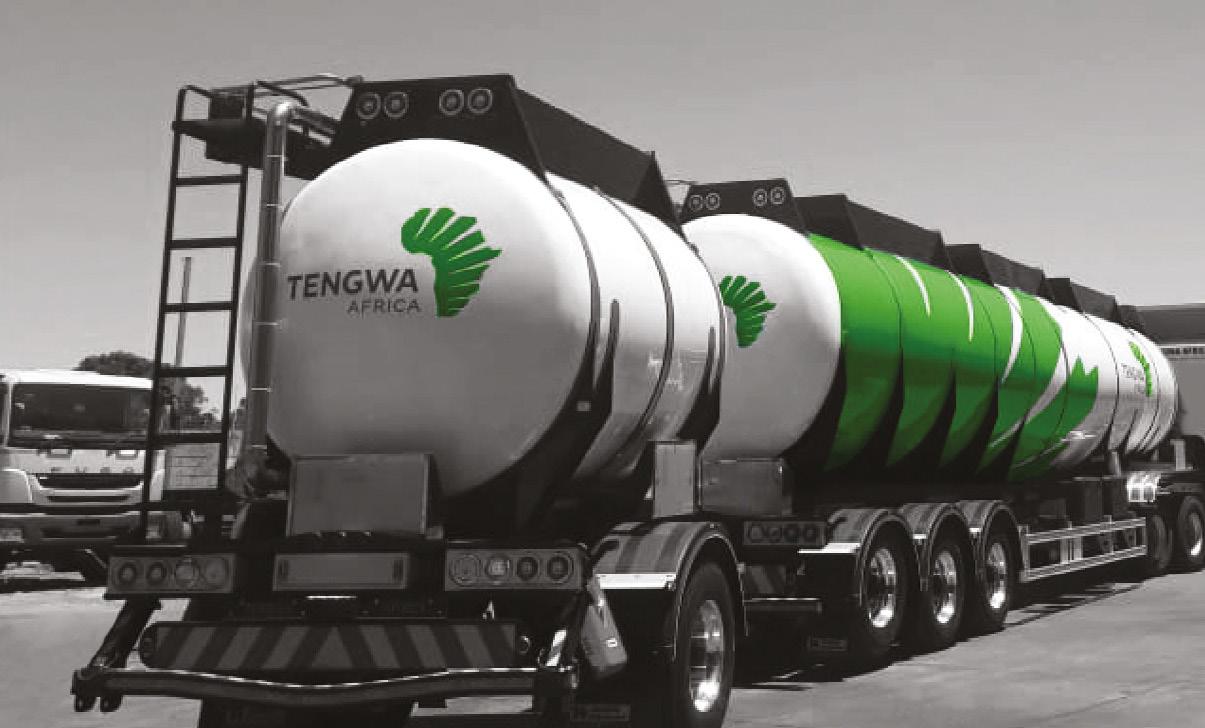
TENGWA AFRICA www.enterprise-africa.net / 31
WWW.TENGWA.CO.ZA
// WE HAVE SET THE BACK OFFICE UP PROFESSIONALLY, WITH PROPER PEOPLE AND SYSTEMS - THIS IS AN ENABLER FOR TAKING ON THE BIG JOBS //
TITAN CARGO
Faster, Better, Cost Effective Supply Chain Solutions
Founded in Cape Town in 1989 by father and son duo John and James Wilson, the Amdec Group has gone on to experience exponential growth over the last 10 years and expanded to achieve global reach. Now boasting a real estate portfolio in excess of 500,000 m², 274,000 m² of commercial space, and more than 2000 residential unit with a further 1653 under construction, Amdec’s showreel is one of the best and most varied around.
 PRODUCTION: James Davey
PRODUCTION: James Davey
32 / www.enterprise-africa.net
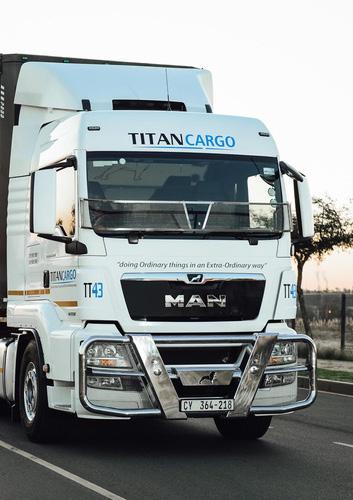
INDUSTRY FOCUS: LOGISTICS
//“Titan Cargo has evolved into a logistics brand that is associated with innovation, agility, and high-quality tailormade integrated logistics services for blue-chip customers,” says MD Sugan Naidoo, speaking about the Cape Town-based company positioning itself as a leader in the African logistics space.
Established in 2007, with 350 people, almost 400 vehicles, and almost 200,000 m2 of A-grade FMCG warehouse space, the company that claims ‘extraordinary’ has a base for its confidence.
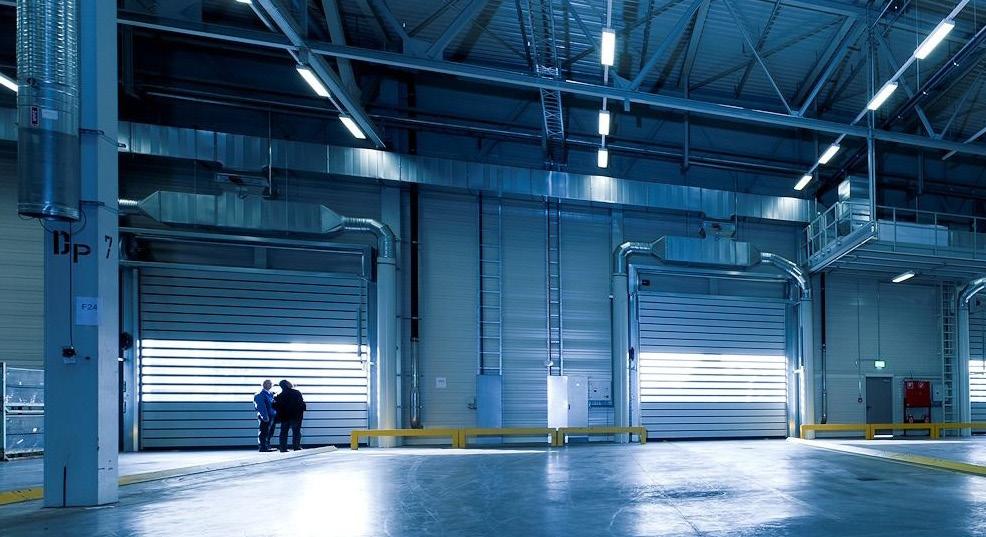
Many argue they are great; lots suggest that they are the best. Most overpromise and under deliver. Few go as far as self-proclaiming ‘extraordinary’, but Titan Cargo uses the tagline “doing ordinary things in an extraordinary way”. Asked about what sets the company apart from
the hundreds of others that navigate South Africa’s road network, Naidoo explains that a highly competent and ambitious team combined with full scale integration is a differentiator.
“Our uniqueness lies in our integrated logistics capabilities where we operate a national footprint of modern warehouses, complimented by a modern fleet of linehaul, managed fleet, import and export, primary and secondary distribution trucks for listed companies.
“Our competitive advantage is our people, with a can-do attitude and a positive mindset that underpins our agile and customerresponsive organisational culture.”
The proof is in the trailer. Big brands trust Titan. Heineken Beverages SA, Distell Ltd, Rhodes Food Group, Kimberley-Clark, Freddy Hirsch, SimbaPepsico, Huawei, Maersk, DSV, Ford, Rhenus Logistics, Aquelle, Huawei and
Tongaat Hullett all utilise the company’s portfolio, handling containerised cargo at ports before road and railing product to distribution centres across the region. A company passionate about transformation and upliftment, Titan Cargo is Level 1 BBBEE rated, 100% black and 50% woman owned. Partnering with big-name clients and investing internally, the company has reached R400m turnover, with no plans to brake anytime soon.
DURBAN EXPANSION
In KZN, Titan is busy investing in new, additional warehouse space at the Port of Durban in an effort to reduce congestion on site. This new site will allow for streamlined operations where containers come in, are unpacked, and loaded onto rail or truck for haulage around South Africa and beyond. The demand, says Naidoo, comes from clients.
34 / www.enterprise-africa.net
“We are investing in new warehouse space in Durban for our strategic FMCG customers who need back-of-port warehouse space for de-stuffing of imported containers, warehouse storage and distribution. This is part of Titan Cargo’s strategy to invest in back-ofport warehouse facilities that use rail and also alleviate port bottlenecks.”
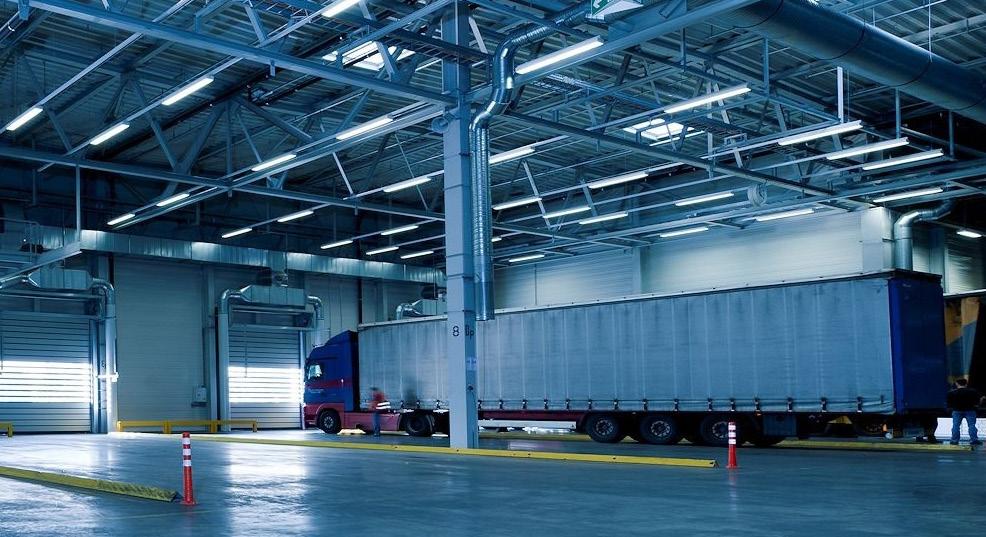
Reports suggest that congestion in Durban costs the local economy R1 billion annually. Many solutions have been tabled - including road bypasses, container barges, private management of infrastructure, restrictions on transporters etc – but none solve a short-term problem for those struggling to get goods through the largest container port in Africa.
Titan Cargo has recognised the challenge and is taking action.
In Cape Town, a similar problem is being met with a similar solution as
the company invests in its Titan Cargo Belcon Warehouse (TBW), something of which Naidoo is particularly proud.
“The TBW is a unique back-ofport FMCG multi-modal consolidation hub that provides seamless and efficient access in and out of the

port of Cape Town, through tried and trusted rail services from Belcon, as well as providing for road and rail multi-modal integration.”
94,000 m2 of A-grade FMCG
Continues on page 38
TITAN CARGO www.enterprise-africa.net / 35
As a wholesale fuel distribution company, SFT Energy is dedicated to providing reliable, high-quality fuel to businesses and individual fleet owners across South Africa. With a strong focus on customer service and a commitment to excellence, SFT Energy has become a trusted partner for those in need of fuel delivery services to their designated operations at various sites.
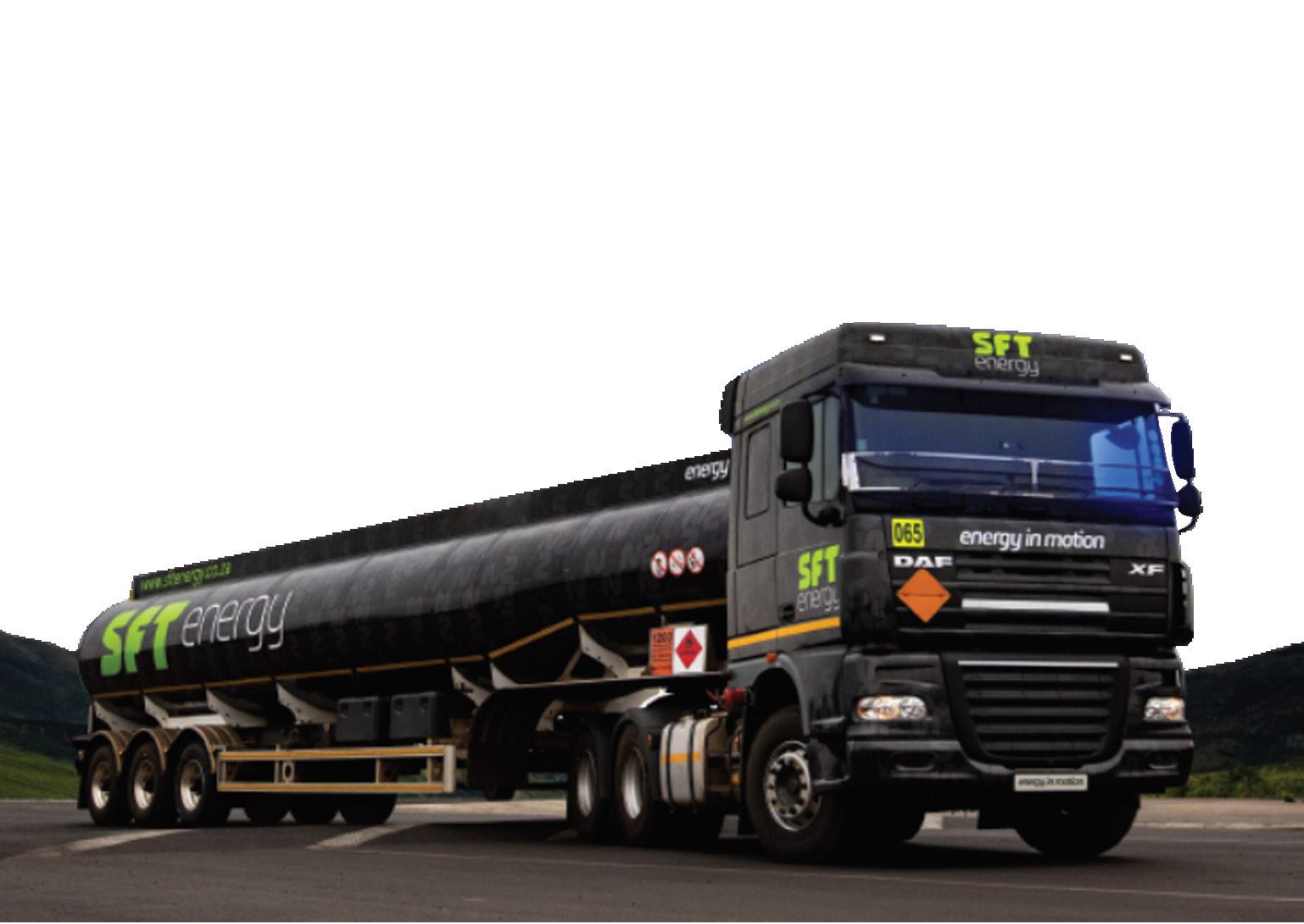
One of the key advantages of working with SFT Energy is the company’s national reach. Whether you’re located in a major city or a remote rural area, SFT Energy has the infrastructure and logistics capabilities to deliver fuel to your doorstep. This makes it easy for businesses of all sizes to access the fuel they need to keep their operations running smoothly.
This is demonstrated by a key collaboration with Titan Cargo, a leading supply chain facilitator in SA. Another important factor that sets SFT Energy apart is its commitment to quality. The company’s fuel meets all industry standards, ensuring that customers receive a product that is of high quality direct from our accredited fuel suppliers. Whether you’re filling up your car at a local petrol station or refuelling your fleet of trucks, you can trust SFT Energy to provide the highest quality fuel available. Perhaps the most impressive aspect of SFT Energy’s business is its focus on customer service and retention. From the moment you place an order to the moment your fuel is delivered, SFT Energy’s team of experts are there to ensure that your delivery is received timeously. The company’s staff is knowledgeable, friendly, and responsive, making it easy for customers to get the answers and support they need 24/7.
The new SFT app that has been developed is currently in the advanced stages of testing and will be rolled out to all our customers by the end of June 2023. This will enable customers to place their orders and monitor their delivery’s via the app and an online dashboard.
In short, SFT Energy is much more than just a wholesale fuel distributor. It is a partner to businesses and individuals across South Africa, providing the fuel they need to keep their operations running smoothly. With a focus on quality, reliability, and customer service, SFT Energy is poised to remain a leader in the industry for years to come.
Partner with us and experience the difference.
SUSTAINABLEFUELTECHNOLOGY
SFT Energy Proprietary Limited - Wholesale and Retail Fuel Supply 3rd Floor Karee Building, Tuinhof Office Park, 265 West Avenue, Die Hoewes, Centurion Office: +27 12 004 3179 Email: admin@sftenergy.co.za
Join
Delivering excellence, Delivering results, Energising your business

the ranks of successful businesses fuelled by SFT Energy’s sustainable solutions, innovative technology, and commitment to excellence.
INDUSTRY FOCUS: LOGISTICS
Continued from page 35
multi-principled, multi-product warehouse space is a positive step in the reduction of congestion at the Port of Cape Town as well as promoting reductions in carbon footprints.
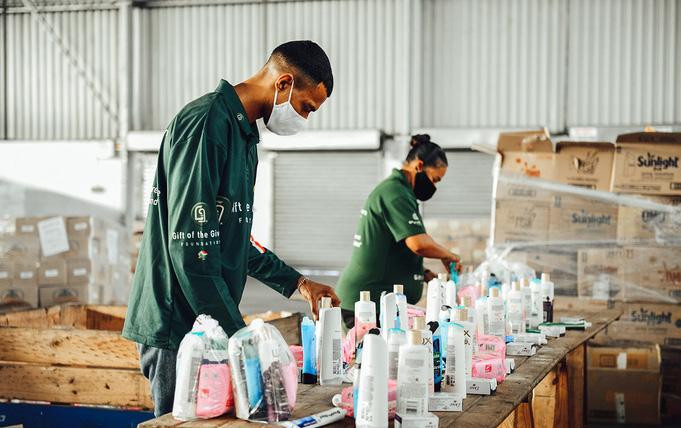
“A single train carrying 100 containers from the TBW into the Port of Cape Town will remove 100 road trucks. This TBW warehouse is a gamechanger for road to rail initiatives in the Western Cape and in particular the City of Cape Town. Phase 1 of the TBW warehouse is already operational with over 50,000 m2 allocated to roadto-rail FMCG customers. Phase 2 is for a further 45 000 m2 that is currently being upgraded in an A-grade FMCG consolidation hub, and this will be ready for further road-to-rail migration into and out of the Port of Cape Town by September 2023,” Naidoo furthers.
ROAD-TO-RAIL
The strategy of moving freight from road to rail goes back more than 10 years in South Africa. Key goals in this strategy are social upliftment, infrastructure and efficiency improvement, and mitigating greenhouse gas emissions. Officially, the process is headed by Transnet but the private sector is actively encouraged and engaged.
Titan Cargo takes environmental commitments seriously and is an active participant in the drive to get more freight onto tracks and off the highways, and especially out of the city centres.
“Titan Cargo has already embraced the road-to-rail strategy of Transnet, and has therefore already migrated over 1500 containers per month from road to rail, utilising the Transnet Belcon Container Terminal into and out of the Port of Cape Town,” highlights
Naidoo. “Titan Cargo is a strong supporter of public-private partnerships and believes that the private and public sector can achieve great accomplishments by working together and leveraging each other’s strengths.”
Even when the company is forced to move goods through the metros surrounding busy ports, it has taken the decision to invest in the latest vehicles – with modern technology – to ensure minimal air pollution and maximum efficiency.
“We have already implemented a strategic decision to be climate friendly and to make a positive contribution to protect our climate for generations to come,” confirms Naidoo. “We have implemented green technologies for all our warehouse machinery and we have implemented a fleet renewal program
Continues on page 40
38 / www.enterprise-africa.net
admin@krieltrans.co.za

OUR RESPONSIBILITY
www.krieltrans.co.za

3 Edwill Street, Kriel,
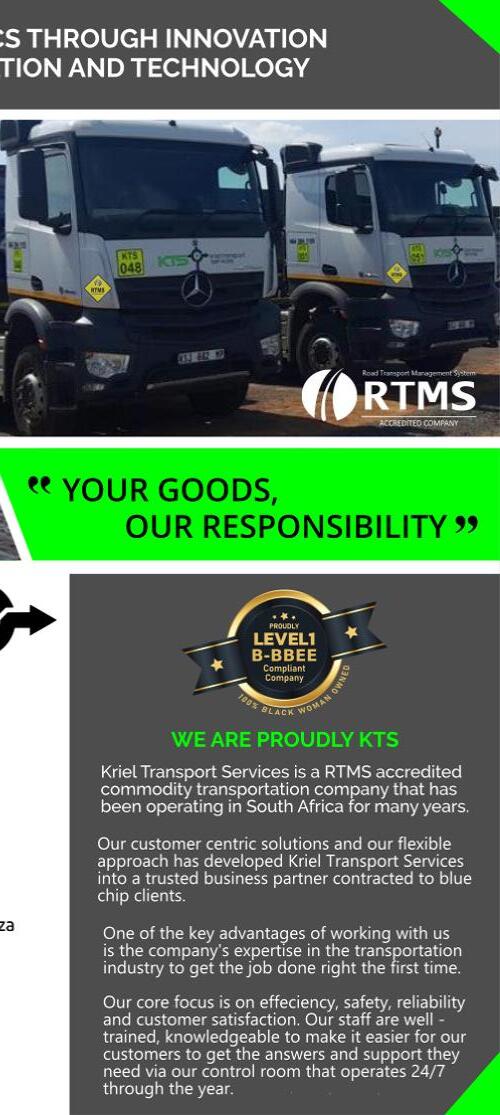
LOGISTICS THROUGH INNOVATION DEDICATION AND TECHNOLOGY
YOUR GOODS
INDUSTRY FOCUS: LOGISTICS
Continued from page 38
that has already given us great results through having fuel-efficient latestgeneration trucks. Additionally, we are exploring solar and battery energy at all our warehouses. Our flagship Intermodal solutions tick the box for sustainability for us and our clients, removing hundreds of trucks and replacing it with singular train units.”

The national warehouse footprint of the company has allowed for the large fleet to be catered for carefully. Daily technical inspections from a team of experts ensure client cargos remain safe and secure while in transit. The company also enjoys the
support of OEMs when it comes to fleet maintenance and upkeep to keep trucks and trailers in top operating condition.
“Importantly,” adds Naidoo, “our highly skilled and loyal drivers protect the longevity and condition of our fleet. We have created a culture wherein our people consider Titan Cargo as their own and this forms a large part of our competitive advantage.”
In the future, ongoing development and growth of the fleet is already planned. Renewal and acquisition will happen in line with growing demand from clients.
“These programs are continuously adding to the much-needed future transportation capacity that Titan
Cargo needs,” explains Naidoo. “We are investing in new fleet capacity ahead of demand so that as our customers grow, we are able to meet their new capacity demands. Our fleet programs are very progressive and aggressive.”
Again, the strategy has been verified in the faith that clients have shown in Titan. Powerful growth has been achieved, moving from two customers just a few years ago to more than 20 blue-chip customers today. The fleet boomed from 20 to 200, and team grew from 15 to 350 people in the same period of time. “Our growth is testament to the fact that our service offering is extraordinary, and the market is receiving this well,” says Naidoo.
OVERCOMING THE BUMPS
Growing a sizeable organisation in South Africa has not been easy recently. Success in business is never simple,
Continues on page 42
40 / www.enterprise-africa.net
// WE ARE INVESTING IN NEW FLEET CAPACITY AHEAD OF DEMAND SO THAT AS OUR CUSTOMERS GROW, WE ARE ABLE TO MEET THEIR NEW CAPACITY DEMANDS //
“Transport Solutions for a better tommorow”
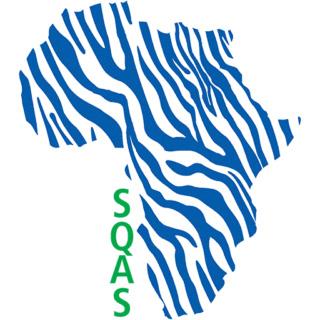
As a leading commodity transporter, our company boasts a diverse neet of petroleum tankers, lnterlink tautliners and combination side tippers to meet all our customer’s requirements. Our vehicles are maintained to the highest standards and our drivers are trained to provide prompt and effecient delivery of your products backed by a 24/7 hour control room. Skye Energy t/a Skye Logistics Is a SQAS compliant company which gives our customers further peace of mind.
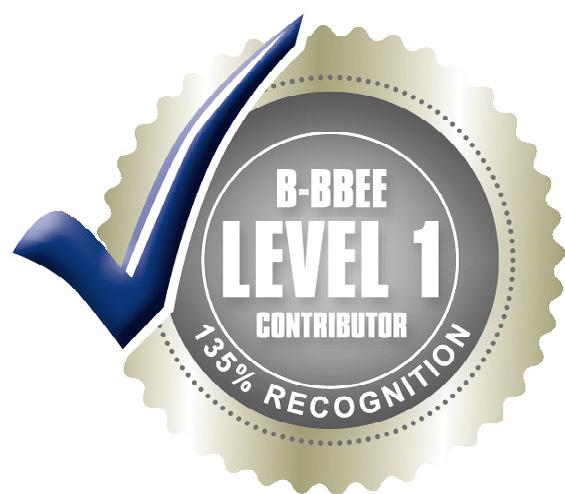
We offer personalised and cost-effective solutions to meet the unique needs of our customers. Whether you need transportation for a single shipment or ongoing logistics support, we have the expertise and resouces to help your business succeed.
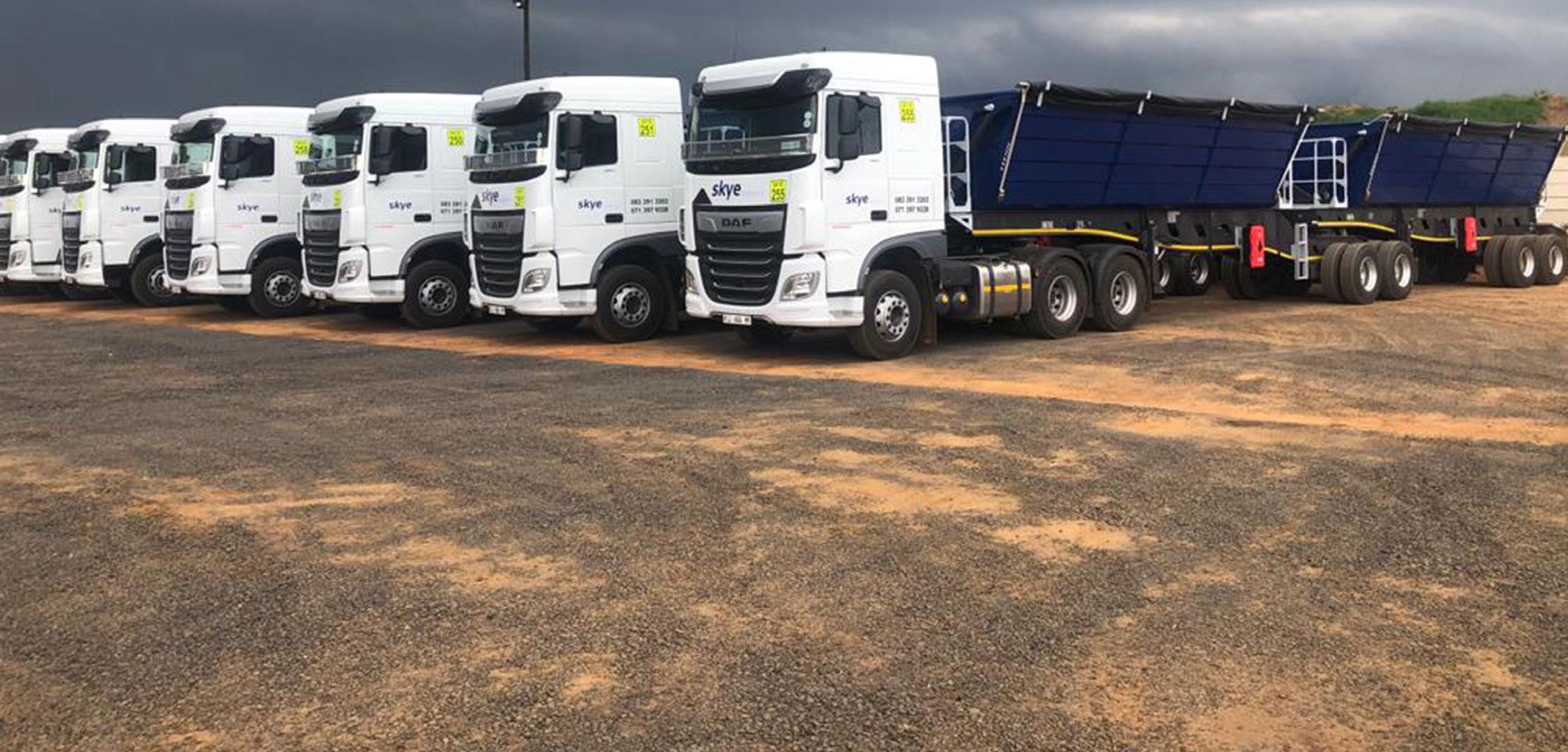
012 004 3179 lingesan@sftenergy.co.za C301 / 302 Karee Building, Tuinhof Office Park 265 West Avenue, Die Hoewes Centurion, 0157 YOUR PARTNER IN LOGISTICS 012 004 3179 061 542 4621 lingesan@skyeenergy.co.za 3rd Floor Karee Building, Tuinhof Office Park 265 West Avenue, Die Hoewes, Centurion www.skyeenergy.co.za MakeSkyeYourChoice
Continued from page 40
but when added economic pressures and global Covid shutdowns are added to the mix, you get an extraordinarily tough environment. Several additional factors also come into play when
considering growth and sustainability, but Titan Cargo has used all the experience from within its team and the communities in which it operates to develop a company that adds real value.
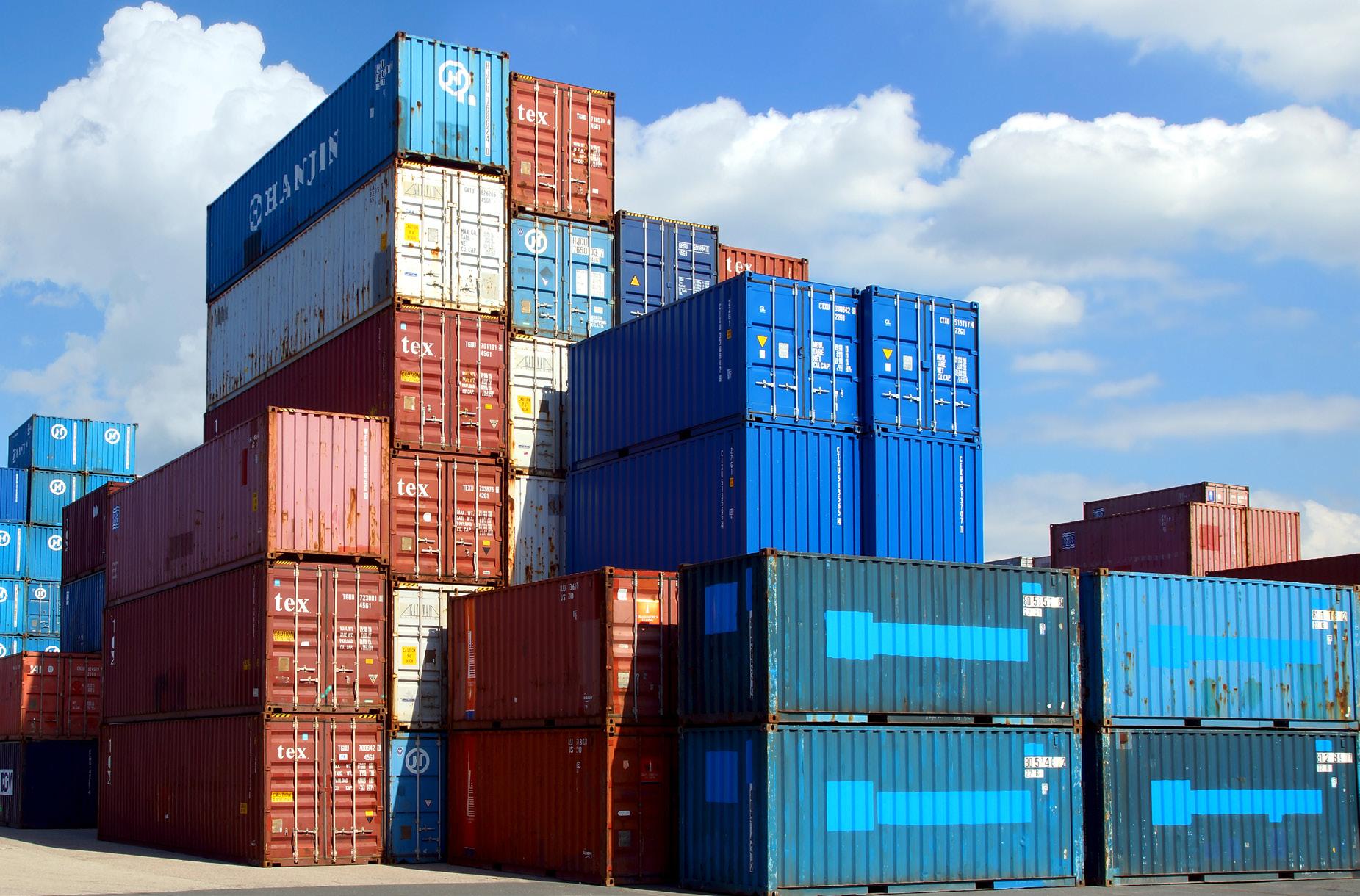
“Titan Cargo’s key strategy to mitigate against economic shocks is to rapidly scale up its existing warehousing and transport business, as well as on-board more blue-chip customers. Additionally, Titan Cargo has over the years developed a very flexible model of operating warehouses efficiently for flex-up and flex-down demands and this is what helped us to thrive and grow during the worst economic shocks of the past,” details Naidoo on the company’s vast experience.
He takes the choice of optimism amid a myriad of negative factors and, importantly, is well-prepared for challenging conditions.
“We are concerned about the ongoing energy challenges in South Africa. However, Titan Cargo has taken an approach of contributing and implementing energy solutions as opposed to complaining. Titan Cargo firmly believes that if all of us come together and assist the South African government, we will make a positive influence in alleviating the energy challenges we are faced with, and leave future generations with a vibrant and growing economy.
“The availability of skilled logistics people is always a challenge,” he adds. “However, our solid market reputation has assisted us greatly in attracting the right people. We also recruit from the communities within which we operate in, as local community upliftment is one of our sustainability strategies. We hire for attitude and
42 / www.enterprise-africa.net
INDUSTRY FOCUS: LOGISTICS
// OUR BRAND HAS BECOME SYNONYMOUS WITH GIVING BLUECHIP CUSTOMERS COMPETITIVE ADVANTAGE IN THEIR ROUTE TO MARKET STRATEGIES //
personality and we train for skills.”
He highlights the company’s agility and nimble approach as key in remaining in pole position in around the country’s ports, saying that challenges have presented opportunities. As clients have been faced with true difficulty, Titan has been able to display strength – not unnoticed by the rest of the industry, demonstrated by its growing number of blue-chip clients.
TOP GEAR?
As the company cruises into top gear, beating rivals on price, efficiency, and results, ambition has not diminished. There is no plan for consolidation or slowdown. According to Naidoo, growth remains the driver of everything the company does.

“We are currently exploring warehouse collaborations in Southern
African Development Community (SADC) countries as well as in the Indian Ocean Islands. There are definitely opportunities in SADC and Indian Ocean Islands for A-grade FMCG warehouses that are highly integrated with road transport for route to market capabilities.
“Our brand has become synonymous with giving blue-chip customers competitive advantage in their route to market strategies. Our uniqueness lies in our simplicity.”
Clearly, Titan’s approach of doing ordinary things in an extraordinary way is paying off. Every seemingly unnecessary task, basic process, or simple action as grouped into a larger structure and reinforced with quality. But this extraordinary ability and delivery is only capable with great people, and Naidoo pays tribute to
Titan’s unique human resource.
“We intentionally protect our nimble-footed flat organizational structure, openly encourage and reward innovation and creativity so that we adapt quickly to market changes and are able to respond rapidly and flexibly to customer needs.
“We have created an empowering environment where our people thrive, are passionate and want to solve customer challenges. This we believe is our competitive advantage,” he concludes. “We do what we say and deliver what we promise, consistently and with appreciation for our customers.”
TITAN CARGO www.enterprise-africa.net / 43
WWW.TITANCARGO.CO.ZA
PREMIER FISHING SOUTH AFRICA
Consolidating Strength While Hunting for Growth
Leading vertically integrated fishing organisation, Premier Fishing, is leading the way in the export market for lobster and squid, while providing a safe and responsible business for local communities in SA. CEO Sooren Ramdenee wants to reinforce the company’s strength in core markets while actively growing in new spaces. He talks to Enterprise Africa about success in a tough market.
 PRODUCTION: Kim Berrystone
PRODUCTION: Kim Berrystone
44 / www.enterprise-africa.net
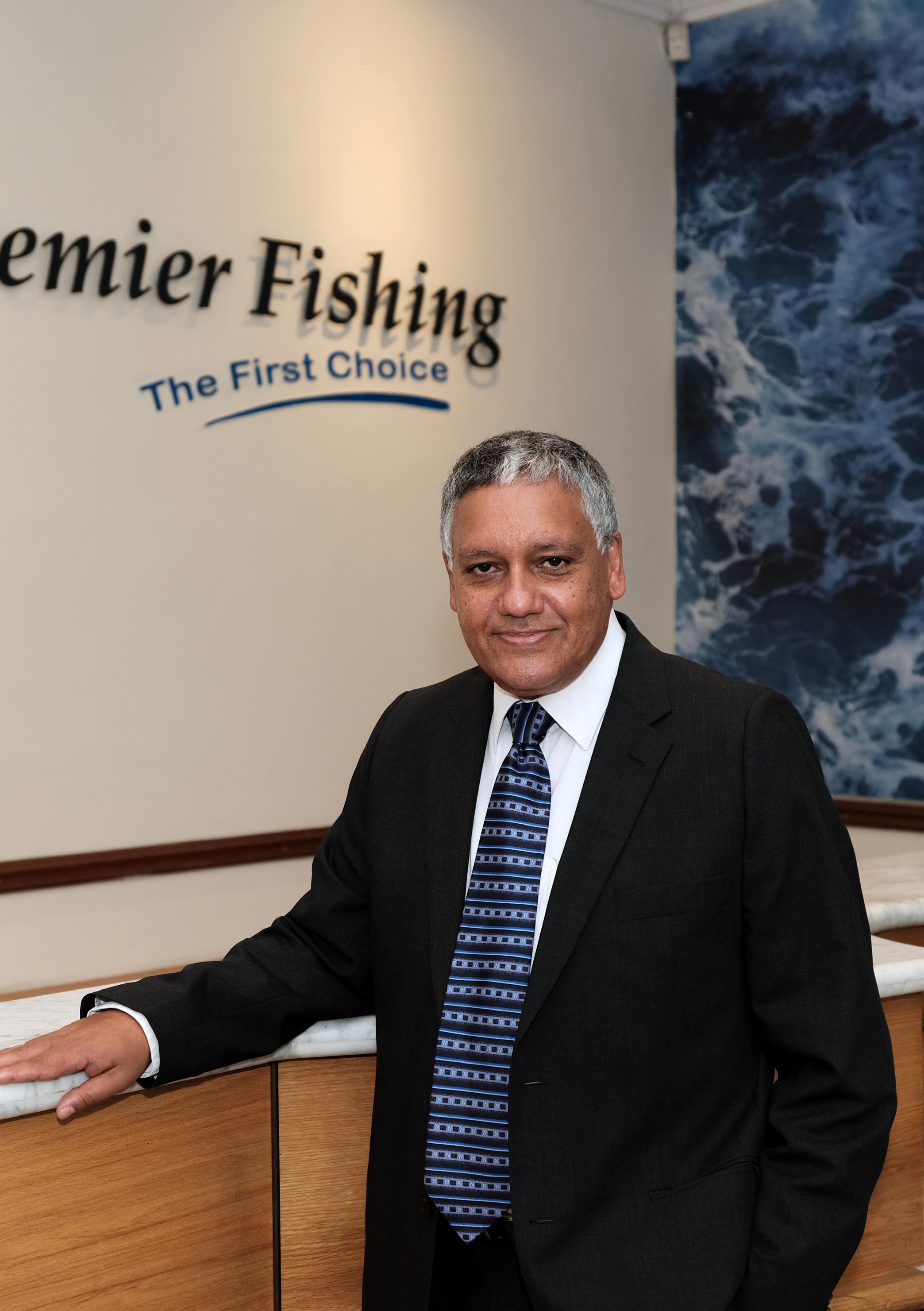 Sooren Ramdenee, CEO
Sooren Ramdenee, CEO
INDUSTRY FOCUS: FOOD & AGRICULTURE
//South Africa’s Operation Phakisa is about utilising the vast oceans that surround the country’s more-than-3000km of coastline. Established in 2014, Operation Phakisa looks to build economic prosperity and opportunity by unlocking the power of the sea. The clashing cold Atlantic Ocean meets the warmer Indian Ocean at Cape Point, and the water provides a bounty.
On land, the value increases. Marine transport and manufacturing, energy oil and gas, aquaculture, marine protection, small harbours, tourism, and much more is given life by the sea.
Some suggest that by 2033, South Africa’s oceans could contribute up to R177 billion to GDP and
support more than 800,000 jobs.
At Premier Fishing South Africa, one of the country’s leading commercial fishing, fish processing and marketing companies, the power and potential off the coast is being highlighted by ongoing growth in a tough industry.

“We are the market leader in the south coast rock lobster and the biggest exporter of south coast rock lobster from South Africa. We are the largest exporter of squid from South Africa to Europe – we lead in those two markets,” explains CEO Sooren Ramdenee.
“We also have an aquaculture farm where we produce abalone, and we are in many other fishing sectors as well, including pilchards, octopus, and hake.”
The company owns strong
brands including South Atlantic Lobster, Marine Growers, Atlantic Abalone, Sea Diamond, and Seagro an organic fertilizer product.
HUNTING FOR OPPORTUNITY
In 2020 and 2021, Premier Fishing & Brands Ltd – the JSE-listed entity that controls Premier Fishing South Africa – posted strong financial results despite rough economic conditions. Vertical integration helped the business to retain strong cost controls and,
46 / www.enterprise-africa.net
// FISHING IS ALWAYS A CHALLENGE - IT IS A DIFFICULT INDUSTRY //
in its 2021 results presentation, the company highlighted optimism and positivity when looking forward.
Today, Premier Fishing is busy across widespread geographic locations around the country, and Ramdenee is looking for new avenues for growth. A Certified Chartered Accountant by training, he is clear that the numbers will follow the development of a robust team culture.
“Fishing is always a challenge - it is a difficult industry,” he admits. “But the company has always been well-run and my job is to expand the company further and consolidate on what we have. We turn to shareholders (African Equity Empowerment Investments Ltd) and experienced employees, and all stakeholders to help with that. It has been interesting over the past few months, and hopefully we are on the right path.
“We value our people. The most important asset in our company is our people – our seafarers, skippers, and everyone on the boats. Without them, there is nothing. They get the product – they put their lives at risk. We get the product and sell it, but without them, there is nothing.”
After joining the company in 2022, Ramdenee has identified the areas where Premier Fishing already leads as essential for both growth and consolidation, and helped strengthen the company’s holding in Talhado Fishing Enterprises – a specialist squid business with freezing facilities on land and sea. “Recently,” he says, “we have acquired additional stake in the squid sector. We had 50.3% of Talhado Fishing Enterprises and we have acquired an additional 30.35% to bring our shareholding to 80.6%. We will look for other opportunities in SA and outside of SA – if it meets our criteria, we will certainly look at it.”
Squid has been a particularly important sector for Premier Fishing and the company is now a leader in the South African industry, driving revenue for the country.
“We send to various countries in Europe – Portugal, Spain, France, Italy, Croatia and more. We also export to the USA, Japan, China, and Taiwan and Japan - we have a vast network,” says Ramdenee, adding that the limits imposed on fishing of certain stocks, while welcomed, mean that the company cannot always fulfil demand with supply. This is why the CEO remains hungry for further opportunity.
“As a company you cannot stay stagnant. You always need to grow and you have to be open-minded. We are actively looking for opportunities.”
HISTORICALLY BUOYANT
Premier Fishing South Africa is more than 70-years old. The company has been navigating the seas around the country for decades and is headquartered from Cape Town. Bases include Saldanha Bay, Hout

Bay, Gansbaai, and Port Elizabeth and St Francis Bay. The goal for the business is ‘to be the first choice in everything we do and for our stakeholders’. Currently, customers around the world receive some of the finest lobster products thanks to historic excellence in the sector.
In 2022, Premier Fishing received R200 million in revenue from its lobster business, an increase on 2021. At the same time, the company negotiated fishing rights for the next 15 years for south coast rock lobster as well as other lines. Generally, lobster catches are frozen at sea before being graded and packed at facilities on land. SCRL live in deep water and so must be fished with long-line traps or baited lobster pots, requiring multiple hauls each week. Most of the catch heads to the USA and the knowledge that customers respect and acknowledge South Africa’s

www.enterprise-africa.net / 47
PREMIER FISHING SOUTH AFRICA
Contact Keith Goldschmidt Office: 022-300 0078 Cell: 072 733 4305 keywayshipwright@gmail.com
Keyway Shipwright
INDUSTRY FOCUS: FOOD & AGRICULTURE
hard work is fantastic for the local workforce, which sits at around 800 people depending on time of year.
“It is a good environment to work in,” says Ramdenee. “Everyone knows what they have to do. We are running a business so we do have to be sustainable. The fishing industry is seasonal. There are times when fishermen and crew are not working. We equip ourselves for that, we prepare and develop other tasks. It’s not all about profit – it is about an eco-system including the whole community. You have to balance what you can do, and that is what I am proud of.”
LOCAL, REGIONAL, GLOBAL
A Level 1 BBBEE company, with significant local procurement scores, the business is committed to safety through a large network of regional partners, but this does
present challenges in ensuring quality of the highest standard.
“We do give preferences to BEE companies, but they must be able to deliver. Our supply chain is critical to the running of the business and we are well-staffed. Whoever we deal with has to be the best. We cannot take risks, we are pedantic about this to ensure we keep our costs down. Everything is checked and audited to ensure we are getting the right prices – that is how we maintain our costs and production,” explains Ramdenee.
At the same time, Premier Fishing is building partnerships in the community and, in the past five years, invested more than R12 million into education and feeding schemes. R2 million was spent on learnerships, education, and skills development in 2022 alone. This comes at a time when the South African economy is challenged from
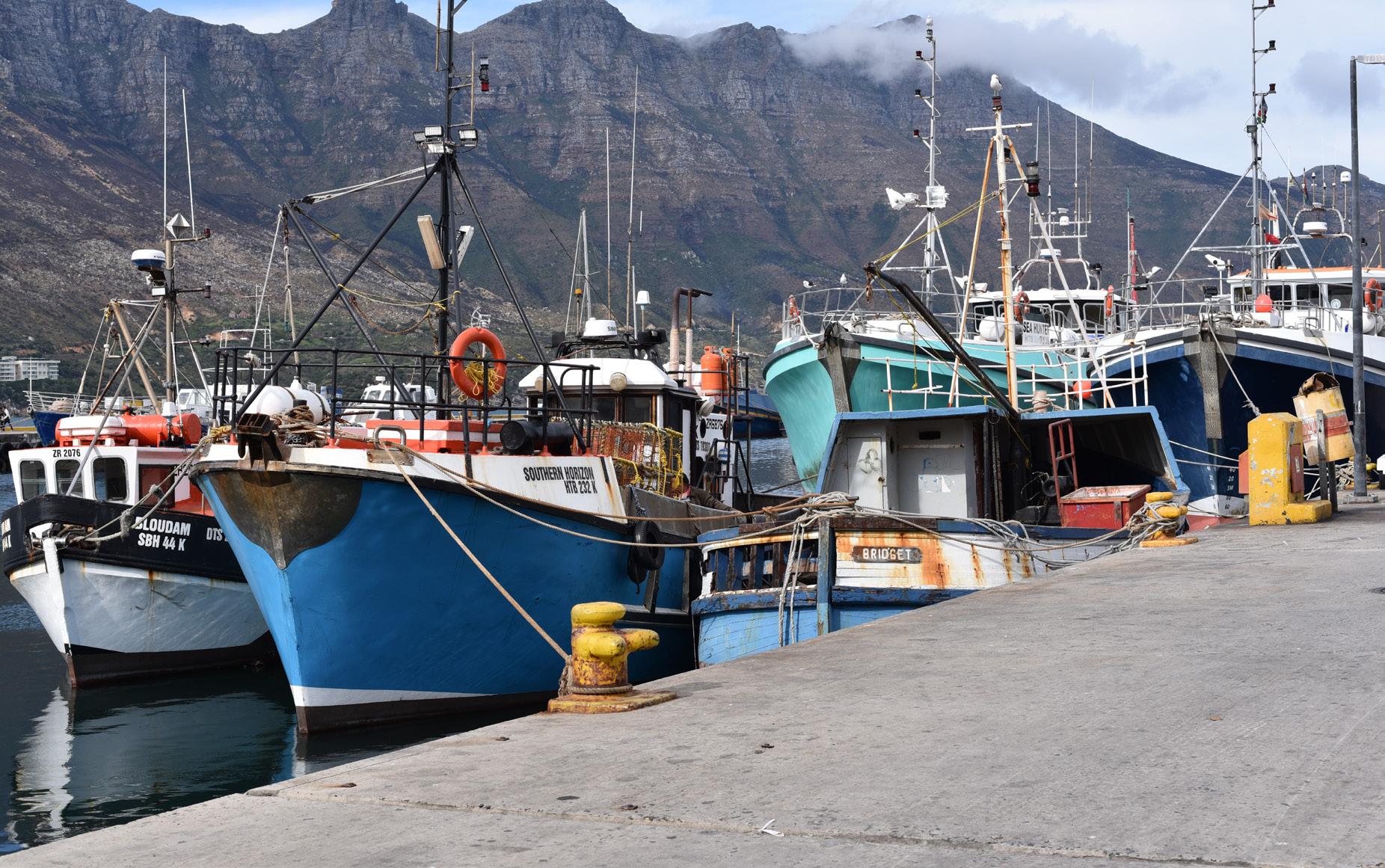
all directions and the global economy remains highly unpredictable and uncertain. Today, Premier Fishing is debt free and at the helm of its own destiny.
“We have our own vessels, equipment, people, and sites,” says Ramdenee. “One of the most important things to ensure is that any vessel we put to sea is safe. There is an emphasis on this because we are putting people’s lives on the boat. We have to ensure they are up to standard with regards to repairs and maintenance. Diesel costs a lot of money – sometimes people can be out at sea for around a month, and that is expensive. We do have a central procurement team, and we have shore skippers at each location to ensure we have the right conditions to go to sea.”
According to a study from Stanford University, global demand for seafood is set to double by 2050. China alone will consume around 100 million tonnes
48 / www.enterprise-africa.net
PREMIER FISHING SOUTH AFRICA

by 2050, and many are busy with research into alternatives for sources of iron, calcium and vitamin B-12 as the world slows its consumption of red meats. Changing appetite among young consumers, climate change issues, and the ability to quickly upscale sustainable production will all be hurdles for the wider global industry, but Premier Fishing is standing strong with a diverse product portfolio and varied customer base.
Currently, the fierce waters off South Africa’s coast are plentiful and Premier Fishing is looking to build on its fair winds.
“We are very flexible,” says Ramdenee. “We react quickly and take opportunities. We lead in south coast rock lobster and squid, and these are good businesses to be in. Based on what we can catch, all of our goods are sold – we simply cannot catch enough. We export everything, and that is good for the country as we are a foreign revenue earner. As we grow, we will be able to employ more people sustainably.
“We are always looking for opportunities,” he concludes. “We actively want to expand and grow. We evaluate every chance – we are in a phase where we want to grow the business aggressively.”
As progress with Operation Phakisa continues, Premier Fishing is the perfect demonstrator of how successful a sustainable ocean-based business can be, even over the biggest waves.
www.enterprise-africa.net / 49
WWW.PREMIERFISHING.CO.ZA
// IT’S NOT ALL ABOUT PROFIT – IT IS ABOUT AN ECO-SYSTEM INCLUDING THE WHOLE COMMUNITY //
IBL SHIPPING
Perfect Partner in Port Louis
A leading player in the Mauritius logistics sector, IBL Shipping has built a reputation based on steadfast ethics and morals that helps streamline the business of clients. Growing in the region, and adapting to new challenges, this is business on a growth heading, and GM Thierry Perrier and BDM Noël Rault tell Enterprise Africa more about the company’s unique offering.
 PRODUCTION: Jamie Waters
PRODUCTION: Jamie Waters
50 / www.enterprise-africa.net

INDUSTRY FOCUS: LOGISTICS
repairs and maintenance, servicing, agency services, and more.
General Manager Capt. Thierry Perrier and Business Development and Marketing Manager Noël Rault tell Enterprise Africa that the company is searching for new opportunities to apply is unique brand of service, where the customer comes first and relationships are built on quality and reliability.
“Our strength is the way we conduct business,” explains Perrier. “We are transparent and ethical and don’t try and cheat – that is one thing that makes a huge difference. We are always on the lookout for new opportunities to serve the shipping community and enhance our portfolio.”

Rault furthers, saying: “Our knowledge is a key strength – we all come from a maritime background. A lot of shipping agencies have pen pushers sitting in offices thinking that they know, but often they don’t. We know exactly the requirements of a vessel and that is an essential.”
In the west of the vast Indian Ocean, the tropical island of Mauritius sits as a last stead for vessels crossing from Southern Africa to the East. More than 700 miles from Madagascar, Mauritius is a critical stop in shipping routes between the Eastern coast of South America, the African continent and Southeast Asis as well as Australia. Despite its solitary apparently remote location, Mauritius is not lonely. It is a strategic, thriving island nation with advanced financial services and tourism sectors, and close ties to the African continent and Indian sub-continent, with historic European heritage. Here, you will receive a warm welcome.
The country’s biggest port, Port Louis Harbour, fuels the country and
is an economic driver of GDP. In just 45 km2, 100,000 people bustle and hustle to bring life to the country’s capital. And those active in the maritime industry never stop – the port handles around 7.5 million tonnes of cargo annually and – the busiest port in the Indian Ocean - hosts vessels of all shapes and sizes from all over the world. Container ships, cruise liners, fishing vessels, sailing boats, pleasure yachts, and many more find their home in Mauritius at Port Louis Harbour.
When they arrive, often weary after a long time on the sea, IBL Shipping can assist. Part of the larger IBL Group – one of the biggest diversified companies in Mauritius – IBL Shipping provides shipowner and ship management services alongside storage, drydocking,
This deep maritime experience is not something that can be picked up on a short course or from a cursory glance at a journal. This is real life, built over decades, working through good and bad – IBL Shipping was appealing to the IBL Group for this reason, and clients enjoy having their trust repaid with quality.
HISTORIC
Driving commercial activity and generating economic benefit from the ocean is in the blood of IBL Shipping. Roots go back to the 19th century and the nature of delivering clear and honest service holds strong today.
“IBL Shipping is a merger between two very old companies that date back to British colonial times – Blyth Brothers
52 / www.enterprise-africa.net //
// WE HAVE TO MAINTAIN STRONG CONTACT WITH OUR PARTNERS AND SUPPLIERS, AND WE UNDERTAKE A LOT OF SCREENING TO ENSURE WE PARTNER WITH REPUTABLE COMPANIES //
Noël Rault, Business Development and Marketing Manager
and Ireland Fraser,” details Perrier. “They merged in 1972 to become Ireland Blyth Ltd Then, there was another takeover by GML Investissement and the company became IBL Ltd – no longer an acronym, but a brand name. We are the shipping arm of IBL Ltd, and this history goes back to 1860.”
This level of credibility and history within the business, accompanied by modern backing and support from the IBL Group, makes for a buoyant business that even international competitors fail to match. Perrier says that strict control at the helm of the business has helped to focus attention, allowing for excellence.
“Ship owning and management is challenging but we are experts here,” he explains, highlighting a wide network of partners as a significant differentiator.
“Port Agency - where a ship calls at the port and we are the local representative - is a business that requires constant attention and we are a specialist. We work for ship owners and large international operators,” adds Rault.
“For ship owning and management, we are the only privately owned company in Mauritius. The only other ship owner is a parastatal body. On the agency side, we compete with all of the big global names that you would expect, and we are not far behind the majors which benefit from a captive market,” says Perrier.
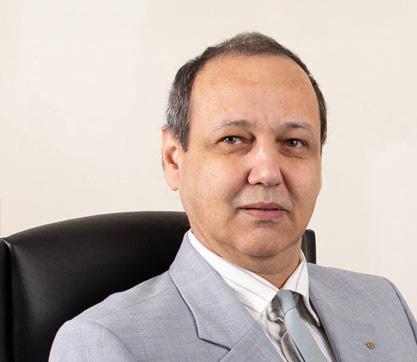
What keeps international operators and ship owners coming back to IBL is the efficiency in which tasks are handled as well as the sense of trust and confidence we inspire. The communication is clear, the delivery is on time, and the service portfolio is wide.
“My vision is for us to offer a different service than our competitors,” smiles Perrier. “We don’t want to make quick money – we want to build a relationship of trust with our principals. Maybe this is not the best way to go about business for instant financial success, but we believe
there will be long-term benefits. The management team is all on the same wavelength and we understand the risks and benefits in this industry.
“IBL is a structured company – it is not a one man show,” he adds. “We have a very strict code of ethics and we are very proud of our standards. There is always room for improvement but, ethically, we believe we are top of the pile. Our rates are affordable and competitive, our staff are well-trained and are always upskilling, we operate transparently – nothing is hidden and there is no side business. We highlight this as a strength because other shipping agencies do not operate to the same standards. Our first priority is our customers and staff, and everything follows the standards set at group level.”
For Rault, provision of a streamlined process is vital. “When a vessel calls in port, we take care of everything,” he says. “We step in, and our knowledge – built on life at sea – provides reassurances to captains.
When you call at a port as a foreign captain, there are so many things to worry about – it can be very stressful. Our role is to make their life as easy as possible – we have been there and we know how to handle it.”
GROWTH STRATEGIES
After a difficult three years rebuilding the business through the Covid pandemic, IBL Shipping is steaming onward with fresh ESG strategies and regional growth aspirations. The team of 30 will likely grow and Perrier is keen on boosting the multimillion-dollar turnover, reinforcing IBL Shipping’s status within the group.
“Until 2019, our growth was on a perfect track,” he remembers. “Then there was a bit of a slowdown through the Covid period as borders were closed. Ships could come to Mauritius – we are an island and we need to import/export mainly by seaways - but business declined. We did have support from the group and there was no
IBL SHIPPING www.enterprise-africa.net / 53
Capt. Thierry Perrier, General Manager
INDUSTRY FOCUS: LOGISTICS
eco-speed, the being on time to avoid waiting at ports, keeping the ship’s underwater hull free of marine growths so as to reduce friction and reduce bunker fuel consumption – there is an extensive programme in place to reduce our carbon footprint. We have also had a Ballast Water Treatment System installed on ships and we keep up to the highest standards in this respect.”
CONSTANTLY ADAPTING
Working to the highest standards in an industry that moves so quickly is like a battle against the tide. Fresh challenges and hurdles come each day, and for Mauritius – where coastal waters are prone to tropical cyclones – ships coming into Port Louis need reliable support.
This is where IBL Shipping’s vast network of partners, suppliers, and collaborators comes into play and helps the business to go above and beyond to deliver, while remaining within the strict code of ethics established across the group.
disruption in our service. Since mid2022, all restrictions were eased and business is picking up again strongly.
“In shipping, we are going regional and growing to offer port agency services in Reunion, the Seychelles, and Madagascar. We are also reorganising our staff complement to look into other avenues so that we are not only concentrated on ship owning and management and agency services. We are developing a survey business and we are looking at many other facets of the shipping industry.”
Expansion across new territories will help the company to build a presence in the region that few others could match. Already known for provision of logistics support in containers and maritime products, the company could further strengthen its position on a route that is popular for oil, iron, coal, rubber, and tea. The Indian Ocean Trade Route still brings life and prosperity to island
nations, and IBL Shipping is keen to further that success while protecting the environment. The IBL Group cites its purpose as ‘creating a brighter, more sustainable world’ and this ambition flows into IBL Shipping, especially though the group’s seafood operations where 110,000 tonnes of tuna is processed annually.

“We are governed by our group and head office and they are focused heavily on reductions in carbon footprint and sustainability initiatives,” says Rault. “At group level, there is some certification imminent around ESG in this regard, and it is essential. In the tuna business, plans are being rolled out to capture methane and use for energy production – nothing goes to waste.”
Perrier adds that IBL Shipping has implemented a ship energy efficiency management plan which is now mandatory across all conventionsize commercial vessels trading internationally. “That means steaming at
“We have to interface a lot with different service providers because we work in the space between ship and owner and local authorities. We have to maintain strong contact with our partners and suppliers, and we undertake a lot of screening to ensure we partner with reputable companies with high ethical standards. There is a long list of things required to keep a vessel safe at sea,” says Rault.
Membership of several global industry bodies is important for IBL Shipping, helping to provide certainty for customers, and ensuring the company stays at the front of the pack.
Memberships of the APAMM (Association Professionnelle des Agents Maritimes Mauriciens), PUC (Port Users Council), MULTIPORT, and BIMCO, as well as its TRACE certification allow IBL Shipping to embrace the industry with confidence, innovation and forward-thinking.
“Ship owning and management means you have to constantly adapt
54 / www.enterprise-africa.net
important. This part of the world, and this route, is set to become more popular for shipping and leisure, and the industry requires fresh skills. A dynamic environment where loyalty is rewarded, IBL Shipping provides everything required for employees and clients to thrive.
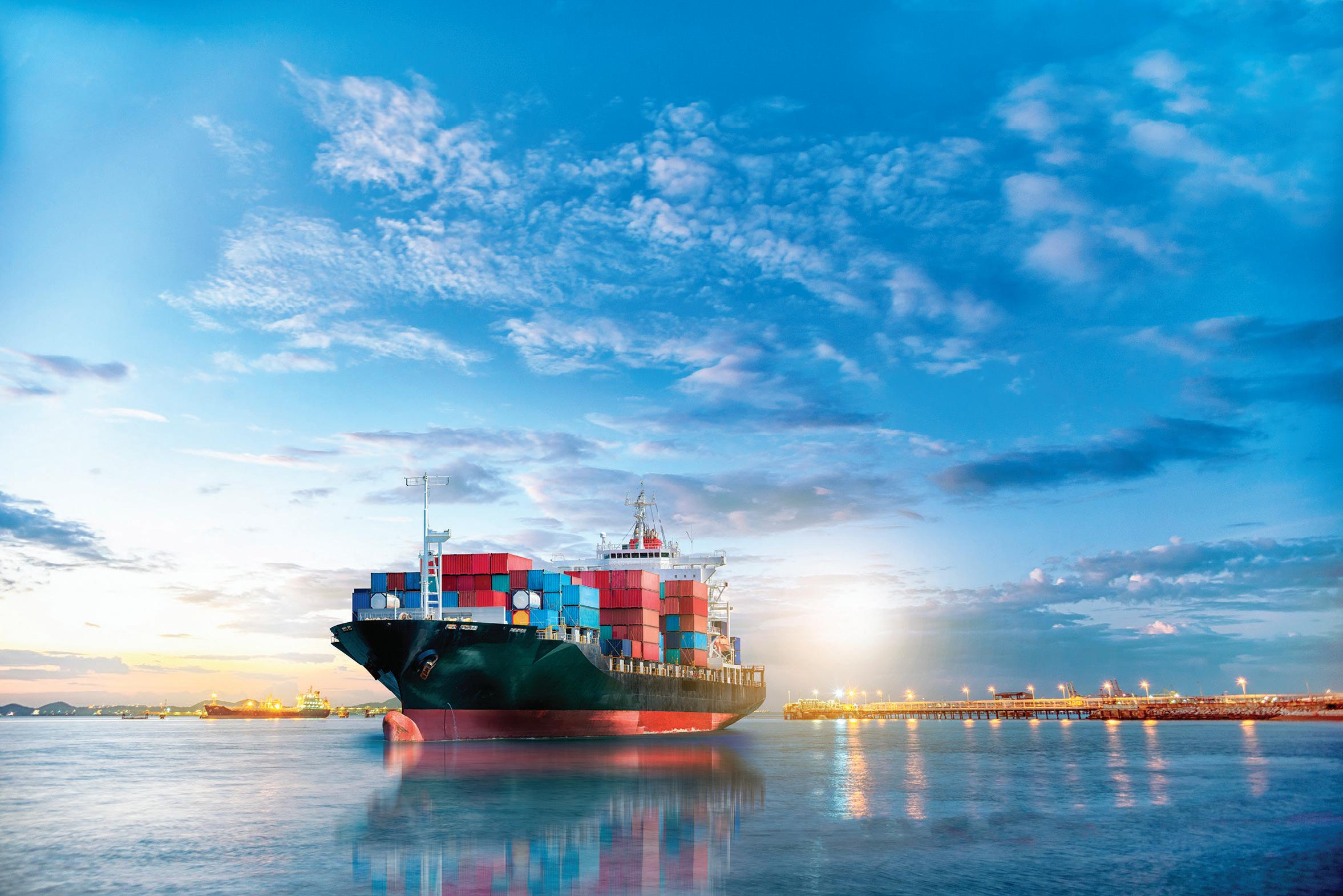
“IBL has given a lot to me and I have always tried to give as much as possible back. There have been many changes in the business environment that we have had to adapt and change around. We have managed through transitions well and that has been something I am proud of,” concludes Perrier.
The company will continue to search for new opportunities to grow alongside the group, always navigating with its ethical and moral compass. For all entering Port Louis, IBL Shipping is the perfect partner.
www.enterprise-africa.net / 55
C M Y CM MY CY CMY K WWW.IBLSHIPPING.COM
KING SHAKA AIRPORT (ACSA)
Connecting People, Places, Dreams & Opportunities
King Shaka International Airport, part of Airports Company South Africa, is busy rebuilding following a muti-faceted period of extreme challenge. Following an ambitious national strategy for growth, Regional General Manager for KwaZulu Natal and the Eastern Cape, Nkosinathi Myataza is confident about connecting the airport to wider community and economy to drive prosperity whether that is through transport, development, or other vital areas.
South Africans are not flying as much as they could.
Freight and cargo suitable for air transport remains on the road. It’s a large problem that is part of a wider economic challenge in the country with a landmass of more than 1.2 million km2. Why is a relatively advanced economy, with a challenged road network – the 24th largest
country in the world – struggling to get people into the air? According to Nkosinathi Myataza, Regional GM at Airports Company South Africa (ACSA), infrastructural challenges, public transport access to airports, cost of flying, and lacking cohesion between regional airports is part of the problem.

His responsibility is the following ACSA airports: King Shaka International
Airport in Durban, Chief Dawid Stuurman Airport in Gqeberha and King Phalo Airport in East London. Key drivers of economic activity, the country’s airports have the ability to reshape prospects in South Africa. ACSA has set a number of plans in motion to utilise airports and air travel for economic benefit, and in the post-pandemic environment
PRODUCTION: James Davey
56 / www.enterprise-africa.net
//
 Nkosinathi Myataza, Regional GM Airports Company South Africa (ACSA)
Nkosinathi Myataza, Regional GM Airports Company South Africa (ACSA)
INDUSTRY FOCUS: INFRASTRUCTURE
where challenges are exacerbated, it is important to get things right.
“The majority of South Africans are not exposed to the air economy. Just 10% of people are flying,” he says. “The majority, who want to move between Durban and Johannesburg, are driving.”
A one-way ticket on this just-over one hour flight can cost an estimate of R475. Even though this is seen as a fair price, when combined with infrastructural issues, it becomes out of reach for many. Myataza highlights the community of Umlazi, south of Durban. Close to the site of Durban’s former international airport, this town is now around 60km from King Shaka International Airport (opened in 2010). “If you have to hire a car or get public transport to the airport, it will cost around the same as the flight to Johannesburg. In total, this represents a large percentage of a monthly income. If we don’t make public access to the airport more available and cheaper, we will not fill seats on planes.”
ROUTE DEVELOPMENT
The way to drive cost down is to develop routes. By increasing capacity and competition, prices will naturally fall for consumers as businesses look to buy into the market. But there must be a business case to attract airlines. Currently, Lift, CemAir, SAA, Airlink and Flysafair are the only mainstream airlines to make the domestic journey. By investing in airports and marketing correctly, ACSA hopes that the region can become more appealing from a commercial perspective, driving down costs in the long-term.
Myataza says that marketing is important here. “There is a misconception that flying is always more expensive and this is why marketing is significant. For example, when you look at driving from Durban to Johannesburg, when you calculate the tolls, fuel, and time, it can be more costly than flying – especially with no-frills, low-cost airlines.
“Development is essential – we
must entice airlines to fly specific routes. The more seats become available, the more the cost becomes competitive. Between Durban and East London there is one flight in a day. Everybody who doesn’t want to drive must take that flight, and that takes up the price. If we develop that route and display a case for a win-win situation for passengers, airlines, and airports, then capacity will increase and we will enable more people to fly.”
An engineer and management professional, with vast experience in the sector, Myataza takes care of ACSA’s Cluster Three. The country was split into regional clusters in a post-covid restructure to ensure that each airport is fulfilling a leading role within the community that it operates.
“We are now consolidating regions by building clusters around the three main international airports in South Africa – OR Tambo, Cape Town, and King Shaka. Cluster one, around OR Tambo, includes Bram Fischer Airport

58 / www.enterprise-africa.net
in Bloemfontein. Cluster Two is around Cape Town and includes George, Kimberley, and Upington. Cluster Three is centred around King Shaka with Chief Dawid Stuurman International, King Phalo, and we manage Richards Bay Airport on a five-year contract with the uMhlathuze Local Municipality.”
Developing airports and creating an appealing environment for airlines is a strong priority for ACSA, and thankfully where the vast skills of the company are deployed.

As a state-owned company, ACSA has a developmental mandate around socio-economic transformation while protecting the environment and contributing in building a South Africa that is a capable, ethical and a developmental state. “To do that, we must demonstrate commercial viability, through both aeronautical and non-aeronautical revenue generation. We cannot just be developmental at all costs, we must make money, which in turn will drive the development.” explains Myataza, reminding of the fact that airline routes are big consumers of fuel and
salaries, but each aircraft that touches down brings fresh opportunities.
One priority is to bring back more international tourists, much of which fell away throughout the lockdown periods across 2020 and 2021. Through Durban Direct, a special provincial routes development committee dedicated to bringing in direct flights to King Shaka International Airport, domestic and international connectivity to the province has been gradually restored. Similar airlift initiatives are taking route across the cluster and nationally.
“The committee consisting of Dube Tradeport, ACSA, Invest Durban, Trade and Investment KZN, Tourism KZN, Durban Tourism and the provincially through the Department of Economic Development, Tourism and Environmental Affairs, among others, have done a lot to recover traffic.
“The routes from Durban to Heathrow and Durban into Namibia were popular pre Covid, but they went down and did not come back.
“However, internationally, we have regained Qatar, Emirates, and Turkish Airlines, and recent capacity added from
Proflight Zambia – flying direct flights between Durban and Zambia. We also celebrate the enhanced connectivity with the inaugural launch of Royal Eswatini Airways. Our collaborative efforts have seen significant inroads in boosting tourism, we trust that this will lead to full recovery to prepandemic levels,” details Myataza.
He adds that discussions are underway with agencies in the USA who are hoping to spread arrivals across the three clusters allowing American travellers a wider number of options in Africa. “They noticed that most US travel is to OR Tambo and Cape Town, but the OR Tambo numbers are dropping, and more are arriving in Durban. They are looking at whether we can start discussions with Delta and United and we are working closely to make that happen.”
In the shorter term, ACSA has focused heavily on African partnerships to drive capacity. The company is monitoring tourism and business in several key markets to provide data on how and where to build and develop routes.
www.enterprise-africa.net / 59
KING SHAKA AIRPORT (ACSA)
INDUSTRY FOCUS: INFRASTRUCTURE
“We were looking at Harare in 21/22, and we are looking at Nairobi in 22/23, Addis Ababa in 23/24, and then Kigali. We are also keen on, Gaborone, and Mauritius. We also want to revive the London Heathrow flights from Durban alongside British Airways.”
BRIGHT HORIZONS
From King Shaka, and the other clusters, economic prosperity must flow. This is not a CSR campaign from the airport itself or ACSA - this is mandate from South Africa. To ensure this, ACSA has set horizons which guide its short, medium, and long-term goals, and Myataza describes the plans as sustainable and tactical.
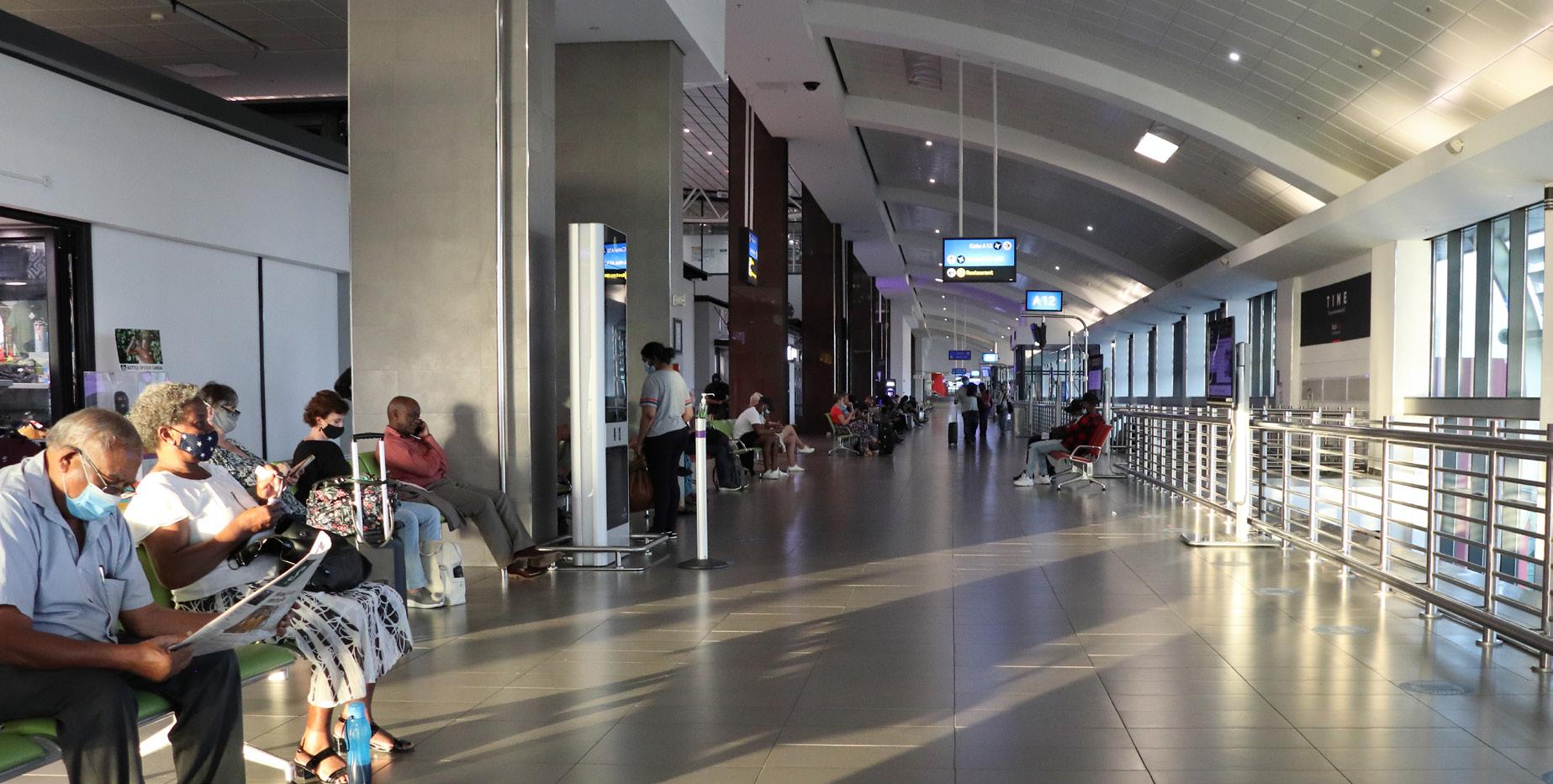
“We set horizon one, up to 2025, to run airports and do what we do, being the best at it. Horizon two, 2025 to 2030, we are looking at developing airports, starting internally in SA, then moving to Africa, then going global. The third horizon is about going forward with innovation. 2030 and beyond is about growing our footprint and going forward to where we want to be. Those three horizons
will overlap as business improves, and opportunities avail themselves.”
In the current phase, he hopes to link the airports in his cluster like never before, not only with each other but by integrating with road and rail, and focusing on cargo as well as passengers, to deliver an allencompassing offering for the economy.
“We run airports – we have that skill and intend to build that skills base further,” he confirms. “How we can link these with other areas, especially Social Economic Zones (SEZs) at Richards Bay, Dube Tradeport, East London, and Ngqurha in Gqeberha is critical. We are also in discussion with Mkuze Airport which is strategically located close to game reserves and other tourism assets in the KwaZulu Natal region. It would take away the need for people to fly to OR Tambo and then drive to Mpumalanga. We are also keen on developing Newcastle Airport where a lot of cargo remains on roads – there is a lot of congestion, accidents, and security risks. We want to work in partnership with SANRAL and Transnet, as guided by the National
Department of Transport among others, to understand what should be on the rail, what should be on the road, and what could move to the air. An integrated approach is essential and will relieve pressure on the roads where the number of trucks is not sustainable.”
In KwaZulu Natal and the Eastern Cape, there are several smaller, regional airports and airstrips that feed into the bigger picture. By developing these sites, ACSA can help to build deep value chains and lasting bonds in areas where commercial activity is much needed.
“Regional airports cannot be characterised only by the level of traffic they have or their hierarchical position in the airport network. They must be measured on the contribution they have in the regional economy,” Myataza reiterates.
“We are looking at the Eastern Seaboard and how we can further complement connectivity of the areas with others by air. The infrastructure is challenged, and there are clear opportunities so we as ACSA need
Continues on page 62
60 / www.enterprise-africa.net
WE HAVE REVOLUTIONISED ROAD ASSET MANAGEMENT
Our innovative solution enables informed road maintenance decisions that enhances road lifespan, saving time, money and lives
INTELLIGENT SAFETY ASSESSMENT VEHICLE
ISAVE PROVIDES YOU CUTTING-EDGE DEVELOPMENT IN FRICTION AND INTER-RELATED PAVEMENT MEASUREMENTS USING SIDEWAYS FORCE COEFFICIENT (SFC) ASSEMBLY WHICH MEASURES THE FRICTION OF THE ROAD SURFACE IN THE WHEEL PATHS.

Works continuously at traffic speeds, with an operating speed range of at least 50 to 80 km/h
Friction measurement in both wheel paths simultaneously
Saving Time , Money and Lives
Contact
us for more information ARRBSYSTEMS.COM
iSAVE
INDUSTRY FOCUS: INFRASTRUCTURE
to understand what is viable in areas such as Port St Johns, Port Edward, Margate, and Mthatha.”
As part of the first horizon in ACSA’s long-term strategy, the running of key airports will help to support further outreach and rollout as Horizon Two comes around in 18-months’ time. Making airports nodes of activity and not just locations where people fly to and from is important. Adapting the wider ACSA business to take advantage of digital opportunities will also help with cost reduction, efficiency, and ease of doing business, not just digitising for the sake of it. The destination of all of the various strategy and initiatives is a globally recognised business that has an impact on the lives of everyone it touches. Sky high thinking? According to Myataza, it is all very achievable.
“While we have these strategies, we are also not oblivious to the challenges and emerging risks around us, these range from global developments including apparent realignment and
repolarization of geo-politics, right up to our own local risks like insecurity of utilities, notable power and water, skills deficit, lacking social wage and other key country risks. Our risk response is focussed not on only mitigating these risks, but also identifying opportunities that could present themselves to develop and grow the industry and integrate the efforts with others for a better country and better continent.
“If you look back in centuries, cities used to grow around railway stations, highways, and sea-ports, but we are now moving towards air transport and that is where modern cities thrive,” he says.
“Everything we do is grounded in our vision and mission, guided by a set of values – PRIDE. P is passion, R
is results, I is integrity, D is diversity, and E is for excellence is everything we do, and bound by ethics.
“Our value proposition is simple – we connect people with people, people with places, people with dreams, and people with opportunities.
“With this always front of mind,” he says, “everything we aim for quickly becomes realistic.”
COVID RECOVERY
The work at King Shaka, and across the country through ACSA, will be vital in restoring South Africa as a leading tourism destination of the continent and the world. 42 million flights moved around the world in 2019. The pandemic slashed these figures by 60% in 2020 and 49% in 2021. In the South African economy, the air transport industry, including airlines and its supply chain, supports R100 billions of GDP. Spending by foreign tourists supports a further R75 billion of the country’s GDP. Recovery from the pandemic downturn is vital, and this is why ACSA and its airports have planned a journey forward meticulously.

“In 2021/22, we had an increase of 41.9% in Durban, 60.3% in East London, and 44.6% in P.E. In 2022, the landings continued, and this year, we have seen a great improvement. Most of the recovery has been riding on the back of domestic flights. King Shaka, recovery has been slower when compared to OR Tambo or Cape Town – 78% and 54% domestics and international respectively,” explains Myataza.
He adds that the pandemic was part of a wider difficult situation that impacted Durban and the cluster unlike any other.
“The KZN economy had a triple
62 / www.enterprise-africa.net
Continued from page 60
// WE SEE OURSELVES AS ENGINES OF ECONOMIC DEVELOPMENT AND INTEGRATORS OF ECONOMIC OPPORTUNITIES. WE SEE AIRPORT ECONOMIES THAT CONNECT PEOPLE AS THE FUTURE //
whammy impact – Covid, social unrest, and floods. We started during the floods – while we had a lot of damage at the airports – to go to communities with aid and we started to revive community projects as quickly as possible. We provide computers to schools, and we build science facilities – we have to ensure schools recover as quickly as possible and despite us not having the finances, we made sure we were part of the recovery of the province.
“What compounded the slow recovery, alongside social unrest and flooding, was the liquidation of the group that owned Kulula. We lost 35% of the market between airports in our cluster. There was not enough capacity to fill seats and that is why our growth has been behind the others. We have had FlySafair, Lift Air, and CemAir come into the market, and that has helped us on the road to recovery.”
The Covid impact was dramatic. In the first year, ACSA lost R2 billion. In 2021, the loss was R1 billion. “A lot of activities and initiatives were put in place just to survive – many airports were going under and we tried to do everything to look after employees,” says Myataza.
Importantly, the company survived without a bailout thanks to its mitigating measures, resilient and dedicated people and processes, and strong underlying culture of sustainability. Diversifying operations, partnering with intermodal collaborators, ensuring efficiency, and increasing numbers will come as the ACSA strategy plays out.
“We see ourselves as engines of economic development and integrators of economic opportunities,” says Myataza. “We see airport economies that connect people as the future.”

DIRECT DURBAN DEVELOPMENT
For tourists, Durban has the weather, beaches, commerce, and bright South African welcome. For business, King Shaka International is open to all opportunities. Its position and facilities
are world-class, and the growing connectivity with regional hubs will only further appeal to local businesses. As the gateway to Africa, and the most advanced economy on the continent, there is no doubt that South Africa and Durban will continue to thrive economically from an accessible and modern airport network.
“For KZN, pre Covid, we had a R1.6 billion impact on the economy, directly and indirectly supporting 3177 jobs – a 0.2% contribution to provincial employment. In the Eastern Cape, our contribution was R4.4 billion, with 10,038 jobs supported and a 0.8% contribution to provincial employment. Covid then hit and the environment changed quickly,” says Myataza, aiming for a return and improvement on these contributions.
Despite much turbulence, operating against a challenged economic backdrop, King Shaka International Airport continues to
build resilience and sustainability in its community, based on the national strategy in place at ACSA. Few others around the world could demonstrate ability to battle through such harsh conditions, and this places the company in a strong position when it looks to the long-term horizon.
“Our vision is to be the most sought-after partner in the world for the provision of airport management solutions by 2030. That in itself says that our focus is not just South and southern Africa, but we want to position ourselves as a global entity in the next seven years. Our mission is to acquire, develop, and manage world-class airports and businesses for the benefit of all of our stakeholders, for the socio-economic development of South Africa,” concludes Myataza.
KING SHAKA AIRPORT (ACSA) www.enterprise-africa.net / 63
KINGSHAKAINTERNATIONAL.CO.ZA
Traveller Confidence and Demand Continue to Skyrocket
Speaking with Enterprise Africa last year, BidTravel CEO Lidia de Olim Folli was buoyant about the prospect of a return to pre-Covid levels of travellers and re-establishing South Africa as a premium tourist destination. While there have been obstacles to overcome in the interim, the assessment is overwhelmingly positive as both arrivals and departures ramp back up and renewed confidence allows the industry to take off once again.

BIDTRAVEL
PRODUCTION: Jamie Waters
64 / www.enterprise-africa.net
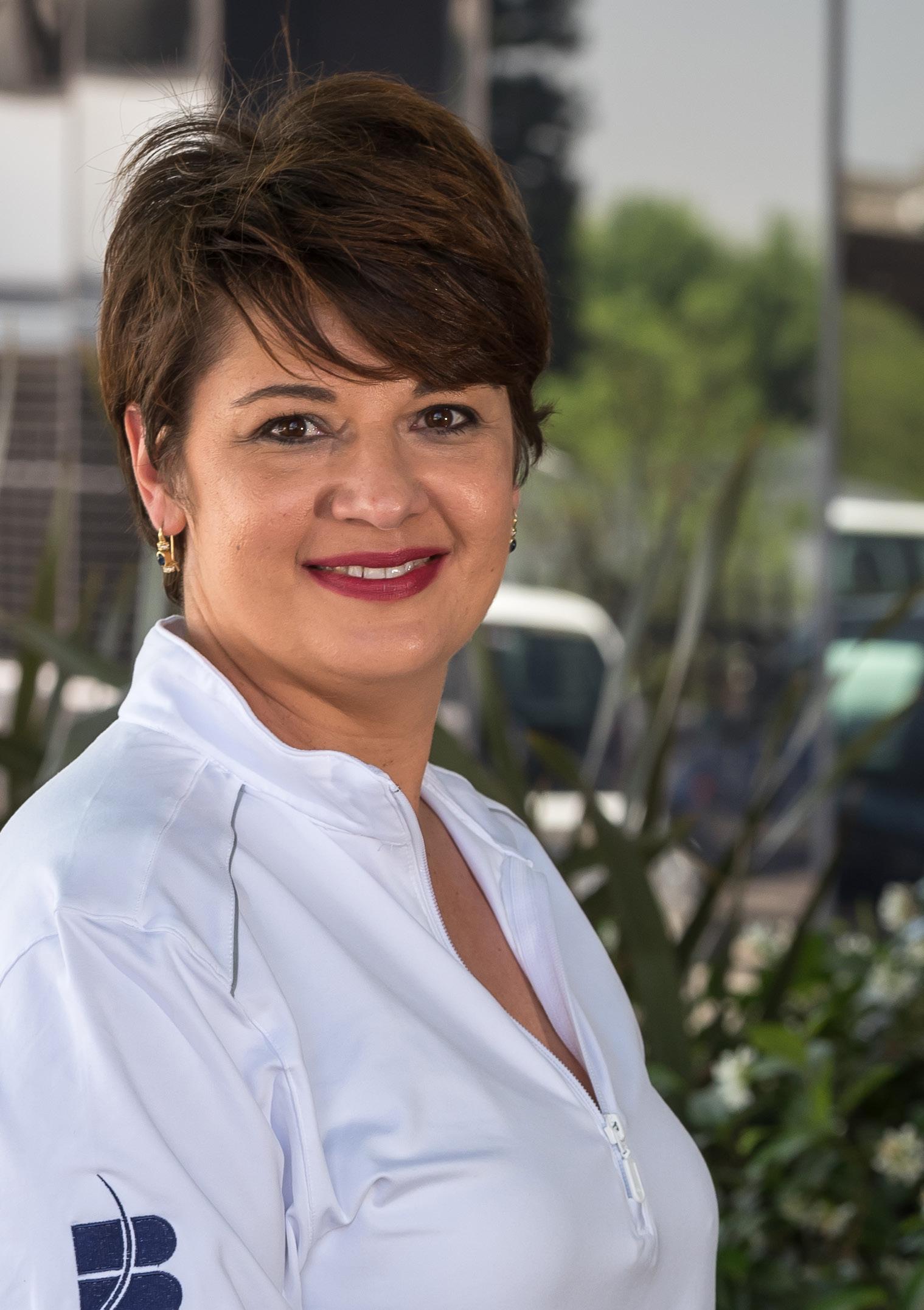 Lidia de Olim Folli, CEO
Lidia de Olim Folli, CEO
INDUSTRY FOCUS: TOURISM
//A proudly Bidvest company, BidTravel, through its 11 companies, provides industry-leading travel management services to corporate businesses and leisure travellers through an extensive local, regional, international, and online network.
The return of Chinese tourists to Africa combined with a full resumption of operations on international routes by African airlines are the latest indicators of a rebounding tourism industry decimated by the Covid-19 pandemic two years ago. In February China picked three African countries—Egypt, Kenya, and South Africa—among 20 across the globe
for piloting outbound group tours, with the United Nations World Travel Organisation’s latest World Tourism Barometer confirming that would push Africa’s international arrival numbers back to 2019 levels.
“We are upbeat as all indications are that our tourism sector is on a fast highway to recovery,” was the take of South Africa’s Tourism Minister, Lindiwe Sisulu as the country’s arrivals from

January to October 2022 were recorded at 4.5 million, with the international tourism boom looking even brighter in 2023 due to the resumption of entire operations and re-introduction of higher capacity aircraft on African routes.
BUOYANT RETURN
“Things are going well, and we have certainly seen travellers returning in their droves,” agrees BidTravel
66 / www.enterprise-africa.net
// WE ARE NOW BACK IN A POSITION WHERE WE CAN BEGIN TO LOOK AT EXPLORING AREAS IN WHICH WE DO NOT CURRENTLY OPERATE IN THE TRAVEL ENVIRONMENT //
CEO Lidia de Olim Folli. “South Africa came off most countries’ lists in around late April or early May22, after which things absolutely skyrocketed. The consequence of this, though, was that airports internationally were unable to handle all such a sudden increase and this severely dented our ability to return to a pre-Covid normal.
“It has been extremely buoyant, however, to the extent that capacity has been available. We have found that our premium cabins have been the first to sell out, interestingly, with economy class seats remaining, and this was very pleasing to see.”

De Olim Folli puts this rush, and desire for a more luxurious experience, down to the sheer exhaustion universally felt from the endless online calls and meetings of the epoch and the abject removal of face-to-face interaction, causing people to dash back at the first opportunity to begin to reclaim some semblance of normality.
“Both domestically and
BIDTRAVEL www.enterprise-africa.net / 67
INTRODUCING CAR WHERE U ARE

internationally, air capacity and flight availability were still down at the end of 2022 compared to the 2019 numbers,” she qualifies. “But we have nonetheless seen a good return and increase in travellers with the removal of lockdowns and air travel returning. One of our local airlines, which accounted for around 30% of the entire seat capacity in
South Africa, fell into liquidation last June, and while some competitors did start adding capacity it was not until later, in October or November, so we do not have a like-for-like picture domestically.

“Realistically, though, we have recovered to a point we would be happy to have reached had we been at maximum capacity throughout.

“We are now back in a position where we can begin to look at exploring areas in which we do not currently operate in the travel environment - perhaps by way of an acquisition,” de Olim Folli outlines of Bidvest’s imminent intentions for its travel arm. “I cannot say that I have identified anything concrete as yet, but at least we do have the scope now that the industry has come back, and there

will be opportunities out there.
“When we do decide to grow in a certain sphere of travel there is now access to these new environments.”
LESSONS LEARNED
This contrasts markedly with the approach of just last year, which was very much concerned with hunkering down and building up the defences to protect the various facets of the business. “We were very much focussed solely on our own internal recovery,” de Olim Folli stipulates, “and now that we can see that everything has opened up around us we are keeping our eyes and ears open to what is out there in the near future.”
There have been valuable lessons learned from the turmoil of recent years, de Olim
shares.

INDUSTRY
TOURISM 68 / www.enterprise-africa.net
FOCUS:
Folli
// WE FEEL MUCH RICHER IN A BUSINESS PRACTICE SENSE FOR HAVING LEARNED THESE VALUABLE LESSONS //
The long-term rental agreement for your vehicle Available to South Africans exclusively & ideal for individuals and businesses. To find out more about the Car Where U Are offering, visit: avis.co.za or scan here: Terms & Conditions Apply No bills for airport parking No maintenance costs to worry about No finance settlement No insurance payments No annual relicensing No cancellation or early termination penalties Enjoy the benefits of vehicle renting: Limpopo Northern Cape Eastern Cape Kwazulu-Natal Mpumalanga Western Cape Free State North West Gauteng Have a car to drive, wherever you are in South Africa, without the hassle of financing and maintaining a vehicle of your own. You can even upgrade your vehicle when needed. Put simply, it’s the perfect substitute for vehicle ownership.
“For the last two years we have zeroed in on how to trim down,” she explains, “but our takeaway from having volumes increase again as quickly as they did is the realisation that in order to grow really quickly, there are a number of moving parts to be aware of.
“It is imperative to ensure that not only are we scaling up those operating on the front end, such as revenue generators and travel experts, but that every aspect of the business receives similar attention in order to support them - increasing administrative, IT and HR resources, for example, to ensure that we meet clients’ expectations based on their historic experiences with us. It takes much longer, and far more resources, to onboard people en-masse, and we feel much richer in a business practice sense for having learned the valuable lessons that have come from these situations and circumstances.”
As the hospitality sector in its entirety has regained its popularity and, subsequently, familiarly chaotic nature, holes are being uncovered where senior, skilled individuals have been forced to move out of the industry and source alternative forms of employment when the world shut down. “It has been difficult to recruit everybody back,” de Olim Folli admits, “and those that had worked in the industry for a long time possibly felt slightly burnt because we had to shut down so quickly.
They have then had experience in other sectors where they were able to then chose direction.”
It has lent to the upskilling and training of people, highlighted by de Olim Folli as critical when speaking with Enterprise Africa last year, a whole new level of importance. “We recognise that we are simply never going to claw back some of that skill,” she accepts, “but we are continuing to invest strongly internally in order to upskill and ameliorate our personnel.”
Tourism has long been known to be a key part of the South African economy, and all of BidTravel’s many constituent parts are thriving and performing strongly on the bounce back of the last year, de Olim Folli concludes.
“As economic pressures back home ease, in significant markets for us like the EU and the UK, and the likes of China continue to open up, it can only help us to welcome tourists back to southern Africa and make the world accessible again to South Africans.”
BIDTRAVEL www.enterprise-africa.net / 69 WWW.BIDTRAVEL.CO.ZA
NAMIBIA WINDHOEK BOTSWANA GABORONE MOZAMBIQUE MAPUTO SOUTH AFRICA GAUTENG S OUTH AFRICA KWA-ZULU NATAL S OUTH AFRICA FREE STATE SOUTH AFRICA WESTERN CAPE S OUTH AFRICA EASTERN CAPE www.clhg.com
Work or play, we have you covered in Southern Africa all the way!
// WE ARE CONTINUING TO INVEST STRONGLY INTERNALLY IN ORDER TO UPSKILL AND AMELIORATE OUR PERSONNEL //
NOMAD AFRICA TOURS & SAFARIS
Nomad Team Keeps the Dream Alive for Real African Tourism
After working hard to ensure the brand remained viable through the toughest of challenges that was the pandemic, Nomad Africa Tours & Safaris is again taking tourists across the continent, to real Africa, to understand all that is awaiting off the beaten track. It has been a business challenge like no other, but Owner Alex Rutherford has managed to rebuild and recoup as the market returns and the outlook becomes more promising. He talks to Enterprise Africa about the challenges in tourism in the post-pandemic world.
 PRODUCTION: Jamie Waters
PRODUCTION: Jamie Waters
70 / www.enterprise-africa.net
 Alex Rutherford, Founder and Owner
Alex Rutherford, Founder and Owner
FOCUS: TOURISM
The race is on in southern Africa’s tourism game. Once a darling of the region, with millions of foreign visitors flooding in to witness Africa’s beauty first hand, the Covid-19 pandemic slammed the doors shut. International visitors were forced to stay away, and even if they could have touched down in SA, tours around the region halted with borders to neighbouring countries closed.
14.8 million people entered South Africa in 2019. Just 3.9 million arrived in 2020. Inbound tourism expenditure tumbled by more than 70% and domestic tourism spend fell by almost 33%. The tourism contribution to South Africa’s economy fell from
3.9% to 2.2%, and more than 320,000 jobs were shed by the industry.
To be active in the space was very hard. “We took a thrashing, it was total decimation,” says Alex Rutherford, Owner of Nomad Africa Tours and Safaris.
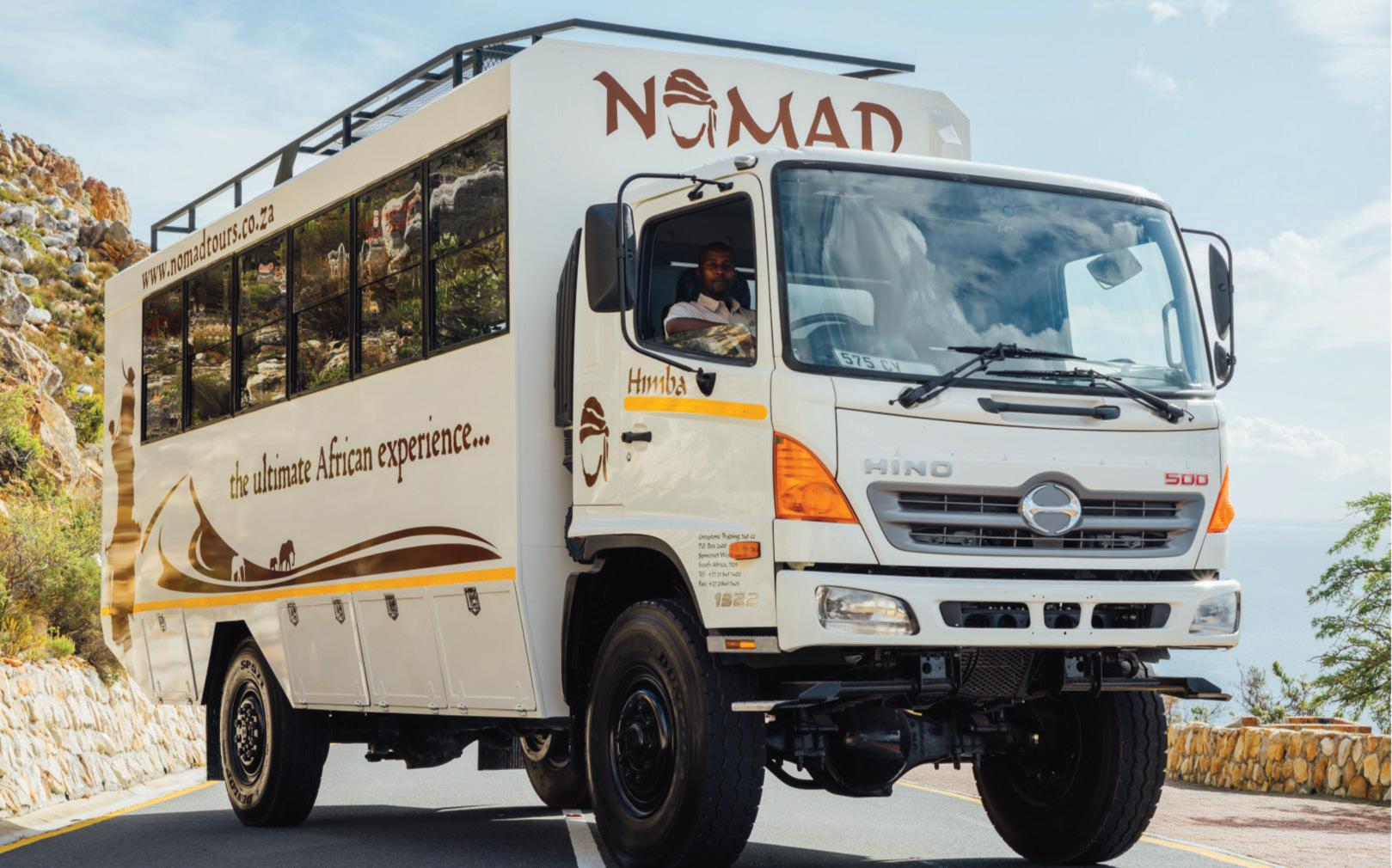
Back in 2019, he told Enterprise Africa that the company was buoyant in a booming sector as access to South Africa and Africa was better than ever before. He was planning new routes, and helping to ensure that money was not a determining factor around who could experience Africa in all of its glory. By ensuring fair pricing, everyone from anywhere could talk to Nomad about travel in Africa.
But now there is a fresh challenge – restoring the company as a leader in the industry, rightsizing to meet the needs of a new niche. Thankfully, Rutherford has spent half of his life building the company and has taken knocks in the past. If anyone can rebuild, it’s the Nomad team.
SIMPLY IMPOSSIBLE
“We stopped operating mid-March 2020 – we work cross border and so it was simply impossible. We didn’t run a single person for 18 months,” he remembers, highlighting the fact that the company kept senior people and paid staff for as long as was possible, while refunding all customers at the same time. “We were essentially in the red for three years. We had to crowdfund, we had to sell assets, we had to scratch and scrape.” However, in every crisis there is opportunity. The hard work the company put in during the darkest
72 / www.enterprise-africa.net //
INDUSTRY
// AROUND 25-30% OF OUR BUSINESS IS REPEAT – A HUGE AMOUNT OF PEOPLE COME BACK TO US AND THAT IS GREAT //
of times allowed the brand to thrive. Employees, suppliers, partners, and stakeholders recognised the genuine and sincere approach taken by Nomad. The result? As soon as movement returned in early 2021, Nomad was top of mind. The company was able to deliver memorable experiences, and word-of-mouth spread – while others remained closed or grappling for fast turnaround, Nomad is ready to roll.
“The last six months have shown a good steady improvement – but nowhere near pre-Covid. We had to reduce our capacity and drop our fleet by 60% so we cannot offer what we used to. But, there has been an exponential climb. There is less availability from competitors so we are in a strong position,” Rutherford details.
“Others mothballed and they were not available – you could not phone the office. We stayed open, we kept in touch, and we kept up our outreach. That has stood us in fantastic stead as faith in the brand has gone through the roof.”
Today, the company has 30 people at head office, and 60 guides in the field. Nomad staff are experts in African travel. Taking guests anywhere and everywhere, from Cape Town to Kampala, and Kamanjab to Praia do Tofo, Rutherford is certain that the team is the best.

“The quality of the people I have with me is the strongest in the world in terms of our industry,” he states. “The collective knowledge and experience is remarkable. Our team knows every bump in every road in sub-Saharan Africa. They are not office consultants, and utilising their skills is exciting. My people can tell you the name of the shop on the corner of the road in the middle of nowhere – because they have been there. They can talk honestly about any concerns people have around malaria or drinking water or whatever it might be.”
The majority of the team have been with Nomad for more than a decade, and they are happy to share their experience with new
faces as the company progresses.
“The next 12 months is about monitoring it – is this a surge or is this the new position? We need to understand what we’re doing and if it is stable before we plan to grow again. Getting back to full swing is important and our team will drive that. We have to make sure the tours run to the standard we expect and we are getting back to being a well-oiled machine.”
STRONGER THAN THE REST
Nomad offers three key service lines: Scheduled tours which are Nomad branded; group tours, which is like a charter department run under other brands; and the tailor-made tour department for smaller groups or families.
Traditional tours load up into a purpose-built Nomad vehicle and travel by road to campsites, lodges,
and hotels, taking in ‘real Africa’. The concept behind the company comes from Rutherfords on frustrations travelling across the continent. He completed a trans Africa trip and found it incredibly difficult to organise, with many failings from companies along the way. “I knew it could be done better, and I established Nomad in 1997.”
He says that the number of departure dates provides real flexibility for customers, and this is a differentiator. “Our strength is that we have a unique system with great logistics – very few other companies do it – we can run camping and accommodate tours at the same time. We have partnerships with lodges and hotels, and we can camp on the same trip. It gives us the ability to provide more flexibility and that gives us more dates. We have the most dates by far. We run the most departures even now, after Covid. At
Our Aim is to provide all clients with the “home away from home” experience, while allowing each individual to feel the luxuries of a perfect getaway and appreciate wildlife at it’s best.
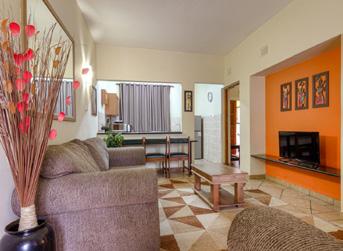
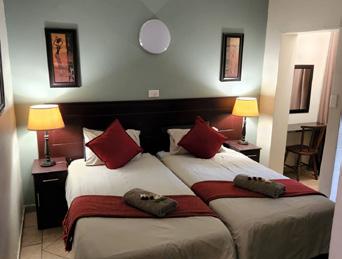

Shonalanga Tours & Safaris +27 (0)35 5901087 info@safariskzn.co.za www.safariskzn.co.za

NOMAD AFRICA TOURS & SAFARIS www.enterprise-africa.net / 73
Shonalanga Lodge +27 (0)35 5901087 shonalanga@stlucia.co.za www.shonalanga.net
INDUSTRY FOCUS: TOURISM
one point, we had more than 100 different tour options that we operated, with 800 departures per year.”

This flexibility alongside a careful focus on competitive pricing ensures strong new and repeat business. Rutherford describes
relationships with clients as ‘powerful’, and he remains confident that the majority will return or recommend.
“Around 25-30% of our business is repeat – a huge amount of people come back to us and that is great. I have people who have completed
10 trips with us. I have people who have toured with us, gone away, and come back with their children.
“We have age on our side. In the past I would have laughed at a comment like that, but we now have 25 years behind us. We are recognised and our ratings are amongst the highest around.
“We have never become corporate. The way we interact with clients is the same as it has been for years – it’s intimate. Our staff come to work in shorts and flip flops – that is great and clients appreciate it.”
BOOMING MARKET?
The expectation from industry bodies, including South African Tourism, is that the sector will thrive in coming years, even against the backdrop of weak economic performance and withering
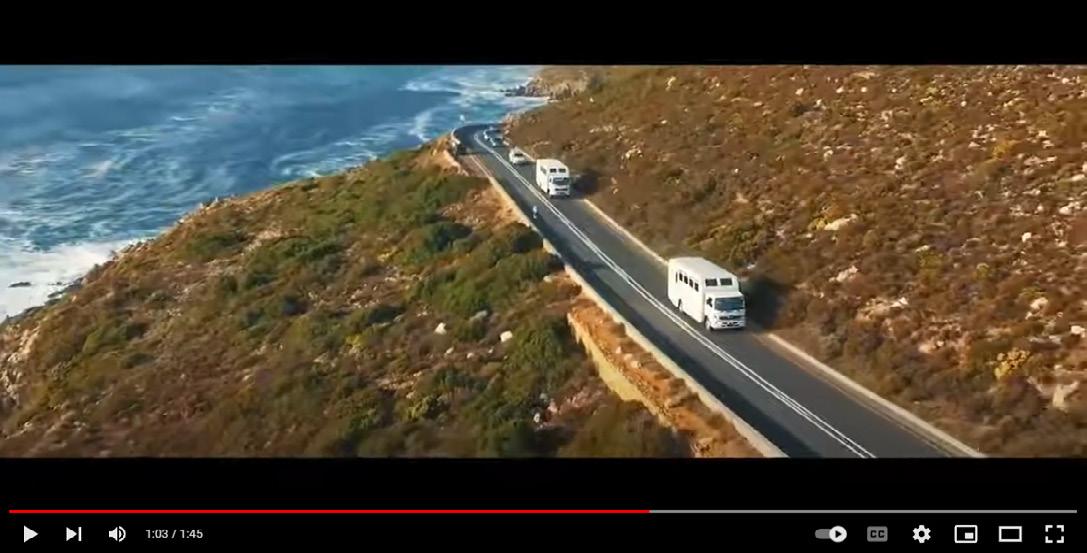
74 / www.enterprise-africa.net
infrastructural conditions locally. In the three months from end of December 22 to March 23, in the Western Cape alone, 167,000 jobs were created and filled as tourists came back to Cape Town and the winelands for the summer weather and affordability. As this rebound continues, quality service provision will be essential to attract travellers.
“Some companies out there are running 20-year-old vehicles. We run it on the basis of cost – as soon as it goes wrong, we get rid and get a new one, and that makes the client experience better,” says Rutherford, highlighting dependability and consistency around quality standards. “Our breakdown average is one per 120,000km. A breakdown for us is if you turn the key and the vehicle doesn’t go – the customer cannot be made to wait. We monitor it religiously and as soon as
info@hausgarnison.com

there are signs, the vehicle must go.
“It’s not the time for major risk,” he adds. “We have noticed that there are changes in the market and we are repositioning to be able to handle that. We are getting more group enquiries because there are less players in the market able to satisfy that demand.”
In 2022, tourist arrivals in SA were 153% higher than 2021. Domestic tourism registered a 100% uptick in the first six months of 2022, but thousands of businesses closed doors. For Nomad and other survivors, the ongoing rebuild will require care and responsibility.
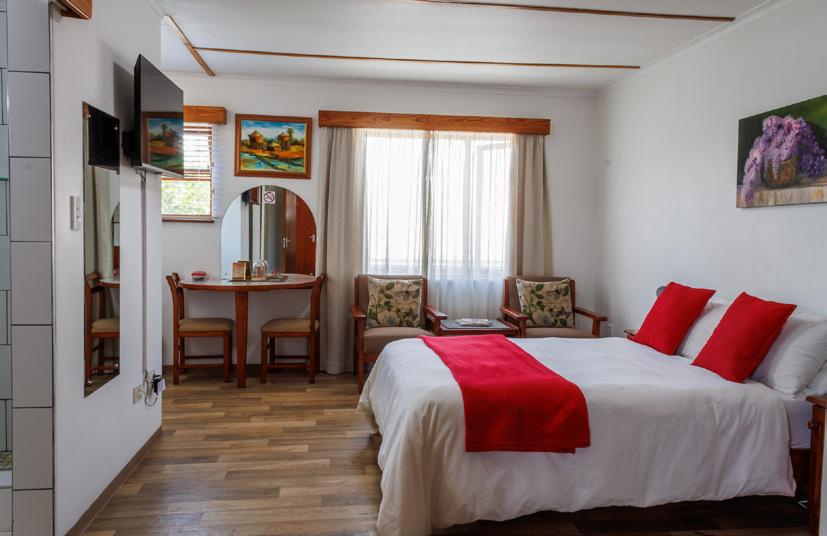

“I now have people going to overseas markets to drive new business – you cannot cut marketing in a sales industry. Often, we are the only ones at these shows, and that is great. We are back in the black and the team is very ambitious,” details Rutherford.
“I will never become a mainstream bus operator. We are trying to get people into unusual, remote places to experience Africa but to do that you have to know what you’re talking about. I have a dream team and it has been built over a long time.”
Nomad’s dream team brings journeys to life. Not just Table Mountain or Kruger Park or Victoria Falls. Booking with Nomad gets you everything in between and presents a chance to do what others simply do not. This part of the world has something for everyone, and this is a business that knows how to show it off.
“Reputation, pricing, availability, and options is what separates us,” Rutherford concludes.
NOMAD AFRICA TOURS & SAFARIS www.enterprise-africa.net / 75
|
+26464403340
WWW.NOMADTOURS.CO.ZA
Haus Garnison Bed & Breakfast was first established in 1994 and is still under the same management. This gives you the peace of mind that your time with us will be comfortable and congenial. With only a short walk to the beach and the centre of town, you can experience the heart of Swakopmund and all its activities with minimal effort. We have 12 newly renovated rooms and can accommodate up to 29 guests. Breakfast is served daily and can be enjoyed in our beautiful garden. We have ample parking for tour buses and offer garages to those guests arriving with their own transport.
PRECIOUS METALS TSWANE
Shining PMT Celebrates Five Years of Success
Setting a fantastic example for the rest of the industry, Precious Metals Tswane is committed to strong corporate governance and ongoing growth. A leading precious metals refinery specialising in the refining of precious metals into their purest form, this business has a farreaching impact and has been expanding consistently since its establishment. Head of finance, Pieter Wiese tells Enterprise Africa more about the company’s unique offering.
 PRODUCTION: Kim Berrystone
PRODUCTION: Kim Berrystone
76 / www.enterprise-africa.net

INDUSTRY FOCUS: MANUFACTURING
//Fine, precious metal is etched in the history of Gauteng. The reason the region is the powerhouse it is today is because of gold. Johannesburg, the City of Gold, sits on the edge of the largest gold deposit in the world. Pretoria is home to some of the richest silver deposits around. And South Africa is well-known for its history in other metals including copper and iron ore.
From these industries comes essential products for life, and items of opulence – jewellery and display pieces that are expensive and sought after around the world. Mining, and foreign earnings from South Africa’s mineral resources, accounted for 38% of export value in 2019. Historically powered by the country’s other extensive resource – coal – mining of precious metals has put the country on the world map.
Now, in a green energy transition,
and a move towards battery and storage projects, new metals are at the forefront of a fresh push. In particular, platinum group metals (PGMs)platinum, palladium, ruthenium, osmium, rhodium, iridium – in which South Africa holds more than 80% of known deposits, are being mined around Rustenburg to the delight of auto, aero, and jewellery makers.

Precious metals and their route from earth to end user are complex. Many work on the process to extract, process, manufacture, and retail, and the industry supports many jobs in South Africa and around the world.
One growing business is Precious Metals Tswane – a refinery and manufacturing business based in Centurion. Independent and focused on refining metals to their purest form, the company is an expert in gold and silver, and is expanding in PGMs. Also a
manufacturer of jewellery and a dealer of gemstones, Precious Metals Tswane has a wide knowledge base around turning rough material pulled from the ground into a highly prized asset.
YOUNG REFINERY
This year, the company celebrates its fifth anniversary, and head of finance, Pieter Wiese, tells Enterprise Africa more about the company’s diverse journey.
“We get metals from carefully selected partner mines who extract from the ground and complete a certain level of processing. We then process further and sell as coins or bars to central banks or similar, or sell on to turn into jewellery or other products for specific demands,” he says.
Key products include refined gold and silver, separated PGMs, alloys, fine jewellery, diamonds, and associated services including
78 / www.enterprise-africa.net
goldsmithing and setting.
“We work with small and mediumsized mines and we deal with a wide range of clients because we refine and manufacture,” says Wiese, adding that the company also buys from registered bulk scrap metal dealers.
“We are a young refinery, but we have four lines of business – receiving precious metals and refining; jewellery design and manufacturing (we manufacture to order, we don’t want to make things and hope people buy them); manufacture of alloys (around 15 types of alloy); and gemstone supply.”
In the exciting jewellery space, Precious Metals Tswane is riding a wave of new demand in the local market. An affluent young population is still attracted to gold, and, in 2019, 51% of gold demand was from the jewellery

PRECIOUS METALS TSWANE
industry. Internationally, China, India, and the USA are the world’s top buyers of jewellery, and industry accounts for a significant portion of demand. But in the jewellery space in South Africa, new trends are combining traditional and modern design to bring a fresh style that is in-demand in Mzansi. A consistently strong bridal market, and a constant perception around gold being a ‘safe haven’ investment – a liquid asset – drives continued purchase of the metal. Precious Metals Tswane manufacturers a range of unbranded items which are offloaded on a wholesale basis to retailers for delivery to consumer.
“It’s all wholesale and we do have a few retail customers,” says Wiese. “In Gauteng, we have 160 clients and we manufacture a lot of product – but
none of it is branded. We don’t take the risk of having products sitting in a showroom waiting to be purchased. We go higher volume, less margin. We do export but most of our business is in South Africa right now.”
Competing against imports is a challenge. The market lacks manufacturing skills and expertise, and training is expensive and lengthy. Importing products can be easier and quicker. But that has been upended in the past three years. Since the onset of the Covid-19 pandemic, importing goods from the East has become more expensive and more difficult with shipping and logistics in turmoil and pricing disrupted in a way not seen for years. Retailers desperate for product turned to local manufacturers to fill their shelves. Precious Metals Tswane has
www.enterprise-africa.net / 79
INDUSTRY FOCUS: MANUFACTURING
mainly trade in polished diamonds but we are expanding into the alternatives with people’s free cashflow, as a result of interest rate hikes, making things more difficult and leaving less money in pockets. We are looking at lab-grown diamonds, moissanites and similar products. It’s not a small base but it’s not huge – our client is not the man on the street, it is the jewellers.”
The company boasts 3D CAD, CAM, casting, finishing, stone setting, and diamond sourcing to ensure products are surrounded by integrity.
PGM EXPANSION
employs a combination of pyro- and hydrometallurgical refining to result in a high level of purity. Here, while historically strong with gold and silver, the company expects to grow in PGMs as demand continues to surge.
Well-documented challenges in the country’s electricity supply have hampered the big platinum producers, leaving a shortage in supply against a backdrop of surging demand. Reports suggest that 2023 will see a 28% rise in demand – to 8.2 million ounces – and the price is already sitting above its five-year average.
more than 30 people and is bolstering its jewellery offering with the addition of more gemstone business.

“We are expanding more in the gemstone side where we have a polished and rough diamonds operation,” highlights Wiese. “We
Precious Metals Tswane’s key offering, and the biggest part of its multi-million rand turnover, is the refining process. Efficient, environmentally-conscious, competitively priced, technologically advanced, and highly accurate, the methodology used by the company
“That is where we are expanding,” says Wiese. “Our main source of revenue is the refining of metals and the local market, unfortunately, is not large enough. We are thinking of expanding and we are looking regionally at markets in SADC. We have gone to various countries and looked at the market
80 / www.enterprise-africa.net
// SOUTH AFRICA IS KNOWN FOR ITS GOLD, BUT 80% OF THE WORLD’S PLATINUM GROUP ELEMENT RESOURCES ARE IN SOUTH AFRICA. THESE ARE THE METALS THAT ARE IN DEMAND //
Cost Effective Managed Services
We disrupt the industry by providing customer service excellence differently. At Mainstreet IT you’re not simply buying a product, you are gaining the care, experience and expertise of our people who are dedicated to creating a secure and stable IT environment for your business.

Phone: +27 (0) 11 568 0286
Get In Touch: hello@mainstreetit.co.za
with due diligence processes. South Africa is known for its gold, but 80% of the world’s platinum group element resources are in South Africa. These are the metals that are in demand.”
According to the World Platinum Investment Council, the platinum deficit this year will be more than 980,000 ounces.
To ensure the highest quality products come through the refinery, and world-class jewellery ends up in stores, the local value chain is meticulously screened in a way that benefits both supplier, Precious Metals Tswane, and consumer. The company takes its role as a good corporate citizen seriously and has implemented strict corporate governance processes to ensure transparency and accountability, and it encourages the entire value chain to follow this example.
“We have strict KYC processes and we take our relationships very seriously,” says Wiese. “We were members of the Responsible Jewellery Council – a UK-based authority that ensures standards are met globally. We go to the mine to make sure all labour practice is up to date. We have to ensure our supply chain is fully compliant, and in that sense, we create situations to help our suppliers.
“We see our suppliers as our clients,” he adds. “We go out of our way to help them to grow their businesses. The better they do, the better we do. If we can help a mine to increase their production through technical advice, we do so. Our supply chain truly is our success. Any benefit for them, is a benefit for us.”
If the company can continue on the same strong path that has helped it
MANAGED
MANAGED
MANAGED
MANAGED
CLOUD
INTERNET







MICROSOFT
through the past five years, while adding new products and services to the mix, then it will quickly begin to take solid steps towards its vision: ‘To continuously provide quality service and product delivery to our clients and in doing so, expand our business operations’.


Asked about key highlights within the business today, Wiese is clear: “We have been in business for five years, we are expanding into PGMs, and we have an exciting focus on gemstones.”
With each of these areas growing, built on a sound strategy, the future for South Africa’s valuable minerals and Precious Metals Tswane looks sparkly and bright.
PRECIOUS METALS TSWANE www.enterprise-africa.net / 81
Birch House, Avenues North, 6 Mellis Road,
Sandton, 2128
Rivonia,
DESKTOP SUPPORT
SERVER SUPPORT
BACKUP & DR
CYBERSECURITY
365
HOSTING
CONNECTIVITY
CLOUD PBX PRECIOUSMETALSTSWANE.CO.ZA
VOIP
MCWADE PRODUCTIONS
Sparking a Local Manufacturing Revolution
From facilities in Olifantsfontein and Nigel, Gauteng, McWade Productions manufactures highvoltage transmission equipment and related products for the electrical industry. Importantly, everything that leaves the sites is 100% South African, designed, built, refined, and tested, using local knowledge from local people. Director Marc Hindle tells Enterprise Africa about how McWade will grow and contribute further to SA manufacturing.
 PRODUCTION: James Davey
PRODUCTION: James Davey
82 / www.enterprise-africa.net

INDUSTRY FOCUS: MANUFACTURING
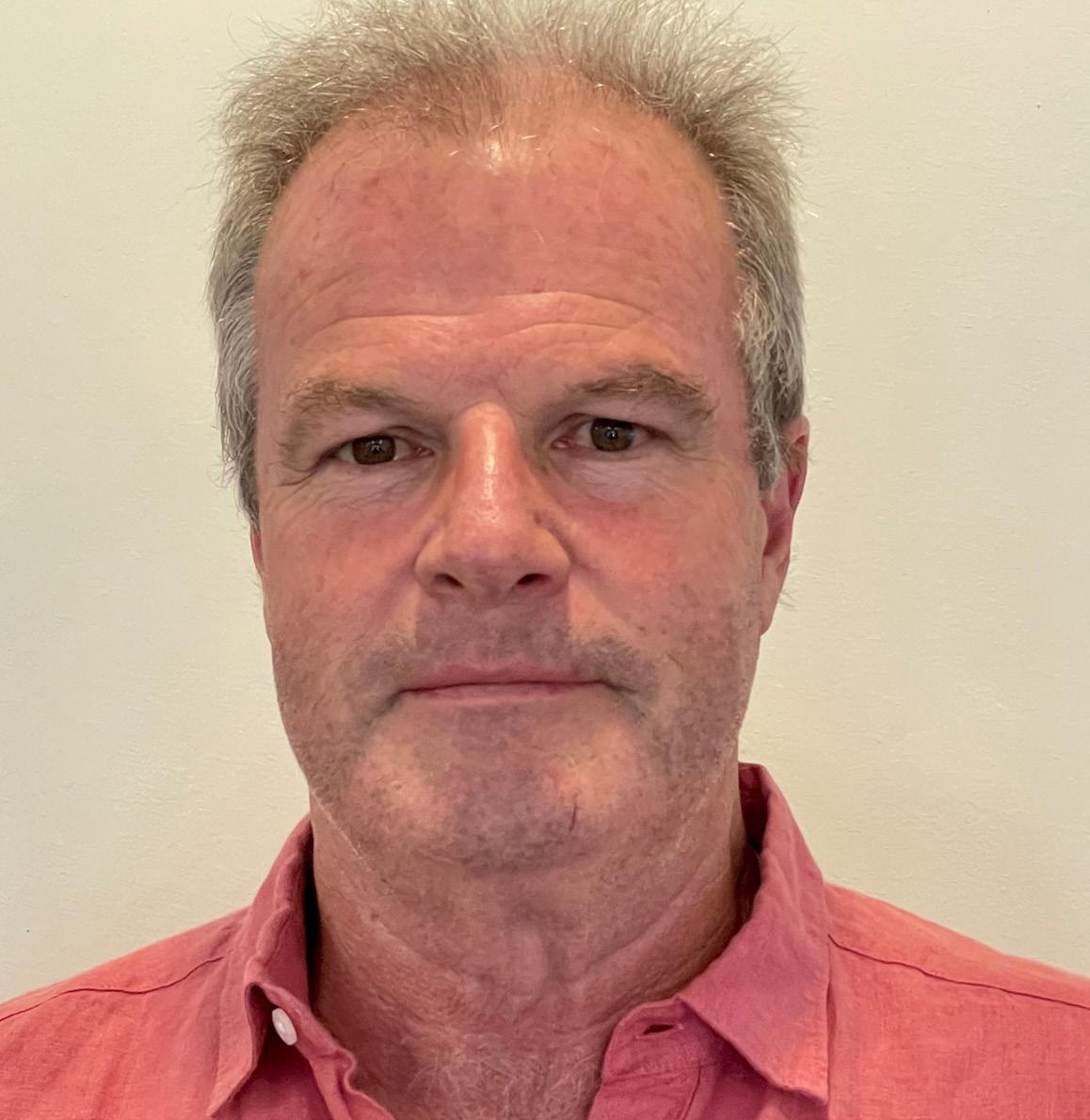
forging plant where we can forge anywhere up to 25kgs. We also have machine shops where we can do all of our own machining – milling, turning, CNC machines, thread roller, welding bays, welding robots, and the assembly side as well.
“We take raw material, usually an aluminium ingot or steel bar, and we take it right through the process. The only thing we outsource is galvanising and heat treatment. We can manufacture a product right from raw basic steel through forging, to drilling, to machining, to getting it galvanised and getting it assembled and utilised as a finished product, all our own design, our own IP, and our own testing.”
BUY LOCAL!
33% unemployment in South Africa is universally cited as unacceptable. Hindle believes buying local is the key to solving this problem. This means general public choosing local products and services, businesses partnering with other local companies to localise value chains, and government supporting local procurement policies.
//Last year, in the wake of the pandemic, as all industries struggled against the backdrop of a weak South African economy, insight from Pan-African Investment and Research Services suggested that just a 10% increase in manufacturing investment in South Africa could help to achieve a GDP contribution increase of 13%. A 9% increase in fiscal revenue and an 8% increase in employment creation could also be achieved.
Currently, manufacturing accounts for between 10-15% of GDP in South Africa. This critical sector is globally accepted as a driver and supporter of economic growth, and onshoring capability in SA has long been a government target.
But it’s not easy. Manufacturers in the East are cheap, fast, and quality. Setting up a manufacturing operation
in SA is capital intensive, and a welldocumented skills shortage is growing.
Thankfully, there are some that realise the potential in Africa’s most advanced and industrialised economy. In an industry plagued with inefficiency and challenge, McWade Productions – leading manufacturer of electrical transmission components - remains optimistic. Approaching it’s sixth decade of operation, the privately-held Gauteng headquartered business has been manufacturing locally since the 60s and knows about the benefits.
“We pride ourselves on local manufacture and design. We are 100% locally owned company and made up of 100% IP,” says Director, Marc Hindle.
“We have our own aluminium foundry and we cast all of our own aluminium components. At the Nigel factory, we have a steel
“For me, the only way for this country to grow is if we employ people,” he says. “The best way to employ people is buying locally. That means we must have products that are competitive, at the right price, right quality, and made to world-class standards. That is why we have chosen the path we have. It has certainly been our focus – we don’t want to be briefcase salesmen,
84 / www.enterprise-africa.net
Marc Hindle, Director
// FOR ME, THE ONLY WAY FOR THIS COUNTRY TO GROW IS IF WE EMPLOY PEOPLE. THE BEST WAY TO EMPLOY PEOPLE IS BUYING LOCALLY //
picking up agencies around the world. We try and make as much as we can and we are always searching for local suppliers wherever possible.”
This methodology goes back through the company’s history to it’s initial founding, when it started out as a small maker of electrical substation on claims, sold to Eskom. As the state power company grew, McWade grew. It’s reliability and quality were in-demand from the utility as it increased coverage across South Africa. Acquisition and diversification helped to fuel expansion, and the company now offers almost every product required to move electrical capacity from generating asset to regional substation.
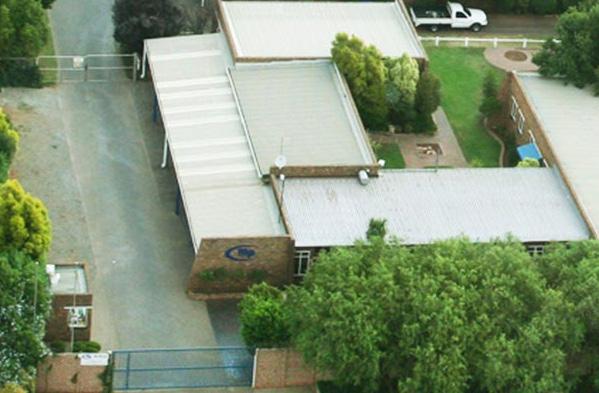
“We work up to 765kV, right at the top end on substations and transmission lines, down to 11kV – but we don’t do household connections,”
says Hindle, an industry veteran, with McWade for more than 30 years.
“We tick a lot of boxes for the country. We make everything. We are a Level 1 BEE company. we are ISO 9001 accredited and we believe we represent a lot of what this country needs,” he adds.
And buying local is now more attractive from a cost perspective. The global logistics crisis that came as a result of China’s close-down around the pandemic wreaked havoc across the business environment, and many that were reliant on the East for imports were choked.
“A lot of those have come back to the local market and we are starting to manufacture goods that use to be imported. We struggled to meet imported prices but our customers don’t have to carry as
much stock. They can order smaller batches from us, and our quality is just as good or better,” says Hindle.
Shipping containers from China is no longer a straightforward exercise – especially when transporting critical infrastructure components like those produced in Gauteng by McWade. The costs and schedules have increased by more than 100%, and sometimes are triple that of 2019. Alongside the Rand being decimated in foreign currency markets, importing is less appealing. “Customers are starting to send more and more products our way, outside of electrical, and that is exciting,” says Hindle.
DIVERSIFICATION
Currently, the McWade Productions range includes high-voltage substation interconnecting clamps (up to 765kV),
MCWADE PRODUCTIONS www.enterprise-africa.net / 85
INDUSTRY FOCUS: MANUFACTURING
insulators, disconnectors/isolators, compression tooling, transmission and distribution line hardware, and more. This equipment allows for the reliable and, most importantly, safe transmission of electrical current from generating assets to
locations around the country. As the country ramps up its plans for energy overhaul and improvement, this is an area that will produce significant opportunity in the future. McWade is just one of a small group that can provide these products locally.
Alongside its strong range comes a service portfolio including in-house design, documentation and technical back-up, local and international sourcing of specialised equipment to suit customer requirements, source and supply of full packages for substations and line projects, design and consulting services to plan and recommend the most suitable equipment, and connections and installation procedures.
A team of 230 local people deliver this comprehensive offering from dual sites in Olifantsfontein, and
a third factory in Nigel. Associated companies Idube Electrical, Trugrid, and Zodiac Engineering provide related services leaving no stone unturned in the transmission and distribution space. Products are in action in South Africa, southern Africa, and various international markets.
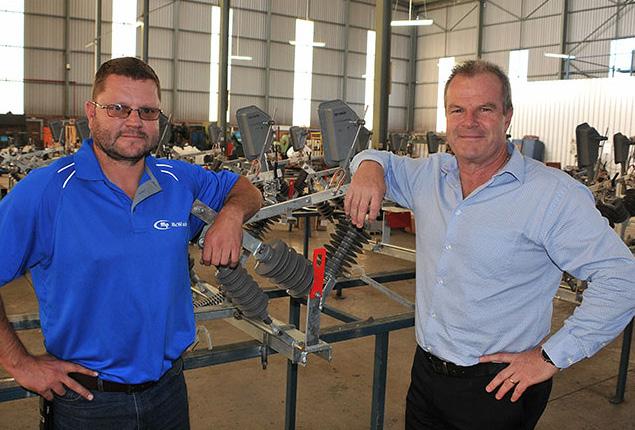
The company’s vast facilities and local expertise have allowed for diversification, and this is where Hindle sees further growth opportunities.
“One of the spins offs of the Eskom market dropping is that we have started picking up a lot of other work in sectors that are not electrical because we have a foundry and machining shop,” he explains. “Some railway work, some food processing companies, and general engineering jobs, which will allow the foundry to not
86 / www.enterprise-africa.net
// WE HAVE STARTED PICKING UP A LOT OF OTHER WORK IN SECTORS THAT ARE NOT ELECTRICAL BECAUSE WE HAVE A FOUNDRY AND MACHINING SHOP //
be totally reliant on electrical products. That makes the company more robust against downturns. Four years ago, that side of our business accounted for less than 2% of our turnover. Today, it accounts for close to 20%.”
McWade has hired a sales team to seek out opportunities for the foundry and forge away from the electrical industry, with the goal of flattening peaks and troughs in demand and keeping the plant busy at all times. “There are only two forging shops in the country that can forge up to 25kgs. It’s small runs, niche products, and no importing from overseas,” highlights Hindle.
This additional workflow will also bring costs down internally in the company’s core sector. Here, Hindle is looking to localise a few small components that remain unmade
in Africa – at the request of clients who also believe in the vision of a truly South African value chain.
“As we become the best forging and foundry business, we get cheaper costs out of it.
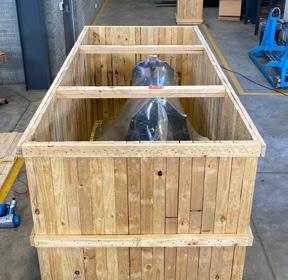
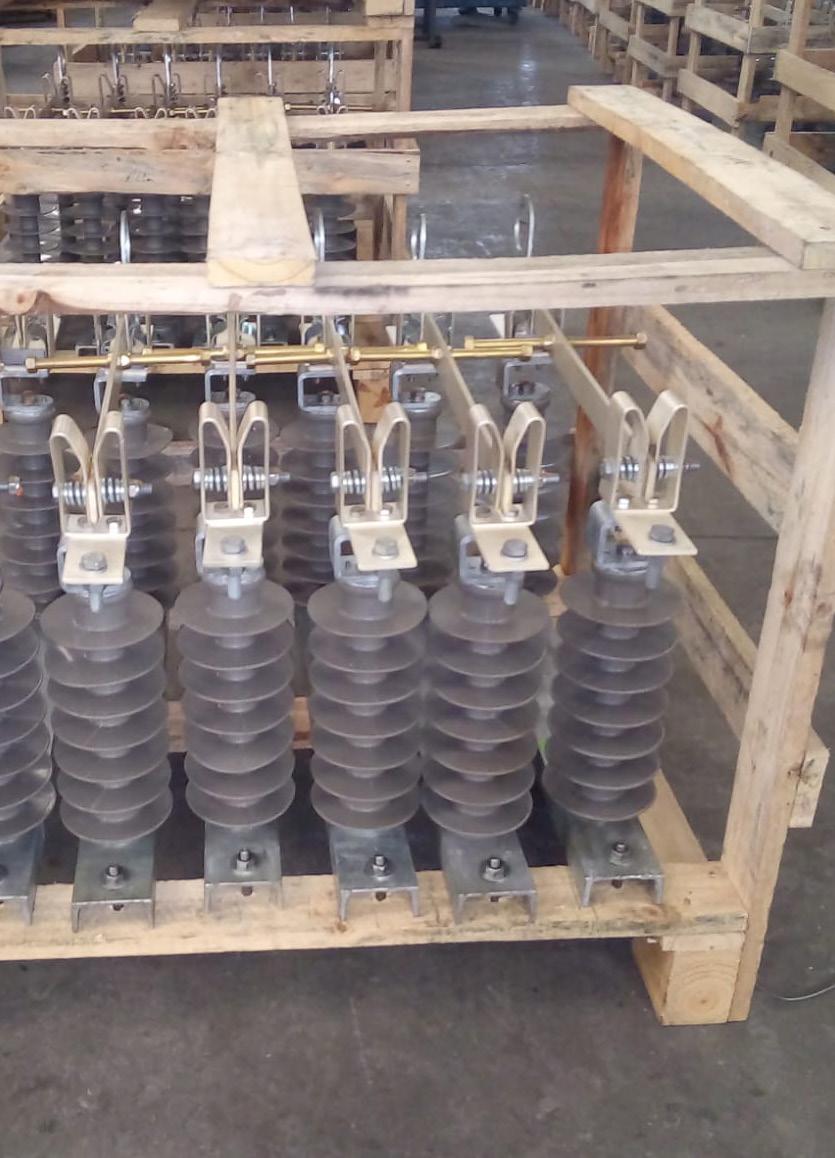
There are some products that are monopolised by certain companies, and we have had clients ask us to bring something else to the market. Obviously funding is an issue, being privatelyowned without a big brother backer. There are two product ranges that we would like to bring to the market in the next two years, which would mean new plant and equipment and they are electrical products to help us increase our basket size. We also want to try and extend our footprint in products like disconnect switches which we sell throughout Africa and into the Middle East. We import a small


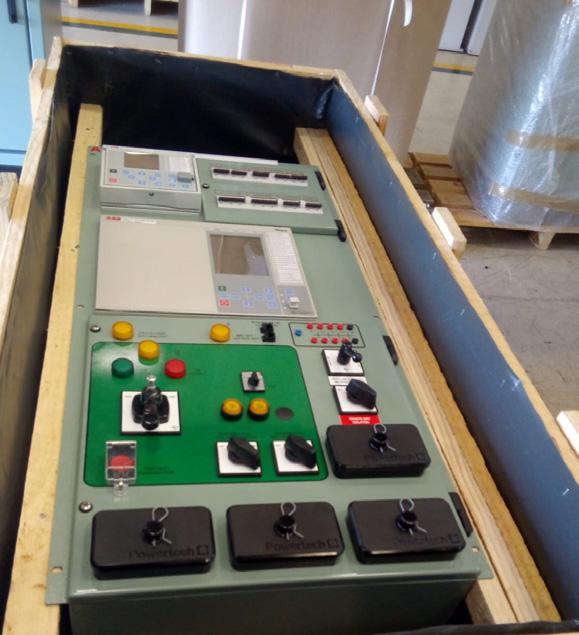
component for those, and we believe we can make that locally to help us be more competitive. We can then take disconnect switches around the world.”
Dual expansion through these obvious strategies will help McWade Productions to achieve another goal hampered by Covid – consolidation of its bases. “The next phase in our business is to integrate all of our plants into one factory if possible, or into at most two. We are currently over three properties and too spread out. We want to increase efficiency and streamline processes,” confirms Hindle.
INDUSTRY FOR GROWTH
Well-documented challenges in South Africa’s power industry are not major hurdles for McWade, according to Hindle. After 2019, when President Ramaphosa began the splitting of
Delreece Crating, Packaging and Procurement Specialists’ core business model is centred around the manufacturing and supply of cost-efficient eco-friendly crating and packaging products of the highest quality. We provide cost-effective procurement services and are able to provide these options to a wide range of clients, including those operating in industries with unique supply-chain requirements for local and export purposes.
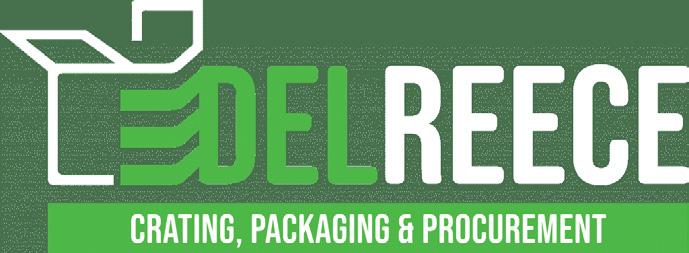
MCWADE PRODUCTIONS www.enterprise-africa.net / 87
WE OFFER OUR CLIENTS A COST-EFFECTIVE SOLUTION TO THEIR CRATING AND PACKAGING REQUIREMENTS.
Proudly supporting McWade Productions YOUR ONE STOP PACKAGING SOLUTION +27(0)12-666-9845 • INFO@DELREECE.CO.ZA
INDUSTRY FOCUS: MANUFACTURING
Eskom into three separate divisions – in generation, transmission, distribution – national-level problems have been confirmed, and these are not in the space where McWade plays.

“Generation is the problem in this country,” states Hindle, Chairperson of the manufacturing arm of The Power Operations & Leadership Association of Southern Africa (POLASA).
“We understand coal generation, but the coal fleet is aging and Medupi and Kusile never got finished. Then there is the reluctance of the government to roll out renewable projects. We simply don’t have enough generating activity. Transmission capacity is where we play – getting what is generated to where it needs to go.”
He adds that coal will remain, that’s guaranteed. But as new generating capacity comes online – and it will come online – those power plants will need to be connected to the grid. And the suggestion right now is that they will not be close to existing generating capacity in the north of the country (more likely in the Western Cape).
“We are quite optimistic,” says Hindle. “We believe we will come right as a country in terms of our generation – it’s just how and when. When it is up and running, there will need to be transition lines and substations. We are in a good place.”
The country’s total generating capacity sits close to 60,000 MW but actual availability was around 55% in 2022, mainly because of regular unplanned breakdowns and
maintenance requirements. Finding the opportunity within the challenge is what separates McWade Productions and Hindle and partner Dessen Naidoo.
“If we had excess capacity and excess lines, we would be out of a job as there would be no growth. At one point, Eskom said it would need 10,000km of line to be built in the coming three years – we have never built that in this country in that period of time. If that does start, we are nicely positioned. We see it is a major inconvenience rather than a total negative. Even if everyone puts solar on their roof, you will still need big power generation to prop up industry and everything else.”
Whatever generation capacity looks like in South Africa’s future – privatised or hybridised between private and government, solar, wind, nuclear – the
88 / www.enterprise-africa.net
need for transmission will only increase, and the subsequent requirement for robust distribution will also surge.

STRONG GROWTH PLATFORM
To prepare for the growth that Hindle is expecting, new equipment is on the agenda. This will, of course, support employment creation rather than replacement.
“We will be changing old mills for new CNC equipment. We installed welding robots recently and that changed the game significantly. It helped us to make the product cheaper, which encouraged more work, which meant hiring more people,” he says.
Membership of POLASA will help to shape the conversation around local content within wider infrastructure projects, and McWade will push for any further investment into the local ecosystem which could provide big associated benefits.
“We come together under one industry body to lobby the Department of Trade, Industry and Competition (DTIC) to try and get a lot of our products designated. It’s about encouraging Eskom to purchase 100% locally manufactured goods. We try really want locally manufactured products into the system. That goes all the way down the chain – materials have to be purchased locally, and everything in between raw material and finished product must be local.”
However, just being local is not enough to create long-term sustainable growth. There must be an underlying element of quality, and McWade Productions has been serving this up for decades.
“Our reputation for quality service is what has made us as a company,” admits Hindle. “A customer can arrive and ask for product in a hurry. If we don’t have them, we will cast and
machine them from scratch while they sit and have a coffee. That doesn’t happen elsewhere. We are hands on and very close to our customers.”
Relationships like this are nurtured over years, and simply cannot be created in the same way with distant suppliers. Working with McWade Productions is a true partnership arrangement and one in which you can be sure of an unbending dedication to South Africa’s manufacturing sector.
“A lot of our opposition don’t manufacture everything – they outsource a lot. We have that capability to design a product from nothing and deliver it finished – we are a one-stop, homegrown shop,” concludes Hindle.
MCWADE PRODUCTIONS www.enterprise-africa.net / 89
MCWADEPRODUCTIONS.CO.ZA
XENIA PHARMACEUTICAL
Trustworthy, Superior Quality, Affordable - Fuelling a Healthy Future in Africa
PRODUCTION: Xenia Pharmaceutical
Pioneering the quest to be Southern Africa’s foremost provider of livestock remedies, Xenia Pharmaceutical continues to cement its formidable history with a fervour for exponential growth, firmly rooted in robust, dependable collaborations. Managing Director Johan Botha gives Enterprise Africa a glimpse into the evolving marketplace and how this transformation is steering Xenia Pharma’s development.
Southern Africa’s veterinary medicine sector serves as a pivotal contributor to the domestic economy and holds significant importance to crucial industries, notably the agriculture and retail sectors. Unprecedented growth in the pet industry, coupled with robust expansion in the agriculture sphere, is spearheading technological advancement in the agri-pharma landscape. With
overseas pharmaceutical imports becoming increasingly costintensive and complicated, local South African enterprises are met with promising prospects.
The Covid-19 pandemic saw a significant uptick in pet ownership due to people staying at home, boosting the pet care market’s worth to billions of Rands and setting it on a trajectory of continued growth. Simultaneously, the importance of

preserving food security highlighted the crucial role of veterinary care.
A dedicated cohort of veterinary pharmaceutical manufacturers, with Xenia Pharma at the helm, has been instrumental in producing safe, effective, and affordable livestock remedies for the Southern African market. Based in Centurion, Xenia Pharma recognizes the demand for growth in market expectations. The company has heavily invested in
90 / www.enterprise-africa.net
//
 Johan Botha, Managing Director
Johan Botha, Managing Director
INDUSTRY FOCUS: MANUFACTURING
exclusively, avoiding direct sales under the company name.
In uncertain economic times, agriculture flourishes. This phenomenon has been particularly apparent throughout the Covid-19 period, with the agricultural and farming sector demonstrating impressive resilience and growth.
THE PET HEALTH REVOLUTION
technology, human resources, and infrastructure to expand its operations, fulfilling orders for over 40 countries.
“Xenia Pharma commands a considerable presence in the industry, exporting to a significant number of EU member states. Despite this, most of our products are widely available in the domestic market, with availability in Coops, veterinary surgeries, pet shops, and select retailers,” shares MD Johan Botha.
Xenia Pharma specializes in contract manufacturing for domestic and international clientele
Established in 2006, Xenia Pharma has witnessed the industry’s rapid evolution. Today’s pet care ecosystem leverages technology for animal health and wellness monitoring, providing a level of care comparable to childcare. There’s also a growing focus on pet nutrition and preventative medical care, attracting significantly higher spending than in previous decades.
“Over the past three years, spending on pet care has skyrocketed,” Botha confirms. “Veterinarians now offer complex cancer treatments for pets – a service unheard of just a few years ago. Xenia Pharma is the top manufacturer of stock remedies for companion animals
and the equine industry, and we have expanded rapidly to accommodate this burgeoning demand.”
Xenia Pharma’s certified facility can cater to a wide array of needs, ranging from shampoo, feed additives, antibiotics, to ectoparasiticides.
“Manufacturers of veterinary medicines are now compelled to elevate their standards,” concedes Botha. “As technology evolves in the EU or USA, customers aspire to access similar remedies locally, pushing producers to meet these heightened expectations.

“We see pet supplement regulation reaching new heights,” Botha explains. “Quality control for pet supplements is on par with human supplements regarding food hygiene certifications. In fact, pet supplements are more regulated than those for humans in South Africa.”
UNLOCKING AFRICAN GROWTH
Despite its origins in Gauteng, Xenia Pharma’s reputation has garnered international recognition. Botha anticipates substantial growth in
92 / www.enterprise-africa.net
//XENIA PHARMA COMMANDS A CONSIDERABLE PRESENCE IN THE INDUSTRY, EXPORTING TO A SIGNIFICANT NUMBER OF EU MEMBER STATES //
farming across Africa, especially largescale farming, which he believes will unlock considerable opportunities for those acquainted with the region’s unique conditions.
As global imports become increasingly challenging, local companies will need to step in to ensure the health of these animals. “We see above-average inflationary growth in agriculture, and anticipate Africa becoming more invested in animal health,” says Botha.
The pandemic and global shipping crisis has impacted the import of veterinary medicines, forcing African countries to seek supplies from Europe at a premium. Consequently, Xenia Pharma has found itself more involved in production for the African continent than ever before.
“Our products contain a significant percentage of domestic content, leading to savings in shipping costs.

We have a high-volume requirement for certain ingredients, which can volumetrically be large, and include a hazardous element that escalates shipping costs,” Botha explains.
ENSURING SUPPLY CHAIN EXCELLENCE
Delivering top-tier animal pharma products is an intricate process involving extensive scientific, technological, manufacturing, sales and marketing expertise, and relationship management. Simultaneously, the supply chain necessitates a deep understanding of the landscape and rigorous quality assurance. Xenia Pharma meticulously vets potential partners to minimize risks.

“Our key suppliers are those providing raw materials. We constantly seek reliable raw material suppliers. We value our relationships with suppliers, recognizing their critical role in ensuring
product perfection,” Botha emphasizes. Due to its unwavering commitment to quality, rigorous scrutiny of processes, and over 20 years of relationship building, Xenia Pharma has become the most highly certified manufacturer of stock remedies in Southern Africa. Well-prepared to embrace the expected growth throughout the rest of the decade, Xenia Pharmaceuticals is thriving amidst the increasing importance of livestock agriculture and the burgeoning pet care market. As the industry is set to face more challenges in the near future, partnering with the best is essential, and Xenia Pharma is always ready to assist.
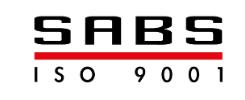
XENIA PHARMACEUTICAL www.enterprise-africa.net / 93
WWW.XENIA.CO.ZA INDUSTRY LEADING PRIVATE CONTRACT
jessica@brunational.co.za 011 609 4066 www.brunational-manufacturing.co.za Skincare Haircare Detergents Bath Products Perfumed Products Salon Quality Products
AND WHITE LABEL MANUFACTURERS
EXHIBITION CALENDAR
KEY UPCOMING EVENTS ACROSS THE REGION
Important events and exhibitions taking place across sub-Saharan Africa, giving brands a platform to tell their story.
JUN 28
MINE-ENTRA
JUN 28-30 | BULAWAYO, ZIMBABWE
Mine Entra is a mining, engineering and transport expo which offers a unique chance to spotlight your productivity solutions and efficient services to an interested and captive audience.

The exhibition showcases the leading technologies and solutions for the mining industry today. The conferences that run alongside the expo attract the nation’s policy makers, captains of the mining industry, as well as other stakeholders as they deliberate on the pertinent issues surrounding mining and its mutually exclusive industries.
JUN 28
ZAMBIA INTERNATIONAL TRADE FAIR
JUN-JUL 28-4 | NDOLA
Zambia International Trade Fair (ZITF) is an Industrial, Commercial and Agricultural exhibition. Through its long experience and respected status, ZITF has been contributing to the consolidation of the economic and cooperation ties between Zambia and the rest of the world. This has been done with and through collaboration with countries that participate in the annual Zambia International Trade Fair.
Our Mission Statement:
To be a premier forum which promotes trade and investment as well as provide a platform for both Local and International organisations to showcase their products and services with a view to creating strategic business linkages for wealth creation.
JUL 5
KENYA INTERNATIONAL TRADE EXHIBITION 2023
JUL
5-7 | NAIROBI
The largest international trade exhibition in Africa for multisector products, equipment and machinery will take place at Sarit Expo Centre, Nairobi, Kenya from 5 - 7 July 2023 with record breaking numbers. Exhibitors and trade visitors are said to increase by 27% and 24% respectively at the 24th edition of the Kenya International Trade Exhibition (KITE). The exhibition has grown in stature from its inception 26 years ago, as the key networking and sourcing platform for the industries. As the largest event of its kind, it ensures direct access to over 150 exhibitors from 30 countries and more than 12,000 trade visitors.
JUN 28
JUN
MINE-ENTRA BULAWAYO, ZIMBABWE
JUN 28-30
ZAMBIA INTERNATIONAL TRADE FAIR
NDOLA | JUN-JUL 28-4
JUL 1
TANZANIA INTERNATIONAL TRADE FAIR
DAR ES SALAAM | JUL 1-5
JUL 5
KENYA INTERNATIONAL TRADE EXHIBITION – KITE

NAIROBI | JULY 5-7
JUL 11
COMPEXPO – MANUFACTURING EXHIBITION – KENYA
NAIROBI | JUL 11-13
ACCESS MBA – NAIROBI
NAIROBI, KENYA | AUG 8
PHARMATECH & HEALTH
EAST AFRICA
TANZANIA | AUG 24-26
UGANDA TRADE EXPO
KAMPALA | AUG 26-29

94 / www.enterprise-africa.net
28
AUG 8 AUG 24
AUG 26
F
R
EA
I
NCREA
SE FI
CIAL L
You don’t need any data to access or use Paymenow.

ENABLES RESPONSIBLE, SAFE AND SEC URE ACCESS
Bank grade security means your money is safe, and will only be paid into the bank account as per payroll.
*W hen you are on GOLD STATUS

DATA FREE
RNED W AGE ACCESS
Paymenow is not a loan, we offer safe and secure access to money you’ve already earned, with no interest or repayments required. REE TO EM PLOYE
N -APP SAVINGS FEATURE OFFERS FINANCIAL PEACE OF M IND
There is no cost to the employer to partner with Paymenow.
Deposit and save money straight from the app into an interest-bearing Allan Gray money market fund.
NAN
ITE
Learn more: www.paymenow.app U
I
RACY THROUGH IN -APP FINANCIAL ED
CATION M ODULES
FREE CREDIT SCORE TO IM PROVE FINANCIAL HEALTH
Our in-app financial education modules offer tips on how to manage you money better to boost your financial wellness.
Our Financial Health Check feature helps users understand their financial situation and offer tips on how to improve it.
VOUCHERS FREE OF FEES
You can buy grocery, airtime, clothing, electricity, and medical vouchers free of fees*, or send these to loved ones.
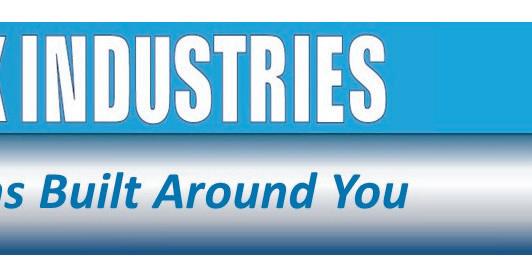
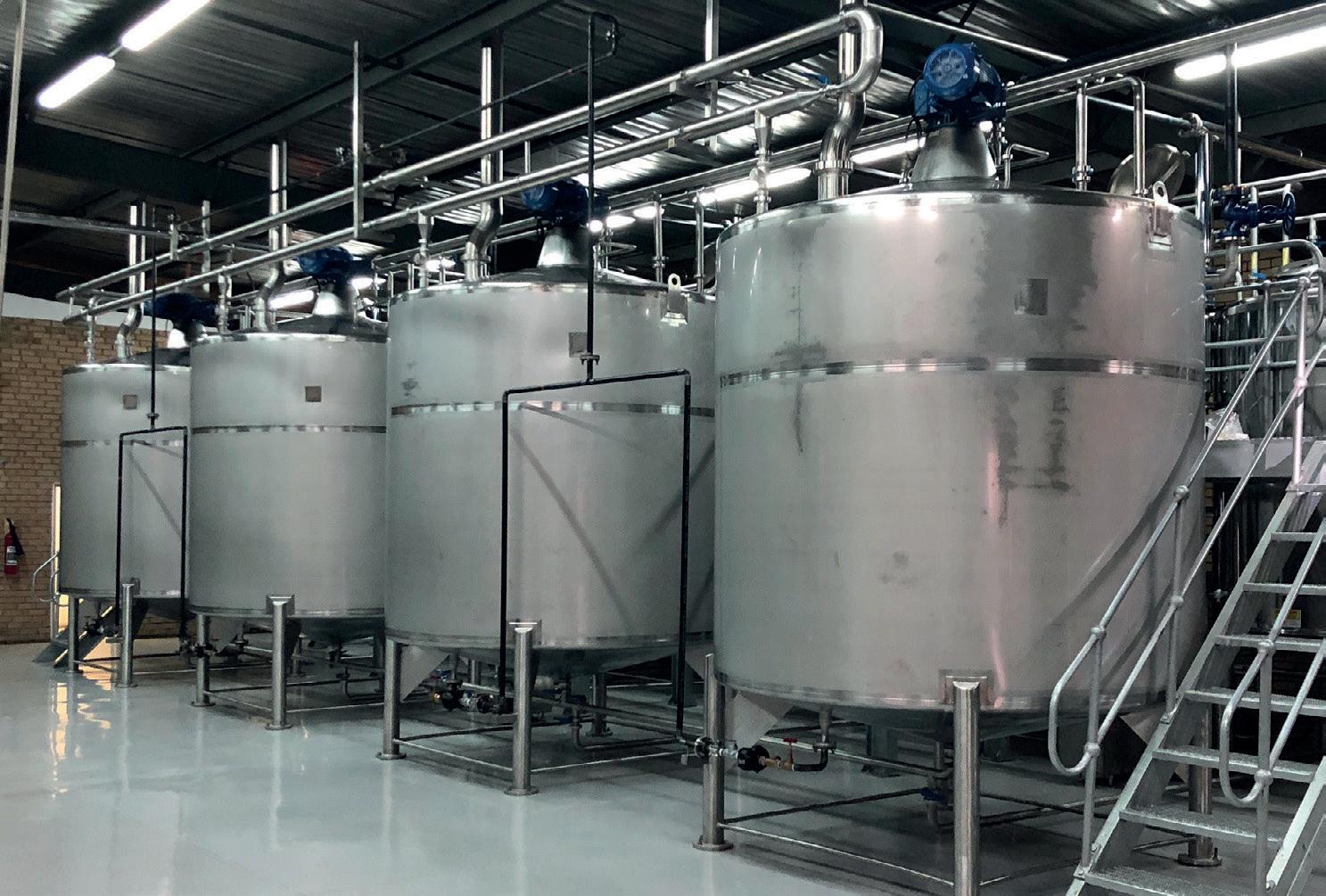
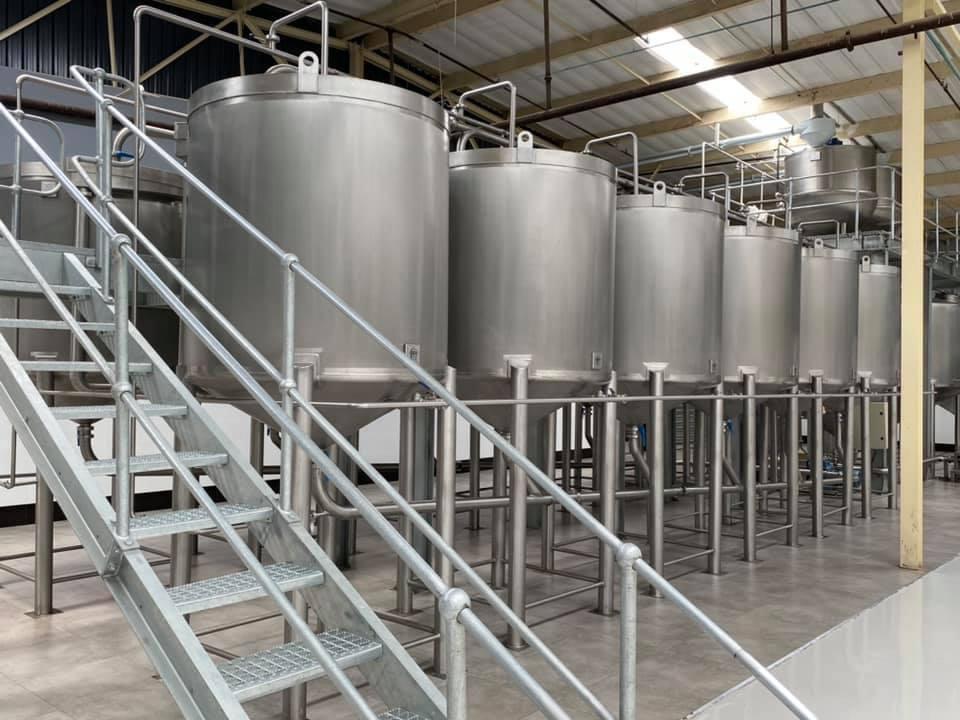
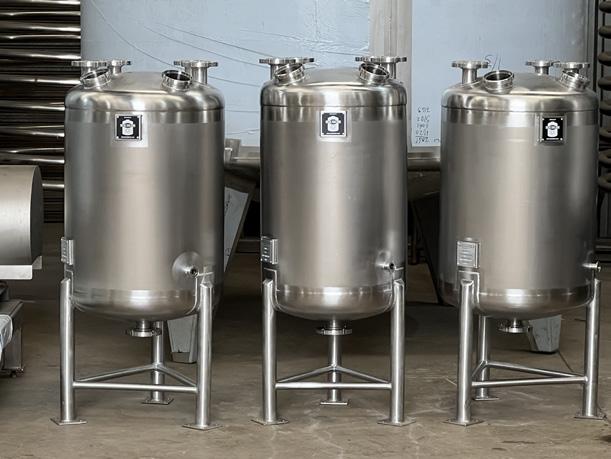
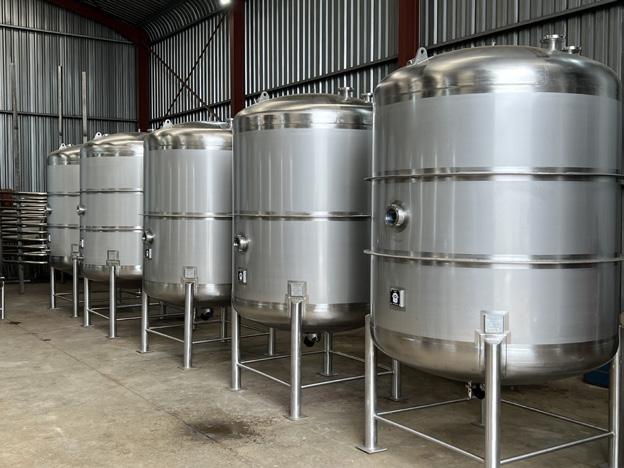
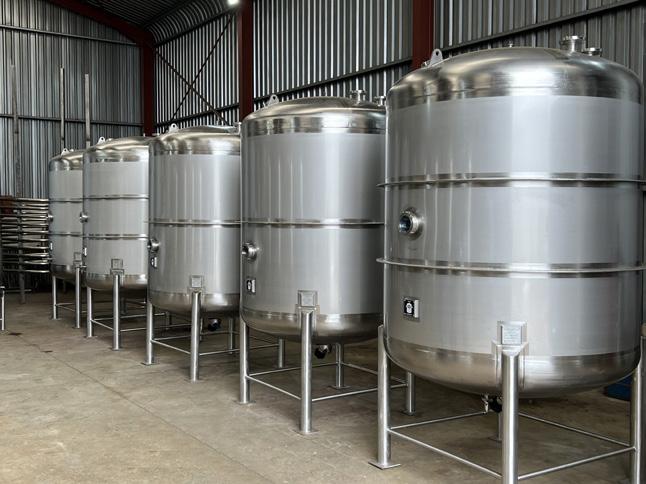




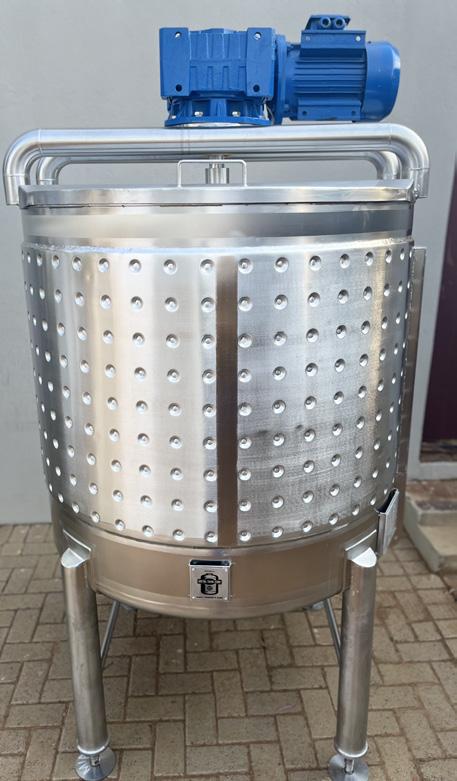

Metal Tank Industries is a specialized Fabricator of Stainless Steel Vessels and Turnkey Process Solutions throughout Africa We are equipped with the latest production machinery and strive to produce locally quality built products delivered on time. Drop us an email sales@metaltank.com or visit ww FO R A L L Y O U R S TA I N LES S STEE L P R O C ES S P L AN T R EQUI R EME N T S












 PRODUCTION: Eleanor Sarbutt-King
PRODUCTION: Eleanor Sarbutt-King









 Oliver Westmacott , President and COO Security Services - Middle East and Africa
Oliver Westmacott , President and COO Security Services - Middle East and Africa









 PRODUCTION: James Davey
PRODUCTION: James Davey








 PRODUCTION: James Davey
PRODUCTION: James Davey
















 PRODUCTION: Kim Berrystone
PRODUCTION: Kim Berrystone
 Sooren Ramdenee, CEO
Sooren Ramdenee, CEO





 PRODUCTION: Jamie Waters
PRODUCTION: Jamie Waters






 Nkosinathi Myataza, Regional GM Airports Company South Africa (ACSA)
Nkosinathi Myataza, Regional GM Airports Company South Africa (ACSA)







 Lidia de Olim Folli, CEO
Lidia de Olim Folli, CEO







 PRODUCTION: Jamie Waters
PRODUCTION: Jamie Waters
 Alex Rutherford, Founder and Owner
Alex Rutherford, Founder and Owner











 PRODUCTION: Kim Berrystone
PRODUCTION: Kim Berrystone








 PRODUCTION: James Davey
PRODUCTION: James Davey













 Johan Botha, Managing Director
Johan Botha, Managing Director















































































































